Session 2009/2010
First Report
COMMITTEE FOR EMPLOYMENT AND LEARNING
Report on the
Employment Bill
Together with the Minutes of Proceedings of the committee
relating to the report and the minutes of evidence
Ordered by the Committee for Employment and Learning to be printed 21 October 2009
Report: NIA 20/09/10R (Committee for Employment and Learning)
This document is available in a range of alternative formats.
For more information please contact the
Northern Ireland Assembly, Printed Paper Office,
Parliament Buildings, Stormont, Belfast, BT4 3XX
Tel: 028 9052 1078
Membership and Powers
The Committee for Employment and Learning is a Statutory Departmental Committee of the Northern Ireland Assembly established in accordance with paragraphs 8 and 9 of Strand One of the Belfast Agreement and under Standing Order 48 of the Northern Ireland Assembly. The Committee has a scrutiny, policy development and consultation role with respect to the Department for Employment and Learning and has a role in the initiation of legislation.
The Committee has power to:
- consider and advise on Departmental budgets and annual plans in the context of the overall budget allocation;
- approve relevant secondary legislation and take the Committee stage of relevant primary legislation;
- call for persons and papers;
- initiate inquiries and make reports; and
- consider and advise on matters brought to the Committee by the Minister for Employment and Learning.
The Committee is appointed at the start of every Assembly, and has power to send for persons and papers and records that are relevant to its inquiries.
The Committee has 11 members, including a Chairperson and Deputy Chairperson, and a quorum of 5. The membership of the Committee since 9 May 2007 has been as follows:
Ms Sue Ramsey (Chairperson)
Mr Thomas Buchanan 1 5 (Deputy Chairperson)
Mr Paul Butler Mr Trevor Clarke 3 6
Rev Dr Robert Coulter 2 Mr David Hilditch 3
Mr William Irwin 3 Ms Anna Lo
Mr David McClarty Mrs Claire McGill
Mr Pat Ramsey 4
Mr Alastair Ross replaced Mr Jim Wells on 29 May 2007.
1 Mr Robin Newton replaced Mr Jimmy Spratt as Deputy Chairperson on 10th June 2008.
2 Rev Dr Robert Coulter replaced Mr Basil McCrea on 15 September 2008.
3 Mr Alex Easton, Mr David Hilditch and Mr William Irwin replaced Mr Nelson McCausland, Mr Alastair Ross and Mr Jimmy Spratt on 15 September 2008.
4 Mr Pat Ramsey replaced Mr Alex Attwood on 29 June 2009.
5 Mr Thomas Buchanan replaced Mr Robin Newton as Deputy Chairperson on 4th July 2009.
6 Mr Trevor Clarke replaced Mr Alex Easton on 14th September 2009.
Table of Contents
List of abbreviations used in the report
Report
Executive Summary
Clause by Clause Scrutiny of the Bill
Proposed Amendments to the Bill
Appendix 1:
Minutes of Proceedings relating to the report
Appendix 2:
Minutes of Evidence
Appendix 3:
Employment Bill (as introduced)
Appendix 4:
Research Papers
Appendix 5:
Correspondence
Appendix 6:
Additional Papers
List of Abbreviations used in the Report
‘The Bill’ The Employment Bill (NIA 09/08)
‘The Committee’ Committee for Employment and Learning
‘The Department’ Department for Employment and Learning
‘The Executive’ Northern Ireland Executive
‘The Minister’ Minister for Employment and Learning
‘ASLEF’ Association Society of Locomotive Engineers and Firemen
‘CEF’ Construction Employers Federation
‘CITB’ Construction Industry Training Board
‘GB’ Great Britain
‘HM’ Her Majesty’s
‘LRA’ Labour Relations Agency
‘NI’ Northern Ireland
‘NICICTU’ Northern Ireland Committee of the Irish Congress of Trade Unions
‘UK’ United Kingdom
Executive Summary
1. The purpose of the Employment Bill is to make provision regarding the enforcement of legislation with regard to employment agencies and the minimum wage; additionally to make provision with respect to the membership of, and representation before, the Industrial Court; and for issues flowing from these provisions.
2. In the pre-introduction phase of discussion the Committee for Employment and Learning (“the Committee") voiced considerable concern regarding proposals around the rights of trade unions to expel members who have memberships or affiliations with political parties/groups whose views are not in tune with those of the trade union. The Minister for Employment and Learning (“the Minister") subsequently decided not to include the proposal in the Employment Bill as drafted, however, the Committee is aware that this issue must be resolved as current law is now in contravention of a European Court of Human Rights ruling and will have to be amended at some point in the future. The Committee believes that this issue warrants considerable debate on the floor of the Assembly and will play a full part in that debate.
3. The other issues raised by the Committee related to the amendments to the Employment Bill that have been proposed by the Minister. The Committee had initially questioned why changes were being made regarding the Construction Industry Training Board (CITB) when that body is subject to the outworkings of a review which recommends its restructuring and merger with the Sector Skills Council for the construction Industry, ConstructionSkills. However, the Committee has been satisfied by the Department’s reassurances that the legislation to restructure and merge the Board is a considerable way off and this change is needed presently to bring the consultation process regarding appointments to the CITB and the appointments themselves into line with current practice.
4. The Committee has outstanding correspondence from the Construction Employers Federation (CEF) and the Northern Ireland Committee of the Irish Congress of trade Unions (NICICTU) regarding changes to the consultation regarding appointment to the boards of the Labour Relations Agency (LRA) and the CITB and the process of appointment itself. The Committee has reserved the right to modify its viewpoint on the related amendments subsequent to receiving this correspondence.
5. The Committee has indicated its satisfaction with the Department’s public consultation process and its engagement with the Committee, both prior to and during, the introduction of the Employment Bill. The Committee is grateful to the Minister and his Department for their willingness to discuss issues with the Committee and take the Committee’s views on board.
6. The Committee has signalled its agreement of the clauses and schedules of the Employment Bill as drafted. With regard to the proposed amendments to the Employment Bill which the Minister will bring forward at the Consideration Stage, the Committee has provisionally signalled its support for these with the caveats that they are supported by the Executive and further information that might influence the Committee’s view is not forthcoming from the CEF and NICICTU.
Introduction
7. The Employment Bill (NIA 09/08) (‘the Bill’) was introduced to the Assembly with its First reading on 22nd June 2009. The Bill reached its Second Stage on 30th June 2009 and was referred to the Committee for consideration in accordance with Standing Order 33(1) on 1st July 2009. Upon introduction of the Bill to the Assembly the Minister made the following statement under Section 9 of the Northern Ireland Act 1998:
8. “In my view the Employment Bill would be within the legislative competence of the Northern Ireland Assembly"
9. Departmental considerations and consultation
(1) Policy objectives - The Department is responsible for regulation of the private recruitment sector in Northern Ireland under the Employment (Miscellaneous Provisions) (NI) Order 1981 and the Conduct of Employment Agencies and Employment Businesses Regulations (NI) 2005. The Department has the power to enter and inspect locally-based employment agencies and employment businesses, and employs two employment agency inspectors who inspect employment agencies and investigate complaints. Non-compliant employment agencies can be prosecuted by the Department in a Magistrates’ Court, or the Department can apply to an Industrial Tribunal to prohibit an individual from operating or being concerned with the operation of an employment agency for up to ten years. The Department considers there is a need to enhance its powers of investigation and prosecution of certain very serious offences under employment agency law.
The existing legislation relating to the Industrial Court’s appointments process is enshrined in primary legislation and the Department regards it as too restrictive. Additionally, there is currently no power to remove or suspend members of the Industrial Court. The Department therefore considers it necessary to introduce more flexible regulation-making powers in relation to Industrial Court appointments via this Employment Bill.
Article 92(4) of the Industrial Relations (NI) Order 1992 contains a restriction which prohibits legal representation within seven of the Industrial Court’s eight jurisdictions. The rationale behind the restriction was to limit the formality of the Court and to encourage consensus-building regarding the Court’s role in arbitrating in disputes and resolving complaints about the disclosure of information for the purposes of collective bargaining. The Department subsequently received legal advice that failure to allow legal representation could lead to a challenge under Article 6 of the European Convention on Human Rights (Right to a fair trial). Through the Bill the Department proposes to amend Article 92(4) to enable those parties who so choose, to engage legal representation with the exception of one jurisdiction related to the provision of voluntary arbitration in relation to industrial disputes.
(2) Consultation - In June 2008 the Department sought views on policy proposals to enhance its powers regarding employment agency enforcement and to extend legal representation in relation to Industrial Court jurisdictions. Consultation ran for 17 weeks and closed on 30 September 2008. Responses to the public consultation were presented to the Committee in a briefing session on 26th November 2008. The Committee responded on 11th December 2008 that it was content with the proposals other than that regarding trade unions membership. This issue has since been removed from the Bill. The Department received 13 responses to the consultation on employment agency enforcement, 8 making substantive comments. All these respondents were supportive of the proposals. The Industrial Court provisions, relating to new regulation-making powers and the removal of the restriction that requires the Department to provide the Court case manager, were previously consulted upon as part of the Public Authorities Reform Order from 24 January to 20 April 2007. Three responses were received with the Industrial Court welcoming the provision of regulation-making powers. The proposed change to consultation rights in relation to the appointment of the Certification Officer is as a result of discussions between the Department and the LRA on the need for clarification on this matter. The consultation also included a proposal to amend legislation in relation to a trade union’s ability to expel members for reasons relating to political party membership. Following legal advice this proposal has not been included in the Bill.
(3) Options considered by the Department - In the employment agency enforcement consultation, the Department recommended allowing serious breaches of employment agency law to be triable either in the Magistrates’ Court (as at present) or the Crown Court, thereby allowing for unlimited fines; and providing the Department with a power to compel agencies or third parties such as banks to provide financial information about an agency for investigation purposes. These proposals were welcomed by respondents to the consultation. The only other option was to do nothing. However the Department considers that existing penalties in the Magistrates’ Court are ineffective when compared to the money that can be made by unscrupulous employment agencies. With regard to investigation powers, the Department is receiving an increasing number of complaints which require investigation (including a number with a financial aspect and considers it is sensible to have the necessary provisions in place to help ensure adequate investigation of complaints. A legal power to override customer confidentiality in certain very limited circumstances would enable such investigations to proceed more quickly.
A further issue was not included in the consultation but was raised by consultees. This related to effective information-sharing between enforcement agencies. As a result of the consultation, and also following a recommendation in the report published by the GB Vulnerable Workers forum, the Department decided to include in the Bill a provision to allow for the lawful exchange of inspection information between the Department’s employment agency inspectors and Her Majesty’s Revenue and Customs National Minimum Wage compliance officers. The Department considers that some agency workers on low wages are potentially vulnerable to abuse and a power to exchange information with Revenue and Customs would enable investigation of unscrupulous employers to proceed more efficiently and quickly.
Currently the Industrial Relations (NI) Order 1992 does not permit parties appearing before the Industrial Court to be legally represented in seven of the eight Court jurisdictions. The Department received legal advice that this may breach Article 6 of the Human Rights Act i.e. the right to a fair trial. The Department intends extending legal representation to all but one Industrial Court jurisdiction. This reflects the view of the Industrial Court that this jurisdiction, which provides for voluntary arbitration, by its nature, would not benefit from legal representation.
Pre-introduction Committee Scrutiny
10. At its meeting on 26th November 2008, the Committee received a briefing from the Department regarding the proposed content of the Bill and the summary of responses to the public consultations on proposals to amend trade union law and on proposals to make changes to the investigation powers and penalty regime relating to employment agencies and businesses. Considerable discussion took place at the meeting regarding these issues and a response was then sent to the Department outlining the Committee’s views. The Committee expressed its great concern with regard to the proposals to amend trade union law. Members highlighted their belief that restrictions to trade union membership could easily impact negatively on the rights of individual members. The Committee indicated its belief that trade unions have sufficient existing mechanisms in place to deal with a situation where a member of the union is in breach of the union’s rules and regulations because of their membership of, or activities with, a particular political party. The Committee put forward its opinion that there is no need for further powers for unions in this area and such powers would ultimately work against the rights of the individual member. At this stage the Committee signalled its contentment with the other proposed provisions of the Bill.
11. The Bill, on introduction, did not contain the trade union proposals. The Committee commended the Minister on this; however, Members recognise that the EU ruling regarding the ASLEF v UK case means that this issue will have to be addressed in due course.
Second Stage of the Bill
12. The Minister’s opening statement to the Assembly, in moving the Second Stage of the Bill on 30th June 2009, highlighted his Department’s work in seeking to provide an effective regulatory framework for the private recruitment sector, so better protecting vulnerable workers. Additionally, the Minister indicated that the Bill will allow for increased flexibility in making appointments to the Industrial Court, also allowing for legal representation before the Industrial Court.
13. During the debate, the Committee’s Chairperson indicated the Committee’s broad support for the provisions of the Bill. The Chairperson also thanked the Minister for involving the Committee thoroughly in the process of consultation leading up to the Bill being laid and for making the relevant Departmental officials available to Members as and when required to discuss the Bill. The Chairperson continued by commending the Minister and his Department for undertaking extensive and meaningful consultation on the Bill. This consultation included taking into account the Committee’s and other consultees’ view that proposals to amend legislation relating to trade unions’ ability to expel members for their party political affiliations should be excluded from the Bill. The Chairperson thanked the Minister that the proposals did not appear in the final draft of the Bill. However, the Committee notes that the issue will require to be dealt with through legislation at some stage in the future.
Extension of the Committee Stage of the Bill
14. At its meeting on 9th September the Committee discussed seeking a short extension to the Committee Stage of the Bill as a contingency period in the event of unforeseen circumstances. At its meeting on 16th September the Committee agreed a draft Motion to extend the Committee Stage of the Bill to 9th November 2009. The Motion to extend was supported by the Assembly on 5th October 2009.
Committee Public Notice regarding the Bill
15. As is the normal procedure regarding the Committee Stage of a Bill, the Committee issued a Public Notice inviting submissions on the Bill. The Notice appeared in the Belfast Telegraph, Irish News and Newsletter on the week commencing 1st July, with a closing date of 13th August 2009. The Committee acknowledged that the lack of submissions may be a reflection of the thoroughness of the Department’s initial consultations. Members considered that the key stakeholders had already indicted their views during the consultation process.
Committee Stage Scrutiny of the Bill
16. The Committee had before it the Employment Bill (NIA 09/08) and the Explanatory and Financial Memorandum that accompanied the Bill. As the Committee’s Public Notice regarding the Bill received no submissions and Members’ agreement that the Department’s consultation process had been thorough it was agreed by the Committee that it would not be necessary to schedule oral evidence sessions regarding the Bill. The Committee proceeded with its consideration on the basis of the outcome of pre-introduction Committee scrutiny of the proposals to be contained in the Bill and the Bill itself and the associated Explanatory and Financial Memorandum.
Report on the Bill
17. At its meeting on 21st October 2009, the Committee agreed its Report on the Bill and agreed that it should be printed.
Consideration of the Bill
18. The Employment Bill contains provisions in the following areas:
- Amendment to the Employment (Miscellaneous Provisions) (NI) Order 1981 to enhance the Department’s powers to investigate and prosecute serious offences by unscrupulous employment agencies.
- Amendments to the National Minimum Wage Act 1998 and the Employment (Miscellaneous Provisions) (NI) Order 1981 to permit the sharing of inspection information between the Department’s employment agency inspectors and HM Revenue and Customs National Minimum Wage compliance officers.
- Amendment to the Industrial Relations (NI) Order 1992 to provide greater flexibility by replacing current arrangements for Industrial Court appointments with equivalent subordinate legislation provisions and to remove the restriction that the Court’s secretariat functions may only be fulfilled by staff from the Department.
- Amendments to the Industrial Relations (NI) Order 1992 to provide for the Department to consult the LRA about the arrangements for appointing the Certification Officer.
- Amendment to Article 92(4) of the Industrial Relations (NI) Order 1992 to extend legal representation to all but one of the jurisdictions of the Industrial Court.
- Amendment to Articles 67M and 103B of the Employment Rights (NI) Order 1996 to amend incorrect references to jury service legislation.
- Repeal of Article 16 of the Employment Relations (NI) Order 2004. These provisions were introduced by the 2004 Employment Relations Order, but were not commenced, and are no longer required.
19. The Bill has 8 clauses and 2 schedules as follows:
Clauses
Clause 1: Employment agencies: mode of trial and penalties for certain offences
Clause 2: Employment agencies: powers of enforcement
Clause 3: Membership of the Industrial Court
Clause 4: Legal representation before the Industrial Court
Clause 5: Employment agencies and national minimum wage: information
20. Clause 6: Minor and consequential amendments and repeals
Clause 7: Commencement
Clause 8: Short Title
Schedules
Schedule 1: Minor and consequential amendments
Schedule 2: Repeals
Explanation of Clauses and Schedules
21. Clause 1: Employment agencies: mode of trial and penalties for certain offences
This clause amends the Employment (Miscellaneous Provisions) (NI) Order 1981 and will provide for offences under employment agency legislation to be triable either in a Magistrates’ Court or the Crown Court. Currently, the maximum fine awarded by a Magistrates’ Court can be no greater than level five on the standard scale (currently £5,000). Unfortunately, agencies that act unlawfully can make much more than this amount. By allowing more serious cases to be tried in the Crown Court provision will be made for the potential for unlimited fines to be awarded against such agencies.
22. Clause 2: Employment agencies: powers of enforcement
This clause amends the Employment (Miscellaneous Provisions) (NI) Order 1981 and will provide the Department for Employment and Learning with powers to compel agencies and third parties such as banks to provide the Department with financial information about an agency for investigation purposes. Limits will be placed on the circumstances in which this power can be used and it will only be available where an agency is suspected of serious offences under employment agency legislation and is asked for, but does not provide, the necessary financial information. This power can only be used following authorisation by a senior officer of the Department (at least Director-level).
23. Clause 3: Membership of the Industrial Court
This clause amends the Industrial Relations (NI) Order 1992 to replace current arrangements for Industrial Court appointments with equivalent subordinate legislation provisions which will provide greater flexibility in making appointments. The clause also makes a minor change to remove the restriction that the Court’s secretariat functions may only be fulfilled by staff from the Department.
Clause 3 contains the Bill’s one power to make subordinate legislation (apart from the routine power to make a commencement order to bring clause 3 into operation). The regulations made under those powers would be subject to negative resolution in common with the other regulations made under the 1992 Order. The Examiner of Statutory Rules has considered the provision and the Department’s memorandum and has advised the Committee that the level of Assembly scrutiny in relation to regulations made under Article 91A of the 1992 Order (as amended by clause 3) would appear to be appropriate.
24. Clause 4: Legal representation before the Industrial Court
This clause amends Article 92(4) of the Industrial Relations (NI) Order 1992 so enabling parties before the Industrial Court to engage legal representation with the exception of one jurisdiction related to the provision of voluntary arbitration in relation to industrial disputes. This reflects the view of the Industrial Court that voluntary arbitration, by its nature, would not benefit from legal representation. Legal advice states that failure to allow legal representation could lead to a challenge under Article 6 of the European Convention on Human Rights (Right to a fair trial).
25. Clause 5: Employment agencies and national minimum wage: information
This clause amends the National Minimum Wage Act 1998 and the Employment (Miscellaneous Provisions) (NI) Order 1981 to clarify the law relating to information-sharing and allow HM Revenue and Customs National Minimum Wage compliance officers and the Department’s employment agency inspectors to legally share and exchange information discovered by them in the course of exercising their powers. At present the exchange of such information is restricted. The removal of this restriction will, for example, enable employment agency inspectors to report breaches of the National Minimum Wage Act by employment businesses to HM Revenue and Customs.
26. Clause 6: Minor and consequential amendments and repeals
This clause provides that the minor and consequential amendments and repeals set out in the Schedules to the Bill will have effect.
27. Clause 7: Commencement
This clause gives the Department power to bring the membership of the Industrial Court provision of the Bill into operation by commencement order. It also provides that the remaining provisions of the Bill will come into operation on the day after the Act receives Royal Assent.
28. Clause 8: Short Title
This clause cites the title of the Act by which it will be known.
29. Schedule 1: Minor and consequential amendments
This schedule lists the amendments to other legislation required by the Bill.
30. Schedule 2: Repeals
This schedule lists the repeal of parts of other legislation required by the Bill.
Committee meeting 16th September 2009
31. The Committee considered the clauses and schedules of the Bill as drafted. Members provisionally indicated their approval of the Bill subject to further information on the wording of the proposed amendments to the Bill and where they would be inserted. The Committee considered correspondence from the Minister and Department regarding the amendments and agreed to suspend final judgement until more information was available.
Committee meeting 23rd September 2009
32. The Committee received briefing from the Department’s Bill Team on each clause and schedule of the Bill and each of the amendments. The Committee was able to discuss any issues and at this point sought clarification from officials regarding the amendments relating to the appointments to the CITB and the LRA and, in the case of the CITB why this process was being changed at this time prior to the outworkings of the restructuring of the CITB and its merger with ConstructionSkills, the construction industry’s Sector Skills Council. The Bill Team undertook to provide clarification in writing and these issues are discussed more fully below in the Proposed Amendments to the Bill section of this Report.
Clause by Clause Scrutiny of the Bill
33. The Committee began its clause by clause scrutiny of the Bill at its meeting on 16th September 2009 and completed this at its meeting on 23rd September 2009 – see Minutes of Evidence in Appendix 2. The Committee considered the Department’s proposed amendments to the Bill in conjunction with the clause by clause scrutiny and this consideration is dealt with in the next section of this Report.
34. The clauses and schedules of the Bill as drafted were agreed by the Committee without amendments as follows:
Clauses
Clause 1: Employment agencies: mode of trial and penalties for certain offences
35. Agreed: That the Committee agreed to clause 1 as drafted.
Clause 2: Employment agencies: powers of enforcement
36. Agreed: That the Committee agreed to clause 2 as drafted.
Clause 3: Membership of the Industrial Court
37. Agreed: That the Committee agreed to clause 3 as drafted.
Clause 4: Legal representation before the Industrial Court
38. Agreed: That the Committee agreed to clause 4 as drafted.
Clause 5: Employment agencies and national minimum wage: information
39. Agreed: That the Committee agreed to clause 5 as drafted.
Clause 6: Minor and consequential amendments and repeals
40. Agreed: That the Committee agreed to clause 6 as drafted.
Clause 7: Commencement
41. Agreed: That the Committee agreed to clause 7 as drafted.
Clause 8: Short Title
42. Agreed: That the Committee agreed to clause 8 as drafted.
Schedules
Schedule 1: Minor and consequential amendments
43. Agreed: That the Committee agreed to schedule 1 as drafted.
Schedule 2: Repeals
44. Agreed: That the Committee agreed to schedule 2 as drafted.
45. As indicated previously, at its meeting on 23rd September the Committee accepted the Examiner of Statutory Rules advice that the delegated powers outlined in clause 3 provide an adequate level of Assembly control by using Negative Resolution with regard to Industrial Court appointments.
Proposed Amendments to the Bill
46. The Committee received correspondence over the 2009 Summer Recess from the Minister regarding proposed amendments to the Bill. The Committee considered this correspondence at its meeting on 9th September 2009 and began discussing these amendments at its meeting on 16th September. The Committee received a briefing from the Department’s Bill Team on 23rd September 2009 and continued its discussion on the amendments with the Team. The Issues raised by the Committee regarding these discussions is outlined below.
47. The following amendments to the Bill were forwarded to the Committee on 15th September and presented to Members by the Bill Team at the Committee’s meeting on 23rd September. It is the Committee’s understanding that this is the anticipated wording for these proposed amendments when they will be presented by the Minister at the Bill’s Consideration Stage in the Assembly.
48. It is also the Committee’s understanding that the Minister has not yet presented the proposed amendments to the Bill to his Executive colleagues. The Committee reserves the right to withdraw its support for the amendments as drafted if they are opposed by the members of the Executive.
Amendments
49. Clause 5
After clause 5 insert—
‘Compensation for financial loss
Compensation for financial loss
.—(1) In Article 56 of the Employment Rights (Northern Ireland) Order 1996 (NI 16) (determination of complaints relating to deductions from wages or payments to employer)—
(a) the existing provision becomes paragraph (1), and
(b) after that provision insert—
(2) “(2) Where a tribunal makes a declaration under paragraph (1), it may order the employer to pay to the worker (in addition to any amount ordered to be paid under that paragraph) such amount as the tribunal considers appropriate in all the circumstances to compensate the worker for any financial loss sustained by him which is attributable to the matter complained of.".
(3) In Article 198 of that Order (determination of questions relating to redundancy payments), at the end insert—
(4) “(5) Where a tribunal determines under paragraph (1) that an employee has a right to a redundancy payment, it may order the employer to pay to the worker such amount as the tribunal considers appropriate in all the circumstances to compensate the worker for any financial loss sustained by him which is attributable to the non-payment of the redundancy payment.".
(3) This section does not have effect in relation to proceedings on a complaint presented to the industrial tribunal before the commencement of this section.’
50. Schedule 1, page 5, line 3, at end insert—
‘The Employment and Training Act (Northern Ireland) 1950 (c. 29)
In section 1(1A)(d) for “the Department" substitute “any person".’
51. Schedule 1, page 5, line 3, at end insert—
‘The Industrial Training (Northern Ireland) Order 1984 (NI 9)
.—(1) In Schedule 2 in paragraph 2(2) for head (b) substitute—
(a) “(b) an equal number of persons appearing to the Department to be representative—
of employers engaging in the industry; and
(2) of employees in the industry;".
(3) In Schedule 2 after paragraph 2(2) insert—
(4) “(2A) The Minister shall consult—
(a) such organisations representative of employers as appear to the Minister to be appropriate about the arrangements for making an appointment under sub-paragraph (2)(b)(i);
(b) such organisations representative of employees as appear to the Minister to be appropriate about the arrangements for making an appointment under sub-paragraph (2)(b)(ii).".’
52. Schedule 1, page 5, line 3, at end insert—
‘The Employment and Training (Amendment) (Northern Ireland) Order 1988 (NI 10 )
In Article 4(1) for “the Department", in the second place where it occurs, substitute “any person".’
53. Schedule 1, page 5, line 11, at end insert—
‘(3) In Schedule 4 for paragraph 2 substitute—
(1) “2.—(1) The Agency shall consist of the following persons appointed by the Minister—
(a) a chairman; and
(b) 9 other members of whom—
3 shall be persons appearing to the Minister to be representative of employers;
(2) 3 shall be persons appearing to the Minister to be representative of employees; and
(3) 3 shall be such other persons as appear to the Minister to be appropriate.
(4) The Minister shall consult—
(a) such organisations representative of employers as appear to the Minister to be appropriate about the arrangements for making an appointment under sub-paragraph (1)(b)(i);
(b) such organisations representative of employees as appear to the Minister to be appropriate about the arrangements for making an appointment under sub-paragraph (1(b)(ii).".’
Issues Raised
54. The Committee sought clarification from the Department on two aspects of the amendments:
(1) Changes to the CITB prior to the completion of the reorganisation of that body and its merger with ConstructionSkills - The Committee questioned the rationale behind making changes to the CITB now before the legislation organising the body and dealing with its merger is brought to the Committee. The Department indicated that the legislation regarding the restructuring of the CITB and its merger with ConstructionSkills will take some time and the Department is moving to use the Bill to regularise the appointments made to the CITB. The Committee accepted the Department’s reasoning for this move laid out in correspondence which can be found at Appendix 5.
(2) Concerns from the CEF and the NICICTU to changes to consultation regarding appointments, and appointment to, the boards of the CITB and LRA - The Committee has sought clarification from the Minister on this issue and is satisfied that the proposed amendment with respect to this issue will bring consultation regarding these appointments and the process for making the appointments to these boards in line with current public appointments practice. The Committee has written to the CEF and NICICTU to ask them to outline their concerns about these issues. The timescale for agreeing and printing this report means that responses to these letters cannot be included in the Committee’s Bill Report. However, the Committee reserves the right to reconsider its view on these issues subject to any response from the CEF and NICICTU.
55. The above amendments were considered and discussed by the Committee at its meetings on 16th and 23rd September and the Committee agreed to register no opposition to the amendments as drafted at its meeting on 30th September. However, the Committee’s agreement is contingent on the amendments remaining as drafted and there being no changes to the context of the amendment within the Bill. The Committee reserves the right to withdraw its approval for the amendment if the amendment is opposed by members of the Executive, or if correspondence from the CEF and NICICTU present new aspects to the issues outlined above.
56. Any additional amendments to the Bill, either by the Department or other departments, will be considered by the Committee as and when they are made available.
Minutes of Proceedings
Wednesday, 26th November 2008
Room 135, Parliament Buildings
Present: Ms Sue Ramsey MLA (Chairperson)
Mr Robin Newton MLA (Deputy Chairperson)
Mr Alex Attwood MLA
Mr Paul Butler MLA
Mr Alex Easton MLA
Mr David Hilditch MLA
Mr William Irwin MLA
Ms Anna Lo MLA
Mr David McClarty MLA
Mrs Claire McGill MLA
In Attendance: Mr Peter Hall (Assembly Clerk)
Mr Trevor Allen (Assistant Committee Clerk)
Mr Richard Keating (Clerical Supervisor)
Ms Jessica Dougan (Clerical Officer)
Apologies: Rev Dr Robert Coulter MLA
The meeting opened at 10:39am in public session.
3. Departmental briefing on the Employment Bill Public Consultations
The Committee received a briefing from Departmental Official: June Ingram, Director of Strategy and Employment Relations Division, Valerie Reilly, Head of Employment Relations Policy and Legislation Branch, Christine Donnelly of Employment Rights Branch and Andrew Dawson of Employment Rights Branch, on the Department’s responses to its public consultations on “Proposals to Amend Trade Union Law" and “Employment Agencies and Businesses: Proposed changes to investigation powers and penalty regime". The briefing was followed by a question and answer session.
Agreed: The Committee agreed to produce its response to the consultations prior to the Department publishing its response documents and that the views of relevant stakeholders be sought on the proposal to amend Trade Union Law.
The Chairperson adjourned the meeting at 12:57pm.
[EXTRACT]
Wednesday, 9th September 2009
Room 135, Parliament Buildings
Present: Ms Sue Ramsey MLA (Chairperson)
Mr Thomas Buchanan MLA (Deputy Chairperson)
Mr Paul Butler MLA
Mr David Hilditch MLA
Ms Anna Lo MLA
Mr David McClarty MLA
Mr Pat Ramsey MLA
In Attendance: Mr Peter Hall (Assembly Clerk)
Mr Trevor Allen (Assistant Committee Clerk)
Mr Andy Cooper (Clerical Supervisor)
Mr Bill Kinnear (Clerical Officer)
Apologies: Rev Dr Robert Coulter MLA
Mr Alex Easton MLA
Mr William Irwin MLA
Mrs Claire McGill MLA
The meeting opened at 10.01am in public session
4. Primary Legislation – Employment Bill
Members noted a revised timeline for the Committee Stage of the Employment Bill and also noted the Hansard transcript on the Second Stage of the Bill on 30th July and a number of items of correspondence from the Minister detailing proposed amendments to the Bill that will be tabled in the Assembly following the Committee Stage.
Agreed: Members agreed to consider the proposed amendments at the Committee meeting on 16th September; to take forward the Committee’s clause by clause scrutiny of the Bill at that meeting; and to consider a tabling a motion to the Assembly for the extension of the Committee Stage from 12th October to 26th October.
The Chairperson adjourned the meeting at 11:40am.
[EXTRACT]
Wednesday, 16th September 2009
Room 135, Parliament Buildings
Present: Ms Sue Ramsey MLA (Chairperson)
Mr Thomas Buchanan MLA (Deputy Chairperson)
Mr Paul Butler MLA
Mr Trevor Clarke MLA
Rev Dr Robert Coulter MLA
Mr David Hilditch MLA
Mr William Irwin MLA
Ms Anna Lo MLA
Mr David McClarty MLA
Mr Pat Ramsey MLA
In Attendance: Mr Peter Hall (Assembly Clerk)
Mr Trevor Allen (Assistant Committee Clerk)
Mr Andy Cooper (Clerical Supervisor)
Mr Bill Kinnear (Clerical Officer)
Apologies: Mrs Claire McGill MLA
The meeting opened at 10.03am in public session
6. Primary Legislation – Employment Bill
Members noted a revised timeline for the Committee Stage of the Employment Bill.
Agreed: Members discussed and agreed the wording of the Committee’s motion to extend time for completion of the Committee Stage of the Bill. The motion is as follows:
“That, in accordance with Standing Order 33(4), the period referred to in Standing Order 33(2) be extended to 9th November 2009, in relation to the Committee Stage of the Employment Bill (NIA Bill 9/08)."
11.55am Mr Butler returned to the meeting
11.58am Mr Hilditch returned to the meeting
The Committee commenced formal clause-by-clause consideration of the Employment Bill.
Clause 1 (Employment agencies: mode of trial and penalties for certain offences)
Question: That the Committee is content with the clause, put and agreed to.
11.59am Mr Irwin returned to the meeting
Clause 2 (Employment agencies: powers of enforcement)
Question: That the Committee is content with the clause, put and agreed to.
Clause 3 (Membership of the Industrial Court)
Question: That the Committee is content with the clause, put and agreed to.
Clause 4 (Legal representation before the Industrial Court)
Question: That the Committee is content with the clause, put and agreed to.
Clause 5 (Employment agencies and national minimum wage: information)
Question: That the Committee is content with the clause, put and agreed to.
Clause 6 (Minor and consequential amendments and repeals)
Question: That the Committee is content with the clause, put and agreed to.
Clause 7 (Commencement)
Question: That the Committee is content with the clause, put and agreed to.
Clause 8 (Short title)
Question: That the Committee is content with the clause, put and agreed to.
Agreed: Members agreed that the clauses, agreed above, be reconsidered in conjunction with the proposed amendments to the Bill at the Committee meeting on 23rd September.
Agreed: Members noted a paper from Assembly Research and Library Services and agreed that the paper be included in the Committee’s report to the Assembly.
The Chairperson adjourned the meeting at 12:12pm.
[EXTRACT]
Wednesday, 23rd September 2009
Room 135, Parliament Buildings
Present: Ms Sue Ramsey MLA (Chairperson)
Mr Thomas Buchanan MLA (Deputy Chairperson)
Mr Paul Butler MLA
Mr Trevor Clarke MLA
Rev Dr Robert Coulter MLA
Mr David Hilditch MLA
Mr William Irwin MLA
Ms Anna Lo MLA
Mr David McClarty MLA
Mrs Claire McGill MLA
Mr Pat Ramsey MLA
In Attendance: Mr Peter Hall (Assembly Clerk)
Mr Trevor Allen (Assistant Committee Clerk)
Mr Andy Cooper (Clerical Supervisor)
Mr Bill Kinnear (Clerical Officer)
The meeting opened at 10.06am in public session
4. Primary Legislation – Employment Bill
The Committee received a briefing from Departmental Officials: Valerie Reilly, Head of Employment Relations Policy & Legislation Branch, Lynne Taylor, Head of Central Management Branch, and Andrew Dawson of Central Management Branch, on the Employment Bill and the proposed amendments. The briefing was followed by a question and answer session.
Members noted a revised timeline for the Committee Stage of the Employment Bill.
The Committee commenced formal clause-by-clause consideration of the Employment Bill, taking account of the proposed amendments to the Bill.
Clauses 1 to 8
Question: That the Committee is content with the clauses, as drafted, put and agreed to.
Schedule 1 (Minor and Consequential Amendments)
Question: That the Committee is content with the schedule 1, as drafted, put and agreed to.
Schedule 2 (Repeals)
Question: That the Committee is content with the schedule 2, as drafted, put and agreed to.
The Chairperson adjourned the meeting at 12:37pm.
[EXTRACT]
Wednesday, 30th September 2009
Room 135, Parliament Buildings
Present: Mr David McClarty MLA (Acting Chairperson)
Mr Trevor Clarke MLA
Rev Dr Robert Coulter MLA
Mr David Hilditch MLA
Ms Anna Lo MLA
Mrs Claire McGill MLA
Mr Pat Ramsey MLA
In Attendance: Mr Peter Hall (Assembly Clerk)
Mr Trevor Allen (Assistant Committee Clerk)
Mr Andy Cooper (Clerical Supervisor)
Mr Bill Kinnear (Clerical Officer)
Apologies: Ms Sue Ramsey MLA (Chairperson)
Mr Thomas Buchanan MLA (Deputy Chairperson)
Mr Paul Butler MLA
Mr William Irwin MLA
The meeting opened at 10.05am in closed session
5. Primary Legislation – Employment Bill
Members noted a revised timeline for the Committee Stage of the Employment Bill.
The Committee also noted correspondence from the Minister in relation to the proposed amendments to the Bill.
Agreed: The Committee agreed to write to the Construction Employers Federation (CEF) and the Irish Congress of Trade Unions: Northern Ireland Committee (NIC-ICTU) seeking views on the proposed amendments to the Bill.
The Acting Chairperson adjourned the meeting at 12:12pm.
[EXTRACT]
Wednesday, 7th October 2009
Room 135, Parliament Buildings
Present: Ms Sue Ramsey MLA (Chairperson)
Mr Trevor Clarke MLA
Rev Dr Robert Coulter MLA
Mr David Hilditch MLA
Mr William Irwin MLA
Mr David McClarty MLA
Mrs Claire McGill MLA
Mr Pat Ramsey MLA
In Attendance: Mr Peter Hall (Assembly Clerk)
Mr Trevor Allen (Assistant Committee Clerk)
Mr Andy Cooper (Clerical Supervisor)
Mr Bill Kinnear (Clerical Officer)
Apologies: Mr Thomas Buchanan MLA (Deputy Chairperson)
Mr Paul Butler MLA
Ms Anna Lo MLA
The meeting opened at 10.02am in public session
6. Matter Arising
- Employment Bill: Committee Stage – Update
Members noted the revised timeline for the Committee Stage of the Employment Bill.
Agreed: Members noted a number of items of correspondence and agreed that they be included as part of the Committee’s Report on the Committee Stage of the Employment Bill.
The Chairperson adjourned the meeting at 12:00pm.
[EXTRACT]
Wednesday, 14th October 2009
Room 135, Parliament Buildings
Present: Ms Sue Ramsey MLA (Chairperson)
Mr Thomas Buchanan MLA (Deputy Chairperson)
Mr Paul Butler MLA
Mr Trevor Clarke MLA
Rev Dr Robert Coulter MLA
Mr David Hilditch MLA
Mrs Claire McGill MLA
Mr Pat Ramsey MLA
In Attendance: Mr Peter Hall (Assembly Clerk)
Mr Trevor Allen (Assistant Committee Clerk)
Mr Andy Cooper (Clerical Supervisor)
Mr Bill Kinnear (Clerical Officer)
Apologies: Mr William Irwin MLA
Ms Anna Lo MLA
Mr David McClarty MLA
The meeting opened at 10.06am in public session
4. Primary Legislation
Agreed: The Committee agreed that consideration of the Committee Report on the Employment Bill be deferred until 21st October.
The Chairperson adjourned the meeting at 12:40pm.
[EXTRACT]
Wednesday, 21st October 2009
Loughview Suite, University of Ulster, Jordanstown
Present: Ms Sue Ramsey MLA (Chairperson)
Mr Thomas Buchanan MLA (Deputy Chairperson)
Mr Paul Butler MLA
Mr Trevor Clarke MLA
Mr David Hilditch MLA
Mr William Irwin MLA
Ms Anna Lo MLA
Mr David McClarty MLA
Mrs Claire McGill MLA
In Attendance: Mr Peter Hall (Assembly Clerk)
Mr Trevor Allen (Assistant Assembly Clerk)
Mrs Sheila Mawhinney (Assistant Assembly Clerk)
Mr Andy Cooper (Clerical Supervisor)
Mr Bill Kinnear (Clerical Officer)
Apologies: Rev Dr Robert Coulter MLA
Mr Pat Ramsey MLA
The meeting opened at 10.10am in public session
1. Primary Legislation
The Committee considered the Committee Report on the Employment Bill.
Agreed: Members agreed the Executive Summary, paragraphs 1 to 6 of the report
Agreed: Members agreed the Introduction, paragraphs 7 to 17 of the report
Agreed: Members agreed the Consideration of the Bill, paragraphs 18 to 32 of the report
Agreed: Members agreed the Clause by Clause Scrutiny of the Bill, paragraphs 33 to 45 of the report
Agreed: Members agreed the Proposed Amendments to the Bill, paragraphs 41 to 56 of the report
Agreed: Members noted the caveats that the Report applies to Members’ agreement of the Bill and the proposed DEL amendments to the Bill.
Agreed: Members were content that the report should be printed.
The Chairperson adjourned the meeting at 12:02pm.
[EXTRACT]
Appendix 2
Minutes of Evidence
16 September 2009
Members present for all or part of the proceedings:
Ms Sue Ramsey (Chairperson)
Mr Thomas Buchanan (Deputy Chairperson)
Mr Paul Butler
Mr Trevor Clarke
Rev Dr Robert Coulter
Mr David Hilditch
Mr William Irwin
Ms Anna Lo
Mr David McClarty
Mr Pat Ramsey
1. The Chairperson (Ms S Ramsey): We move to the Committee’s clause-by-clause consideration of the Employment Bill. I remind members that this part of the meeting is being covered by Hansard, so all mobile phones must be turned off, including any that anyone in the public gallery may have. Members will find an updated timetable for the Committee Stage of the Bill at tab 2 of their packs. Last week, we discussed a motion for a two-week extension of the Committee Stage. Based on advice that we have received, it has been suggested that we ask for a four-week extension. If we do not need that much time, so be it, but it allows for the possibility of a swine flu outbreak, or some other problem. Are members agreed that we request a four-week extension to the Committee Stage, and are they content with the wording of the motion?
Members indicated assent.
2. The Chairperson: Members will also be aware that the Department has proposed amendments to the Bill. Those have not yet been finalised, but the wording will be ready for next week’s meeting.
3. I am going to ask the Committee Clerk to take us through the clauses of the Bill. People are seated in the public gallery who are ready and willing to answer questions, if required.
4. The Committee Clerk: Thank you, Chair. The Bill team from the Department is in the public gallery. Our Bill Clerk is also present, who can provide guidance for members if they wish to make any amendments.
5. I draw members’ attention to the table at tab 4 of their packs. That table lays out the wording of the Bill as it stands, the explanation from the explanatory memorandum, and the four options that the Committee will have in respect of each clause. At this stage, we are just running through the Bill to highlight areas where the Bill will amend other pieces of legislation. It will be next week before the Committee decides final agreement, or otherwise, on the clauses.
6. Members also have a pack that corresponds with other pieces of legislation that the Bill will amend. I will go through the clauses to point out areas where the wording of the Bill will be inserted into those other pieces of legislation. We will be seeking provisional agreement on what has been set out — next week, the Committee will decide on the final, formal agreement.
7. Clause 1 amends the Employment (Miscellaneous Provisions) (Northern Ireland) Order 1981 to provide for offences under employment agency legislation to be triable either in a magistrate’s court or the Crown Court. At present, the maximum fine that can be awarded by a magistrate’s court can be no greater than level 5 on the standard scale — currently £5,000. Agencies that act unlawfully can make much more than that amount. Allowing more serious cases to be tried in the Crown Court will provide for the potential for unlimited fines to be awarded against such agencies.
8. As members can see from the table, clause 1 of the Bill is entitled “Employment agencies: mode of trial and penalties for certain offences". Clause 1 states:
“1. — (1) In the Employment (Miscellaneous Provisions) (Northern Ireland) Order 1981 (NI 20), in each of Articles 5B, 6(3) and 7(2), for the words from “on summary conviction" to the end substitute ‘—
(a) on conviction on indictment, to a fine;
(b) on summary conviction, to a fine not exceeding the statutory maximum.’
(2) Subsection (1) does not apply in relation to an offence committed before the commencement of that subsection."
9. Members can see at tab 1 of the separate pack of legislation to be amended where in the 1981 Order the provisions of the Employment Bill will be inserted. Those insertions will be at articles 5B, 6(3) and 7(2) of the 1981 Order. At this point, if members do not see any problem with that, we can move on to clause 2. Next week, we will consider the amendments. Provisionally, are members content with that first clause in respect of those insertions into the 1981 Order?
Members indicated assent.
10. The Committee Clerk: Clause 2 concerns powers of enforcement. Clause 2 amends the Employment (Miscellaneous Provisions) (Northern Ireland) Order 1981 to provide the Department for Employment and Learning with powers to compel agencies and third parties, such as banks, to provide the Department with financial information about an agency for investigation purposes. Limits will be placed on the circumstances in which that power can be used, and it will be available only where an agency is suspected of serious offences under employment agency legislation and is asked for, but does not provide, the necessary financial information. That power can be used only following authorisation by a senior officer of the Department — at least director level, which equates to grade 5: the level just below deputy permanent secretary.
11. Clause 2 refers to the same Order as clause 1. The clause is entitled “Employment agencies: powers of enforcement", and it states:
“2. —(1) In the Employment (Miscellaneous Provisions) (Northern Ireland) Order 1981 (NI 20), Article 7B (powers of officers) is amended as follows.
(2) In paragraph (1) for sub-paragraph (b) substitute—
‘(b) inspect—
(i) any records required to be kept under this Part; and
(ii) any financial records not falling within head (i) which he may reasonably require to inspect for the purpose of ascertaining whether the provisions of this Part and of any regulations made under this Part are being complied with or of enabling the Department to exercise its functions under this Part;’.
(3) In paragraph (2) for the words from ‘he may require’ to the end substitute ‘the officer may by notice in writing require the person carrying on the employment agency or employment business to furnish him with the record or information at such time and place as he may specify.’"
12. The Chairperson: Is it necessary to read out all of the clause?
13. The Committee Clerk: Perhaps not, if you do not want me to. This is laying out the powers of enforcement of the Department in respect of agencies. Those insertions go into the same piece of legislation that the first clause deals with.
14. The Chairperson: Some of what is in the table is self-explanatory and some of it is technical. I thank the Committee staff for providing the table, and it will be helpful for members to read. I am not sure that it all needs to be read out. Does it need to be read out for the record?
15. The Committee Clerk: No. Next week, we will decide on our final and official sign-off of each clause, and we will have the text of the amendments.
16. Clause 2 makes more insertions into the 1981 Order at various points. It makes much clearer the powers of enforcement that the Department will have, and it regulates the fines. Are members provisionally content with clause 2?
Members indicated assent.
17. The Committee Clerk: Clause 3 concerns membership of the Industrial Court. It makes amendments to the Industrial Relations (Northern Ireland) Order 1992 to replace current arrangements for Industrial Court appointments with equivalent subordinate legislation provisions, which will provide greater flexibility in making appointments. Clause 3 also makes a minor change to remove the restriction that the court’s secretariat functions may be fulfilled only by staff from the Department.
18. The wording of clause 3 represents an insertion into the Industrial Relations (Northern Ireland) Order 1992, which is at tab 2 of members’ additional packs. As with the previous clause, there is probably no need for me to read out the full text. Clause 3 essentially sets down specific changes to that Order with respect to membership of the Industrial Court.
19. The Chairperson: This came about as a result of discussions between the Department and the Labour Relations Agency. Are they content with those provisions?
20. The Committee Clerk: They are content that the Department has carried out a consultation. Are members provisionally content with clause 3?
Members indicated assent.
21. The Committee Clerk: Clause 4 concerns legal representation before the Industrial Court. It amends article 92(4) of the Industrial Relations (Northern Ireland) Order 1992 to enable parties before the Industrial Court to engage legal representation, with the exception of one jurisdiction related to the provision of voluntary arbitration in relation to industrial disputes. That reflects the view of the Industrial Court that voluntary arbitration, by its nature, would not benefit from legal representation. Legal advice states that failure to allow legal representation could lead to a challenge under article 6 of the European Convention on Human Rights — the right to a fair trial.
22. The clause closes the loophole in the remaining jurisdiction that is not already covered. The insertion into the 1992 Order is simply to close that loophole. Members can read in the table the wording of clause 4, and where it is to be inserted.
23. Mr P Ramsey: There is a spelling mistake in the table: it says “cause 4" rather than “clause 4".
24. The Committee Clerk: Yes; that will be amended. Are members provisionally content with clause 4?
Members indicated assent.
25. The Committee Clerk: Clause 5 concerns information on employment agencies and the national minimum wage. It amends the National Minimum Wage Act 1998 and the Employment (Miscellaneous Provisions) (Northern Ireland) Order 1981 to clarify the law relating to information-sharing and to allow HM Revenue and Customs national minimum wage compliance officers and Department for Employment and Learning employment agency inspectors to legally share and exchange information discovered by them in the course of exercising their powers. At present, the exchange of such information is restricted. The removal of that restriction will, for example, enable employment agency inspectors to report breaches of the National Minimum Wage Act 1998 by employment businesses to HM Revenue and Customs.
26. Clause 5 allows HM Revenue and Customs to communicate with the DEL inspectors to allow an exchange of information, closing any gaps in the knowledge of the inspectors. The insertions are detailed on the table and shown at tab 4 of members’ supplementary packs. I will not read out the full text. Are member provisionally content with clause 5?
Members indicated assent.
27. The Committee Clerk: Clause 6 concerns minor and consequential amendments and repeals. It provides that the minor and consequential amendments and repeals set out in the schedules to the Bill will have effect.
28. Clause 7 concerns commencement. It gives the Department power to bring the membership of the Industrial Court provisions of the Bill into operation by commencement Order. It also provides that the remaining provisions of the Bill will come into operation on the day after the Bill receives Royal Assent.
29. Are members provisionally content with those clauses?
Members indicated assent.
30. The Committee Clerk: Clause 8 cites the short title. When the Bill is enacted, it will be known as the Employment Act (Northern Ireland) 2009. Are members provisionally content with that?
Members indicated assent.
31. The Committee Clerk: Schedule 1 sets out the changes that are to be made to various other pieces legislation as a result of the Bill. All of those changes are set out in members’ supplementary packs. That simply reflects the effect of the clauses that we have gone through. There is nothing new in schedule 1 — it just outlines what those pieces of legislation are, and which parts will be changed. Are members provisionally content with schedule 1?
Members indicated assent.
32. The Committee Clerk: Schedule 2 lays out the specific repeals of parts of other legislation that the Bill will bring about. The detail is in members’ supplementary packs. Are members provisionally content with schedule 2?
Members indicated assent.
33. The Committee Clerk: Next week, we will have before us the final wording of the amendments. We will lay that wording over the clauses, and the Committee can give its final approval, or otherwise. If members have other amendments that they wish to draw up, it would be useful if they could flag that up in advance so that we can discuss those with the Bill Clerk and the Bill Office.
34. Members may also wish to note that the supplementary pack includes a research paper, which is an analysis of the Employment Bill and its provisions. Are members content that we include that paper in the appendices to our report on the Bill?
Members indicated assent.
35. The Chairperson: To sum up, are members provisionally content to accept the clauses and schedules, prior to our formal examination next week of the Bill, in light of the amendments?
Members indicated assent.
23 September 2009
Members present for all or part of the proceedings:
Ms Sue Ramsey (Chairperson)
Mr Thomas Buchanan (Deputy Chairperson)
Mr Paul Butler
Mr Trevor Clarke
Mr David Hilditch
Mr William Irwin
Ms Anna Lo
Mrs Claire McGill
Witnesses:
|
Mr Andrew Dawson |
Department for Employment and Learning |
36. The Chairperson (Ms S Ramsey): We move on to clause-by-clause analysis of the Employment Bill. Without any preamble, I hand over to the witnesses.
37. Ms Valerie Reilly (Department for Employment and Learning): Good afternoon, and thank you for inviting us today. What would the Committee like us to do? Shall we go through the provisions of the Bill or concentrate only on the amendments?
38. The Committee Clerk: Perhaps you would go through the clauses and overlay the amendments, making clear exactly where those are. Members should bear in mind that the Committee is in a position to give its final approval only to the clauses. As the amendments have not yet been laid with the Executive, they may not be in their final form. Today’s objective is simply to see where the amendments fit. However, when members are asked to give their final approval using the formal wording, it will be for the clauses. Therefore, please give the Committee the full context of the amendments.
39. Ms Reilly: You asked us to “overlay" the amendments, but we have not attempted to insert the amendments into the Bill.
40. The Committee Clerk: That makes it easier.
41. Ms Reilly: OK; that is fine. Committee members should have received copies of the Bill as introduced in the Assembly. The explanatory memorandum is helpful when considering the clauses.
42. Clause 1 relates to employment agencies and the mode of trial. It provides for offences by employment agencies to be tried either in a Magistrates’ Court, as at present, or in the Crown Court. The latter allows for unlimited fines, whereas, at present, the maximum fine that can be imposed by a Magistrates’ Court is £5,000. The Department considers that that represents an insufficient deterrent to agencies that may make a great deal of money by exploiting agency workers. The proposal, therefore, is that offences could also be tried in the Crown Court to facilitate unlimited fines.
43. Clause 2 gives the Department the powers to compel third parties, namely banks and building societies, to provide it with financial information. That is necessary to enable the Department to carry out meaningful inspections of employment agencies, particularly when financial irregularities are suspected. The power would be used only in exceptional circumstances and would have to be approved at director level, at least, which is grade 5 in the Department.
44. Clause 3 amends the Industrial Relations (Northern Ireland) Order 1992 to replace the arrangements for appointments to the Industrial Court, which are currently contained in primary legislation, with the equivalent subordinate legislation. The Department considers the current provisions to be too restrictive and that subordinate legislation would facilitate future changes to appointments to the Industrial Court and make the process more efficient and capable of being carried out in a timely manner. The Committee will have an opportunity to see the subordinate legislation before it is passed.
45. Clause 4 allows for legal representation before the Industrial Court. Legal representation is currently permitted only in relation to the court’s main role, which is the statutory recognition of unions in the workplace. However, when new jurisdictions connected to European directives on employee consultation and information rights were added to the court, the Department should have disapplied certain provisions of the Industrial Relations (Northern Ireland) Order 1992 to permit legal representation for those new jurisdictions. However, the Department did not do so and proposes to amend the legislation to allow for legal representation by either party before the Industrial Court, should they so wish.
46. The Department also took legal advice on that, which showed was that the Department could be challenged under article 6 of the European Convention on Human Rights, which is the right to a fair trial.
47. Clause 5 amends the National Minimum Wage Act 1998 and the Employment (Miscellaneous Provisions) (Northern Ireland) Order 1981 to allow for the sharing of information between employment agency inspectors and HM Revenue and Customs (HMRC) inspectors who are responsible for the national minimum wage. Currently, our legislation does not allow for that sharing, and if departmental inspectors find agencies that are not paying the national minimum wage, that information cannot be passed on. Clause 5 will, therefore, amend the current legislation and allow the Department to share information with HMRC.
48. Clauses 6, 7 and 8 deal with minor and consequential amendments and repeals as a result of the Bill. Clause 7 deals with the commencement of the various provisions, and clause 8 cites the short title of the Bill.
49. The first part of schedule 1 amends the Industrial Relations (Northern Ireland) Order 1992 to provide for consultation with the Labour Relations Agency (LRA) and appointments to the certification office. The effect is that the Department will consult the LRA on the arrangements for appointments to the certification office, but not on the actual individual who is to be appointed, as that will be the responsibility of the Minister. That was agreed between the LRA and the Department. Schedule 1 also provides for minor and consequential amendments.
50. Schedule 2 provides for appeals that result from the Bill, and it also repeals provisions contained in the Employment Relations (Northern Ireland) Order 2004 that relate to the right of trade unions to expel members. Those provisions were never commenced, which is why they are being repealed.
51. Again, the Committee should have received copies of proposed departmental amendments. Amendment No 1 will insert a new clause 6 into the Bill to empower tribunals to order employers to pay compensation, for example, for bank or interest charges, where a tribunal has found that the employee has suffered an unlawful deduction from his or her wages or the non-payment of a statutory redundancy award.
52. Currently, a tribunal can only order an employer to pay the amount that arises directly from the employer’s liability, but the new clause will allow tribunals to compel the employer to pay other costs, such as interest charges, suffered by the employee as a result of unlawful deductions. In the past, the claimant had to bring such actions through the civil courts, which is expensive for both the employer and the employee. The new clause will permit tribunals to make such awards.
53. Amendment No 2 will amend the Employment and Training (Northern Ireland) Act 1950 and the Employment and Training (Amendment) (Northern Ireland) Order 1988. The Department recently made The Steps to Work (Miscellaneous Provisions) Order (Northern Ireland) 2009 to ensure that payments made to Steps to Work participants were not treated as income for National Insurance contributions or for benefits purposes. However, the primary legislation, the 1950 Act, and the 1988 Order only cover payments that are made by the Department.
54. Training providers also make payments to trainees in relation to travel, for instance. At the minute, the risk is that such payments made by training providers could be subject to National Insurance contributions and could affect trainees’ benefits. We propose to amend the 1950 Act and the 1988 Order to read “payments by any person" and thereby ensure that such payments are protected.
55. Miss Lynne Taylor (Department for Employment and Learning): I will speak to two amendments that will create new provisions in schedule 1. If the Committee is content, I will speak to both amendments together because they make similar changes, but to two separate bodies, namely the Labour Relations Agency and the Construction Industry Training Board (CITB).
56. By way of background, appointments to the boards of the LRA and the CITB are ministerial appointments that are regulated by the Office of the Commissioner for Public Appointments (OCPA). Under the legislation, the Department is required to consult with organisations that are representative of employers and employees when appointing board members. In practice, the Department observes that requirement by writing to such bodies at the outset of a competition to ask them to encourage their members to apply. It is made clear that those individuals who are encouraged to apply will be treated in the same way as other applicants.
57. However, it has come to our attention that consultation could potentially be interpreted differently. Legal advice suggests that it could be interpreted in a way that involves consultation with specific individuals, which is similar to the provisions that relate to certification officers, which Valerie has already explained. The Department considers that to be inconsistent with the ministerial code and the OCPA code of practice, which require appointments to be made on merit. As a result, we recommend that the legislation be amended. The Department recognises that the LRA and the CITB benefit from employer and employee representation. For that reason, rather than remove the consultation rights, we propose to clarify that those organisations will be consulted on arrangements such as the criteria to appoint board members. As we said, the Employment Bill contains a similar provision.
58. Ms Reilly: Those are all the amendments.
59. The Chairperson: That was painless.
60. Ms Reilly: Who for?
61. The Chairperson: This question could be way out there, but work with me. Amendment No 1 proposes changes to the process for claiming compensation. Last year, several companies closed and there were issues about redundancy packages. I will not name those companies, but you are aware of who they are. Annex A of the Department’s letter explains the compensation for financial losses and says that new provision will be included to allow an employment tribunal to make an additional award. However, above that, it says that a tribunal will order the employee to pay or repay the amount arising from the employer’s direct liability for breaches. It also discusses the issue of unlawful deductions of wages and the non-payment of statutory redundancy awards.
62. How does that fit in cases where auditors have assessed several companies, and staff have been last in the pecking order to receive assets, because bills have been paid first? Given that, will the amendment help staff in any way?
63. Ms Reilly: No. The Employment Bill is a mixed bag; it is not entirely initiated by employment relations branch. However, it provides an opportunity to rectify some issues. My understanding is that it does not apply to employers who have gone into administration or liquidation, which is the group that you are talking about. It only applies to employers who are making people redundant and are capable of making the redundancy payment but fail to do so. It is not about insolvency.
64. The Chairperson: That is fair enough. However, you need to consider that as well, because it is an ongoing issue. The other thing is —
65. Ms Reilly: The Trades Union Congress (TUC) raised that issue recently.
66. The Chairperson: One of the unions raised that issue with me. I do not want to get into a discussion about that. However, if we are considering loopholes, we need to consider other issues that Members are, rightly, raising in the Assembly. Some employers made staff redundant, tweaked the job description a bit and employed other people. That created allegations in communities that foreign nationals were being employed. Legally, those companies were doing nothing wrong, but their actions were morally questionable and created a lot of issues. Perhaps you will come back to us, having found out whether there is scope to include some of that in the Employment Bill.
67. Ms Reilly: We will look at the issue that was raised by the TUC and ascertain whether there is a proposal to do anything about it.
68. Mrs McGill: The CITB is mentioned in annex 2 of the Department’s letter. How will your proposals work out in relation to the CITB?
69. Miss Taylor: Are you referring to consultation rights on CITB appointments?
70. Mrs McGill: No; perhaps you were not here for the briefing session on the review of the CITB.
71. The Chairperson: We were given a presentation on the options, but these witnesses were not here for that session.
72. Mrs McGill: We have a report on the future of the CITB, which deals with new branding and rationalisation. Indeed, Ms Lo asked about a new name and so on. How relevant is all that to the Bill?
73. Ms Reilly: We are not proposing anything that is relevant to all that. There may be a need for new legislation on the CITB, and we met our CITB colleagues yesterday to discuss that. However, that is not relevant to the Bill. We are concerned with appointments to the CITB and how people should be consulted in relation to those appointments.
74. Mrs McGill: The CITB will not be there; did you not know that?
75. Ms Reilly: We are aware of the review, but I thought that there was still to be a board.
76. Miss Taylor: The amendment is being introduced in consultation with the officials who are responsible for CITB. It is a case of being consistent for the time being. If legislation has to change in due course, new legislation will take account of changes to CITB.
77. The Chairperson: That is actually an amendment, but you are absolutely right, Claire. Given the presentation that we heard earlier, which lasted more than an hour, the officials may need to go back and check that. Nuala Kerr, director of the skills and industry division in DEL, mentioned the issue of legislation. Given that we heard a presentation that says there is a possibility of moving on CITB, we can put the amendment to one side for today and wait on further information. Are you happy with that arrangement, Claire?
78. Mrs McGill: Yes; perhaps I have shown ignorance of what is happening.
79. The Chairperson: No; it is a relevant point. We have been asked to deal with legislation that impacts the CITB and now other legislation has appeared.
80. The Committee Clerk: If members are content, the Committee will formally approve the clauses today. The issues that have been flagged up relate to the amendments and not to the Bill, and officials will come back to us on those. Am I correct that the amendments have not yet gone to the Executive?
81. Ms Reilly: The amendments have not yet gone to the Executive. We are waiting the Committee’s report on the Bill, and anything that members have to say about the amendments, before we go to the Executive.
82. The Committee Clerk: That is fair enough, and members have now made those comments. Putting the amendments to one side, members can now flag up any further questions or issues on the clauses as they stand.
Clauses 1 to 8 agreed to.
Schedules 1 and 2 agreed to.
83. The Chairperson: Today’s meeting is being reported by Hansard, and we will return to the amendments at a later date. I am keen for you to return with the information that we have requested, because if there are things that we want to put to the Executive, we want to do that as quickly as possible.
84. Ms Reilly: I will also check on the matter that was raised about the CITB before returning to the Committee.
85. The Chairperson: Thank you very much.
21 October 2009
Members present for all or part of the proceedings:
Ms Sue Ramsey (Chairperson)
Mr Thomas Buchanan (Deputy Chairperson)
Mr Paul Butler
Mr Trevor Clarke
Mr David Hilditch
Mr William Irwin
Ms Anna Lo
Mr David McClarty
Mrs Claire McGill
86. The Chairperson (Ms S Ramsey): The Committee’s draft report on the Employment Bill is at agenda item 4. I propose to look at each page of the draft report, and I will ask whether members have any comments. I remind members that we have agreed the clauses of the Bill and schedules to the Bill as drafted. Members signalled that they are content with the proposed amendments to the Bill, with the caveat that the Committee reserves the right to change its view on the proposed amendments if the Executive are not content with them or if further information is brought to the Committee’s attention.
87. The relevant part of the draft report starts on page 4. Are members content with pages 4 and 5 of the draft report?
Members indicated assent.
88. The Chairperson: Are members content with page 6 of the draft report?
Members indicated assent.
89. The Chairperson: Are members content with page 7 of the draft report?
Members indicated assent.
90. The Chairperson: Are members content with page 8 of the draft report?
Members indicated assent.
91. The Chairperson: Are members content with page 9 of the draft report?
Members indicated assent.
92. The Chairperson: Are members content with page 10 of the draft report?
Members indicated assent.
93. The Chairperson: Are members content with page 11 of the draft report?
Members indicated assent.
94. The Chairperson: Are members content with page 12 of the draft report?
Members indicated assent.
95. The Chairperson: Are members content with page 13 of the draft report?
Members indicated assent.
96. The Chairperson: Are members content with page 14 of the draft report?
Members indicated assent.
97. The Chairperson: Are members content with page 15 of the draft report?
Members indicated assent.
98. The Chairperson: Are members content with page 16 of the draft report?
Members indicated assent.
99. The Chairperson: Are members content with page 17 of the draft report?
Members indicated assent.
100. The Chairperson: Are members content that the report should be printed?
Members indicated assent.
101. The Committee Clerk: We expect other amendments to be proposed during Consideration Stage. We know that the Department of Agriculture and Rural Development is going to propose one. We have not yet seen all the detail of that. However, any proposed amendments will be made available to the Committee, and Committee members can intervene at Consideration Stage. It has been written a number of times into the report that the existing proposed amendments from the Department for Employment and Learning will be supported by the Committee on the understanding that neither the wording nor the context changes. The Committee also reserves the right to withdraw support if the Executive do not accept those amendments or if they accept any other amendments. The Committee has provisionally agreed to the clauses of the Bill and the schedules to the Bill as drafted.
102. Mr T Clarke: Are any of the proposed amendments about what was discussed during today’s evidence session? If they are, why have we agreed to the printing of the report?
103. The Chairperson: We do not know, as they are still being discussed. That is why we included the caveat that the Committee reserves the right to withdraw support.
104. Mr T Clarke: Is it prudent to print the report if there is a possibility that some of the changes may affect the Committee’s support?
105. The Chairperson: The draft report has to be printed before Consideration Stage. Any Member can propose an amendment at Consideration Stage. Our draft report is based on the evidence that we have received and on the proposed amendments that we have seen.
106. The Committee Clerk: The draft report signals support only for the clauses and schedules as drafted. The Committee’s provisional support for the amendments that are to be proposed by the Department for Employment and Learning can be withdrawn at any time. Any changes to context or wording will result in all bets being off. If new information comes to light or the Executive decides that they are not happy with the proposed amendments, the Committee’s support is dead in the water.
107. The Chairperson: Therefore, we are agreeing only to what is in front of us.
Appendix 3
Employment Bill (as introduced)
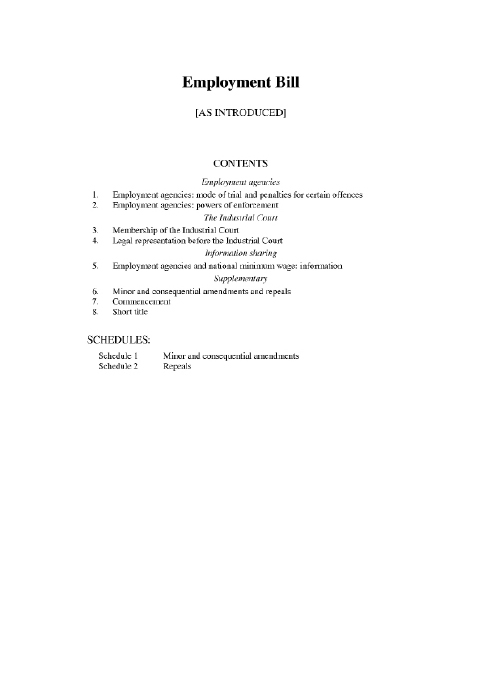
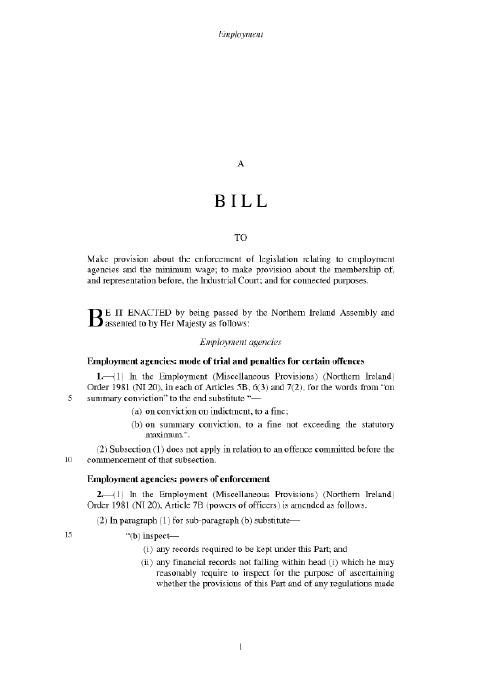
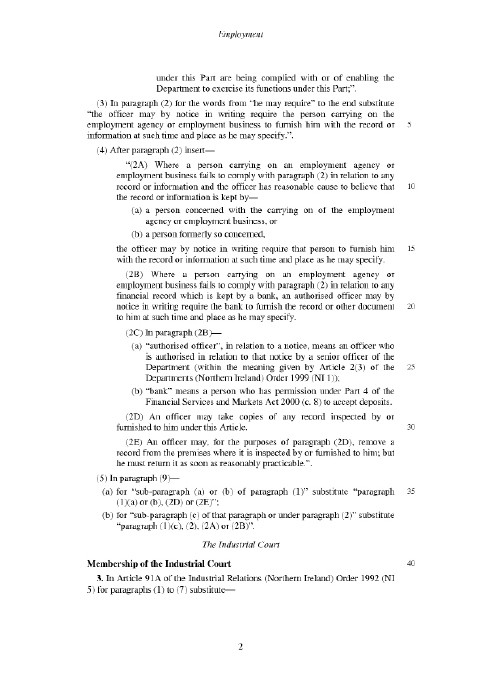
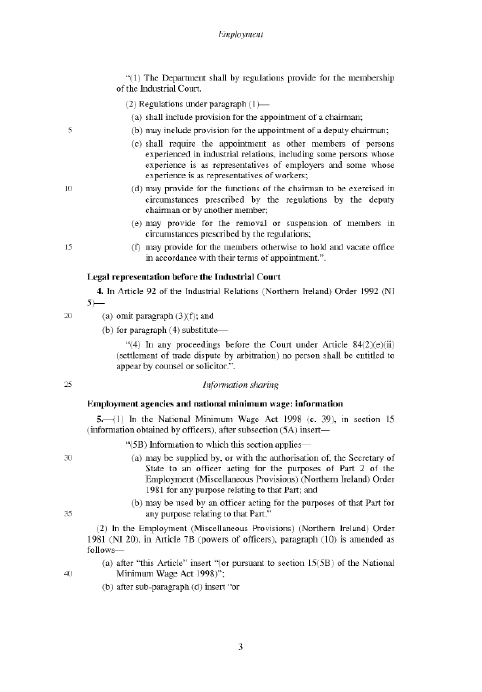
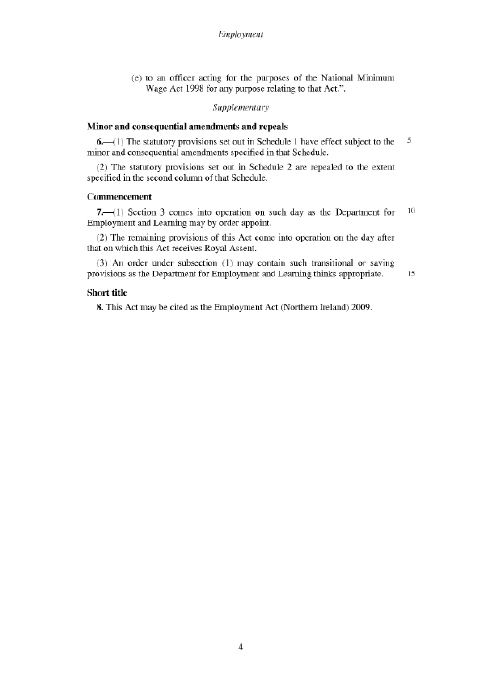
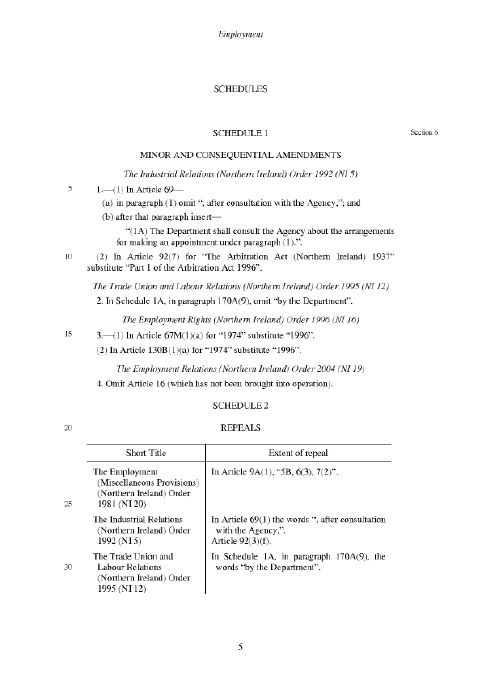

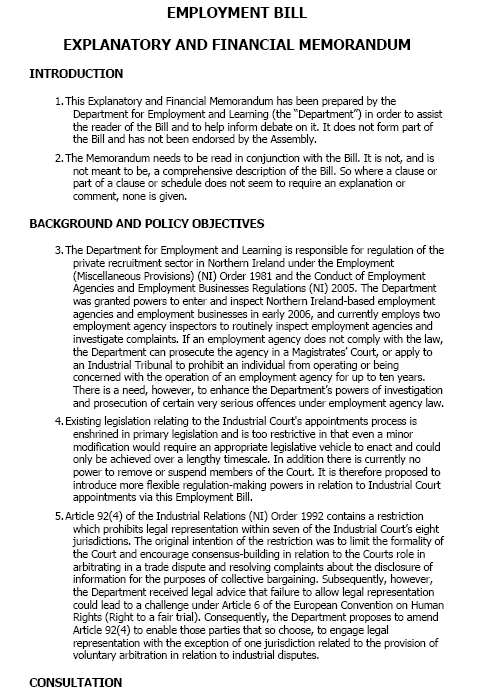
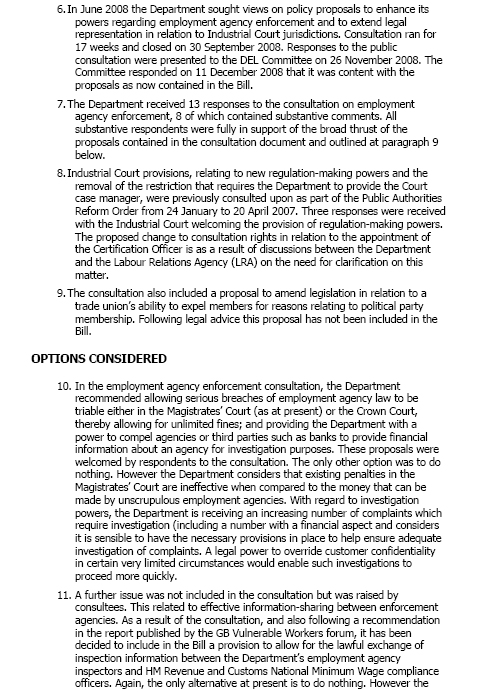
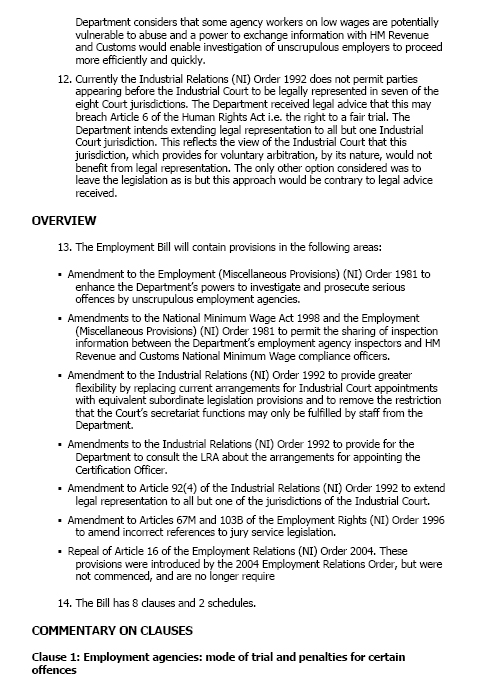
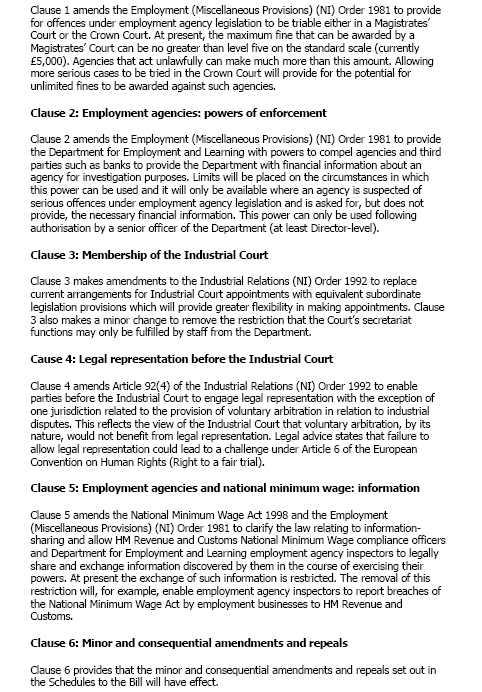
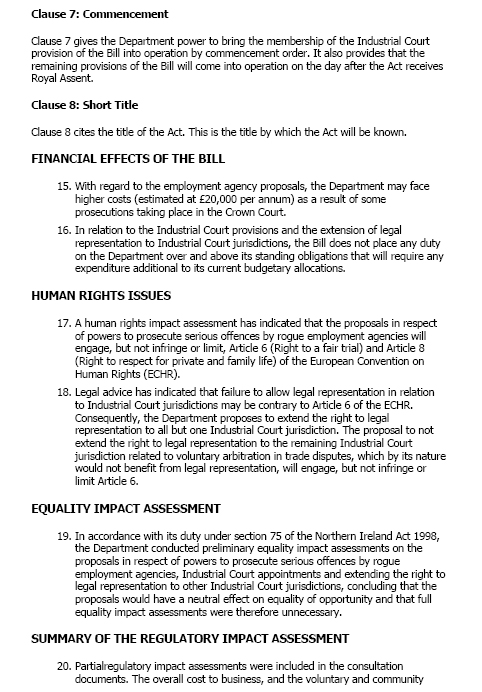
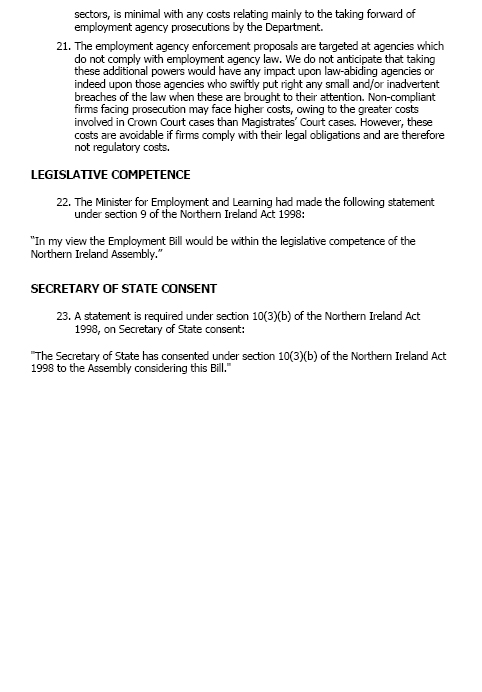
Appendix 4
Research Papers
Research and Library Services
_fmt.jpeg)
Research Paper No: September 2009
Employment Bill
Yan Liu
Research Officer
Research and Library Services
The Employment Bill is a Bill to make provision about the enforcement of legislation relating to employment agencies and the minimum wage; to make provision about the membership of, and representation before, the Industrial Court; and for connected purposes. The Bill was introduced to the Northern Ireland Assembly on 22 June 2009 and received its Second Stage on 30 June 2009. This research paper will give a brief explanation of what is contained in the Bill and highlight some of the issues that have given rise to concern and discussion among stakeholders.
Library Research Papers are compiled for the benefit of Members of The Assembly and their personal staff. Authors are available to discuss the contents of these papers with Members and their staff but cannot advise members of the general public.
Summary of key points
The Employment Bill was introduced to the Northern Ireland Assembly on 22 June 2009 and received its Second Stage on 30 June 2009[1]. The Bill has 8 clauses and 2 schedules. It contains diverse proposals to amend existing law to provide the Department for Employment and Learning (DEL) with a statutory power to investigate and prosecute serious offences by unscrupulous employment agencies.
The Bill will make amendments to the National Minimum Wage Act 1998 and the Employment (Miscellaneous Provisions) (NI) Order 1981 to permit the sharing of inspection information between the Department’s employment agency inspectors and HM Revenue and Customs National Minimum Wage compliance officers.
The Bill will amend the Industrial Relations (NI) Order 1992 to provide greater flexibility by replacing current arrangements for Industrial Court appointments with equivalent subordinate legislation provisions and to remove the restriction that the Court’s secretariat functions may only be fulfilled by staff from the Department.
The Bill will enable parties before the Industrial Court to engage legal representation with the exception of one jurisdiction related to the provision of voluntary arbitration in relation to industrial disputes by amendment to Article 92(4) of the Industrial Relations (NI) Order 1992.
The Bill will also amend the Industrial Relations (NI) Order 1992 to provide for the Department to consult the Labour Relations Agency (LRA) about the arrangements for appointing the Certification Officer.
The Bill amends existing legislation applying in Northern Ireland only. Progress of the Bill can be tracked on the Northern Ireland Assembly website at:
http://archive.niassembly.gov.uk/sopdf/so.htm
This research paper will give a brief explanation of what is contained in the Bill and highlight some of the issues that have given rise to concern and discussion among stakeholders.
Contents
Introduction 56
Background and Policy Objectives 56
Public Consultation Process 57
Employment Agencies and Businesses Proposals 57
Consultation on Proposals to Amend Trade Union Law 57
Proposals Which Were Not Included In the Consultations 57
Options Considered 58
The Proposed Bill 58
Clause 1: Mode of trial and penalties for certain offences 59
Clause 2: Employment agencies: powers of enforcement 59
Clause 3: Membership of the Industrial Court 59
Clause 4: Legal representation before the Industrial Court 60
Clause 5: Employment agencies and national minimum wage: information 61
Clause 6: Minor and consequential amendments and repeals 61
Clause 7: Commencement 61
Clause 8: Short Title 61
Estimated Financial Costs of the Proposed Bill 61
Human Rights Issues 62
Equality Impact Assessment 62
Summary of the Regulatory Impact Assessment 62
Introduction
The Department for Employment and Learning (DEL) introduced the Employment Bill in the Northern Ireland Assembly on 22 June and The Bill received its Second Stage on 30 June 2009[2].
The Bill has 8 clauses and 2 schedules. It contains diverse proposals to amend existing law to provide the Department for Employment and Learning (DEL) with a statutory power to investigate and prosecute serious offences by unscrupulous employment agencies.
The Bill will make amendments to the National Minimum Wage Act 1998 and the Employment (Miscellaneous Provisions) (NI) Order 1981 to permit the sharing of inspection information between the Department’s employment agency inspectors and HM Revenue and Customs National Minimum Wage compliance officers.
The Bill will amend the Industrial Relations (NI) Order 1992 to provide greater flexibility by replacing current arrangements for Industrial Court appointments with equivalent subordinate legislation provisions and to remove the restriction that the Court’s secretariat functions may only be fulfilled by staff from the Department. The Bill will enable parties before the Industrial Court to engage legal representation with the exception of one jurisdiction related to the provision of voluntary arbitration in relation to industrial disputes by amendment to Article 92(4) of the Industrial Relations (NI) Order 1992.
The Bill will also amend the Industrial Relations (NI) Order 1992 to provide for the Department to consult the Labour Relations Agency (LRA) about the arrangements for appointing the Certification Officer.
The Bill amends existing legislation applying in Northern Ireland only. Progress of the Bill can be tracked on the Northern Ireland Assembly website at:
http://archive.niassembly.gov.uk/sopdf/so.htm
This research paper will give a brief explanation of what is contained in the Bill and highlight some of the issues that have given rise to concern and discussion among stakeholders.
1. Background and Policy Objectives[3]
The Department for Employment and Learning is responsible for regulation of the private recruitment sector in Northern Ireland under the Employment (Miscellaneous Provisions) (NI) Order 1981 and the Conduct of Employment Agencies and Employment Businesses Regulations (NI) 2005. The Department was granted powers to enter and inspect Northern Ireland-based employment agencies and employment businesses in early 2006, and currently employs two employment agency inspectors to routinely inspect employment agencies and investigate complaints. If an employment agency does not comply with the law, the Department can prosecute the agency in a Magistrates’ Court, or apply to an Industrial Tribunal to prohibit an individual from operating or being concerned with the operation of an employment agency for up to ten years. There is a need, however, to enhance the Department’s powers of investigation and prosecution of certain very serious offences under employment agency law.
Existing legislation relating to the Industrial Court’s appointments process is enshrined in primary legislation and is too restrictive in that even a minor modification would require an appropriate legislative vehicle to enact and could only be achieved over a lengthy timescale. In addition there is currently no power to remove or suspend members of the Court. It is therefore proposed to introduce more flexible regulation-making powers in relation to Industrial Court appointments via this Employment Bill.
Article 92(4) of the Industrial Relations (NI) Order 1992 contains a restriction which prohibits legal representation within seven of the Industrial Court’s eight jurisdictions. The original intention of the restriction was to limit the formality of the Court and encourage consensus-building in relation to the Courts role in arbitrating in a trade dispute and resolving complaints about the disclosure of information for the purposes of collective bargaining. Subsequently, however, the Department received legal advice that failure to allow legal representation could lead to a challenge under Article 6 of the European Convention on Human Rights (Right to a fair trial). Consequently, the Department proposes to amend Article 92(4) to enable those parties that so choose, to engage legal representation with the exception of one jurisdiction related to the provision of voluntary arbitration in relation to industrial disputes.
2. Public Consultation Process
Employment Agencies and Businesses: Proposed Changes to Investigation Powers and Penalty Regime – A Consultation (2 June 08 – 30 September 08)
This consultation on changes to employment law contains proposals to strengthen employment agency enforcement powers. The employment agency proposals seek to strengthen the Department for Employment and Learning’s ability to prosecute the small number of rogue agencies that abuse vulnerable workers and undermine the vast majority of reputable agencies. The consultation took place between 2 June and 30 September 2008.
The Department received 13 responses to the consultation on employment agency enforcement, 8 of which contained substantive comments. All substantive respondents were fully in support of the broad thrust of the proposals contained in the consultation document.
Consultation on Proposals to Amend Trade Union Law (2 June 08 – 30 September 08)
This consultation largely contains proposals to amend trade union law to address a decision by the European Court of Human Rights which concluded that trade unions should have more autonomy to decide their membership. The consultation took place between 2 June and 30 September 2008. This consultation also included a proposal to amend legislation in relation to a trade union’s ability to expel members for reasons relating to political party membership. Following legal advice this proposal has not been included in the Bill.
The Department had received 13 responses; 9 of which were substantive. The consultation provided no comment on the proposals:
- Amendment to Articles 67M and 103B of the Employment Rights (NI) Order 1996 to amend incorrect references to jury service legislation.
- Repeal of Article 16 of the Employment Relations (NI) Order 2004.
Proposals Which Were not Included in the Consultations
The proposals of industrial Court provisions, relating to new regulation-making powers and the removal of the restriction that requires the Department to provide the Court case manager, were not included in the DEL Employment Bill public consultations. This proposal was previously consulted upon as part of the Public Authorities Reform Order from 24 January to 20 April 2007. The proposed change to consultation rights in relation to the appointment of the Certification Officer is as a result of discussions between the Department and the Labour Relations Agency (LRA) on the need for clarification on this matter.
The sharing of inspection information proposals between the Department’s employment agency inspectors and HM Revenue and Customs National Minimum Wage compliance officers by amending the National Minimum Wage Act 1998 and the Employment (Miscellaneous Provisions) (NI) Order 1981 were also not consulted in DEL Employment Bill public consultations. The removal of this restriction will, for example, enable employment agency inspectors to report breaches of the National Minimum Wage Act by employment businesses to HM Revenue and Customs.
Options Considered[4]
In the employment agency enforcement consultation, the Department recommended allowing serious breaches of employment agency law to be triable either in the Magistrates’ Court (as at present) or the Crown Court, thereby allowing for unlimited fines; and providing the Department with a power to compel agencies or third parties such as banks to provide financial information about an agency for investigation purposes. These proposals were welcomed by respondents to the consultation. The only other option was to do nothing. However the Department considers that existing penalties in the Magistrates’ Court are ineffective when compared to the money that can be made by unscrupulous employment agencies. With regard to investigation powers, the Department is receiving an increasing number of complaints which require investigation (including a number with a financial aspect) and considers it is sensible to have the necessary provisions in place to help ensure adequate investigation of complaints. A legal power to override customer confidentiality in certain very limited circumstances would enable such investigations to proceed more quickly.
Currently the Industrial Relations (NI) Order 1992 does not permit parties appearing before the Industrial Court to be legally represented in seven of the eight Court jurisdictions. The Department received legal advice that this may breach Article 6 of the Human Rights Act i.e. the right to a fair trial. The Department intends extending legal representation to all but one Industrial Court jurisdiction. This reflects the view of the Industrial Court that this jurisdiction, which provides for voluntary arbitration, by its nature, would not benefit from legal representation. The only other option considered was to leave the legislation as is but this approach would be contrary to legal advice received.
3. The Proposed Bill
The Employment Bill was introduced to the Assembly on 22 June 2009 and received its Second Stage on 30 June 2009. The proposed Bill has 8 clauses and 2 schedules. It contains provisions in the following areas[5]:
- Amendment to the Employment (Miscellaneous Provisions) (NI) Order 1981 to enhance the Department’s powers to investigate and prosecute serious offences by unscrupulous employment agencies.
- Amendments to the National Minimum Wage Act 1998 and the Employment (Miscellaneous Provisions) (NI) Order 1981 to permit the sharing of inspection information between the Department’s employment agency inspectors and HM Revenue and Customs National Minimum Wage compliance officers.
- Amendment to the Industrial Relations (NI) Order 1992 to provide greater flexibility by replacing current arrangements for Industrial Court appointments with equivalent subordinate legislation provisions and to remove the restriction that the Court’s secretariat functions may only be fulfilled by staff from the Department.
- Amendments to the Industrial Relations (NI) Order 1992 to provide for the Department to consult the LRA about the arrangements for appointing the Certification Officer.
- Amendment to Article 92(4) of the Industrial Relations (NI) Order 1992 to extend legal representation to all but one of the jurisdictions of the Industrial Court.
- Amendment to Articles 67M and 103B of the Employment Rights (NI) Order 1996 to amend incorrect references to jury service legislation.
- Repeal of Article 16 of the Employment Relations (NI) Order 2004. These provisions were introduced by the 2004 Employment Relations Order, but were not commenced, and are no longer require
This section individually outlines key provisions amongst them, including comment on issues that have arisen during consultation.
Clause 1: Employment agencies: mode of trial and penalties for certain offences
Clause 1 allows prosecutions under the current Employment (Miscellaneous Provisions) (Northern Ireland) Order 1981 to be triable either in the Magistrates’ Court, or the Crown Court, thereby allowing for unlimited fines in the most serious cases. DEL currently has the power to prosecute non-compliant employment agencies in the Magistrates’ Court. The maximum fine is level 5 on the standard scale (currently £5,000), which is not considered to be an effective deterrent to unscrupulous agencies which can make multiples of this amount from using illegal practices.
Northern Ireland Association for the Care and Resettlement of Offenders (NIACRO) welcomed the proposed amendment and stated that “it is important that strict guidelines are established and implemented to ensure that any fines given are applied fairly, consistently and represent the seriousness of the offence"[6].
Clause 2: Employment agencies: powers of enforcement
Clause 2 provides DEL with a statutory power to compel agencies or third parties such as banks to provide DEL with financial information for investigation purposes. This power will only be available where an agency is suspected of serious offences under employment agency legislation and is asked for, but does not provide, the necessary financial information. The power can only be used following authorisation by a senior official of the Department (at least Director-level).
Issues arising from NIACRO and Altmore IT
NIACRO stated that there should be a “clear definition of what is to be considered a serious offence", and that such information “should not be collected at will and should only be used in the most serious cases".
Altmore IT agreed that the level of authorising officer was appropriate but that if granting lower level officers authorisation ensured more efficient enforcement, “this would be preferable".
Clause 3: Membership of the Industrial Court
Clause 3 provides flexibility by replacing current arrangements for Industrial Court appointments with equivalent subordinate legislation provisions by amending the Industrial Relations (NI) Order 1992. Clause 3 also makes a minor change to remove the restriction that the Court’s secretariat functions may only be fulfilled by staff from the Department.
This proposal was not included in DEL Employment Bill public consultations. However, Issues arising on Regulation making powers for DEL to address the future appointment needs of the Court and Removal of the restriction that requires DEL to provide the Court case manager were previously consulted upon as part of the Public Authorities Reform Order in 2007. The summary of consultation responses on Industrial Court Provisions and DEL responses are shown in Table 1 below:
| Respondent | Comments | Departmental Response |
| Industrial Court for NI | The Court welcomes the provision of regulation making powers for the appointment and functioning of the Court provided there is no delay between the conclusion of the current arrangements and the commencement of the new arrangements. The Court looks forward to further consultation on the draft regulations. It would be helpful if the legislation included regulation making powers for the provision of the Secretariat. | The modifications to Article 91A of the Industrial Relations (N.I.) Order 1992 via the proposed Public Authorities Reform (PAR) Bill will come into effect, on a date prescribed by the Department, subsequent to the making of the PAR Bill via a commencement Order. The associated Regulations made under the revised Article 91A will be consulted upon and made by the Department prior to the revisions to Article 91A being given effect. It is the Department’s intention that these Regulations will be brought into effect simultaneously with the modifications to Article 91A thus ensuring continuity in relation to the statutory provisions relating to the membership of the Court. The Department considers separate regulation-making powers are unnecessary as the proposed amendment to the Trade Union and Labour Relations (NI) Order 1995 provides sufficient flexibility to address the ongoing provision of a Court Secretariat. |
| Irish Congress of Trade Unions | ICTU oppose the removal of the restriction that requires the Department for Employment and Learning to provide the Court case manager. ICTU believes that the Chairperson and Deputy Chairperson should remain non-judicial appointments. | To accommodate any future change in responsibility for appointments to the Industrial Court and provision of the Court case manager, the Department has proposed amendments to the current legislation to ensure it allows suitable flexibilities to provide for these changes if required. For the present the Department will continue to provide secretariat support to the Court |
| Northern Ireland Public Service Alliance | NIPSA is concerned about the proposal to remove the requirement for an independent president and its replacement with a Chairman without any condition or stipulation of independence. | This is not provided for by the draft legislation. NIPSA may be referring to pre 2001 when the President of the Office of the Industrial Tribunal and Fair Employment Tribunal was also responsible for the Court. Since the reconstitution of the Industrial Court in 2001 a Chairman appointed by the Department has had responsibility for discharging the functions of the Court in accordance with Article 91A of the Industrial Relations (Northern Ireland) Order 1992 |
Table 1: Summary of consultation responses on Industrial Court Provisions and DEL response
Clause 4: Legal representation before the Industrial Court
Clause 4 extends legal representation to all but one of the jurisdictions of the Industrial Court by amending Article 92(4) of the Industrial Relations (NI) Order 1992. This reflects the view of the Industrial Court that voluntary arbitration, by its nature, would not benefit from legal representation. Legal advice states that failure to allow legal representation could lead to a challenge under Article 6 of the European Convention on Human Rights (Right to a fair trial).
Issues arising from the Law Society of NI, NIC-ICTU, INTO & LRA
The Law Society of NI welcomed the proposed amendment to extend an individual’s rights to legal representation before the Industrial Court. They and the Law Reform Committee argued however that the proposal did not go far enough, stating their support for the complete removal of the restriction on legal representation.
NIC-ICTU, Irish National Teachers Organisation (INTO) and LRA opposed the removal of the restriction on legal representatives in the Industrial Court. The LRA argued that from their experience legal representation in employment relations matters is normally best kept to a minimum to encourage parties to resolve their differences in a timely and effective manner. The INTO drew on their experience in dealing with the Fair Employment Tribunal quoting the increased cost of legal representation and NIC-ICTU felt that because there are no prohibitions to parties providing legal representation at the Central Arbitration Committee (CAC) in Great Britain it does not mean they are right and we are wrong.
Clause 5: Employment agencies and national minimum wage: information
Clause 5 permits the sharing of inspection information between the Department’s employment agency inspectors and HM Revenue and Customs National Minimum Wage compliance officers by amending the National Minimum Wage Act 1998 and the Employment (Miscellaneous Provisions) (NI) Order 1981. The removal of this restriction will, for example, enable employment agency inspectors to report breaches of the National Minimum Wage Act by employment businesses to HM Revenue and Customs.
This proposal was not included in DEL Employment Bill public consultations. A DEL representative stated “currently there is a bar on information sharing between HMRC and employment agency inspectors. We do work closely with HMRC and indeed with the Gangmasters Licensing Authority with relation to inspections and what we are proposing is to amend the legislation to allow for information sharing between National Minimum Wage inspectors and our own inspectors. We currently are allowed to share info with the Gangmasters but not with HMRC. That will require a change in the National Minimum Wage Act and also our 1981 Order which is the Employment Agency Order."[7]
Issues arising from the Law Centre
The Law Centre stated that while “enforcement remains divided between three distinct agencies [DEL, the Gangmasters Licensing Authority (GLA)) and HM Revenue and Customs (HMRC)] the most serious offenders will evade full penalty. This risk is heightened because of the restrictions on information sharing between enforcement agencies". The Law Centre proposed that one agency should have oversight of all three areas.
Northern Ireland Committee-Irish Congress of Trade Unions (NIC-ICTU) argued there is a “need for a properly funded mechanism to allow vulnerable unorganised agency workers who are experiencing exploitation and mistreatment to have their complaints dealt with speedily and without exposing them to victimisation".
Clause 6: Minor and consequential amendments and repeals
Clause 6 provides that the minor and consequential amendments and repeals set out in the Schedules to the Bill will have effect.
Clause 7: Commencement
Clause 7 gives the Department power to bring the membership of the Industrial Court provision of the Bill into operation by commencement order. It also provides that the remaining provisions of the Bill will come into operation on the day after the Act receives Royal Assent.
No issues appear to arise from the information currently available
Clause 8: Short Title
Clause 8 cites the title of the Act. This is the title by which the Act will be known.
No issues appear to arise from the information currently available.
Estimated Financial Costs of the Proposed Bill
DEL estimates the financial costs at £20,000 per annum as a result of some prosecutions taking place in the Crown Court. In relation to the Industrial Court provisions and the extension of legal representation to Industrial Court jurisdictions, the Bill does not place any duty on the Department over and above its standing obligations that will require any expenditure additional to its current budgetary allocations.
Human Rights Issues[8]
A human rights impact assessment has indicated that the proposals in respect of powers to prosecute serious offences by rogue employment agencies will engage, but not infringe or limit, Article 6 (Right to a fair trial) and Article 8 (Right to respect for private and family life) of the European Convention on Human Rights (ECHR).
Legal advice has indicated that failure to allow legal representation in relation to Industrial Court jurisdictions may be contrary to Article 6 of the ECHR. Consequently, the Department proposes to extend the right to legal representation to all but one Industrial Court jurisdiction. The proposal to not extend the right to legal representation to the remaining Industrial Court jurisdiction related to voluntary arbitration in trade disputes, which by its nature would not benefit from legal representation, will engage, but not infringe or limit Article 6.
Equality Impact Assessment[9]
In accordance with its duty under section 75 of the Northern Ireland Act 1998, the Department conducted preliminary equality impact assessments on the proposals in respect of powers to prosecute serious offences by rogue employment agencies, Industrial Court appointments and extending the right to legal representation to other Industrial Court jurisdictions, concluding that the proposals would have a neutral effect on equality of opportunity and that full equality impact assessments were therefore unnecessary.
Summary of the Regulatory Impact Assessment
Partial regulatory impact assessments were included in the consultation documents. The overall cost to business, and the voluntary and community sectors, is minimal with any costs relating mainly to the taking forward of employment agency prosecutions by the Department.
The employment agency enforcement proposals are targeted at agencies which do not comply with employment agency law. We do not anticipate that taking these additional powers would have any impact upon law-abiding agencies or indeed upon those agencies who swiftly put right any small and/or inadvertent breaches of the law when these are brought to their attention. Non-compliant firms facing prosecution may face higher costs, owing to the greater costs involved in Crown Court cases than Magistrates’ Court cases. However, these costs are avoidable if firms comply with their legal obligations and are therefore not regulatory costs.
[1] A full copy of the NI Bill is available on the Assembly website
http://archive.niassembly.gov.uk/legislation/primary/2008/niabill9_08.htm
[2] A full copy of the NI Bill is available on the Assembly website
http://archive.niassembly.gov.uk/legislation/primary/2008/niabill9_08.htm
[3] Employment Bill Explanatory and Financial Memorandum
http://archive.niassembly.gov.uk/legislation/primary/2008/niabill9_08_efm.htm
[4] Employment Bill Explanatory and Financial Memorandum
http://archive.niassembly.gov.uk/legislation/primary/2008/niabill9_08_efm.htm
[5] Employment Bill Explanatory and Financial Memorandum
http://archive.niassembly.gov.uk/legislation/primary/2008/niabill9_08_efm.htm
[6] Summary of responses to public consultations on policy proposals
[7] NI Assembly Employment and Learning Committee Note of Evidence Session
[8] Employment Bill Explanatory and Financial Memorandum
http://archive.niassembly.gov.uk/legislation/primary/2008/niabill9_08_efm.htm
[9] Employment Bill Explanatory and Financial Memorandum
http://archive.niassembly.gov.uk/legislation/primary/2008/niabill9_08_efm.htm
Appendix 5
Correspondence
Delegated Powers Memorandum for the Employment Bill – 22nd June 2009

Committee Clerk
The Committee for Employment and Learning
Northern Ireland Assembly
Parliament Buildings
Stormont
BELFAST
BT4 3SW 22 June 2009
Employment Bill: Introduction
The Employment Bill was introduced to the Assembly on 22 June 2009.
A draft of the Bill and the associated Explanatory and Financial Memorandum issued to the Committee prior to introduction stage.
In line with legislative guidance I now submit a Delegated Powers Memorandum
which details enabling powers for subordinate legislation contained within
the Employment Bill.
Branch officials will, of course, be happy to provide oral or written briefing should the Committee require further information or clarification on any of these issues.
Yours sincerely
Departmental Assembly Liaison Officer
Delegated Powers Memorandum for the Employment Bill
The draft Employment Bill contains one provision for delegated legislation, in clause 3, which relates to Industrial Court Appointments.
Delegated Provision
Industrial Court Appointments (Clause 3 of the Bill)
1. Purpose of delegated legislation
Article 91A of the Industrial Relations (Northern Ireland) Order 1992 (the “1992 Order") currently makes provision for the appointment of members to the Court, their terms of appointment, and the payment to the members of such remuneration and travelling and other allowances as may be determined by the Department. The revisions, contained within clause 3 of the draft Employment Bill, will replace the detailed provisions of Article 91A of the 1992 Order with regulation-making powers which will enable the Department to mirror, via subordinate legislation, the provisions currently contained within:
(a) Article 91A(1) to (4) relating to the appointment of members;
(b) Article 91A(5) and (6) relating to the deputy chairman or a member performing the function of chairman of the Court; and
(c) Article 91A(7) relating to the terms of appointment of members.
The regulation-making powers will also include a provision to allow for the removal or suspension of members in prescribed circumstances.
2. Reason for delegated legislation
The Department considers Article 91A of the 1992 Order to be too restrictive in its current form in that any modification to the current appointment provisions would require primary legislation. The Department would therefore wish to replace the provisions contained within Article 91A with broader regulation-making powers which would enable the Department to make provision related to the appointment of members and their terms of appointment via subordinate legislation. In the Department’s view this approach will afford sufficient flexibility to facilitate any future changes, in terms of best practice etc., with respect to the appointment of members of the Court in a timely manner without recourse to primary legislation.
3. Assembly control
The Department is of the view that subordinate legislation under the revised Article 91A should be subject to negative resolution before the Northern Ireland Assembly. This is based on the fact that current Orders and Regulations drafted under the 1992 Order and 1995 Order are subject to negative resolution by virtue of Articles 107 and 147 of those Orders respectively. The First Legislative Counsel has agreed with this approach. The DEL Committee will be consulted on the proposed detailed policy content of subordinate legislation through the “SL1" procedure before it is made.
Department for Employment and Learning
22 June 2009
Correspondence from the Minister
on Amendments to the
Employment Bill – 3rd August 2009
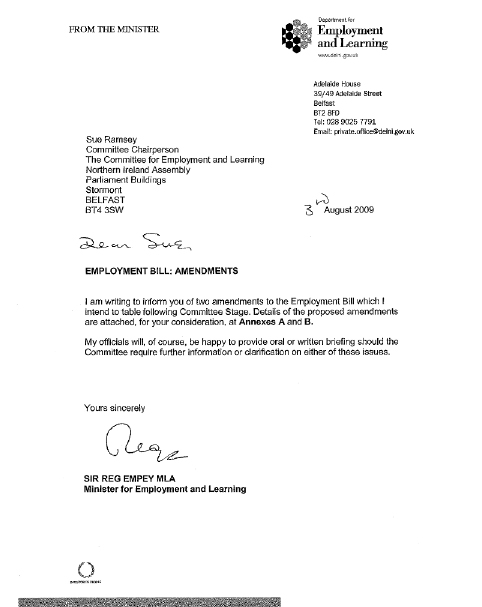
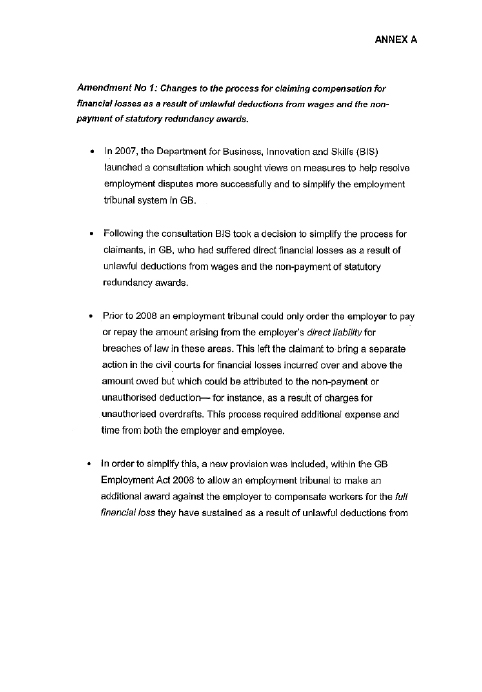
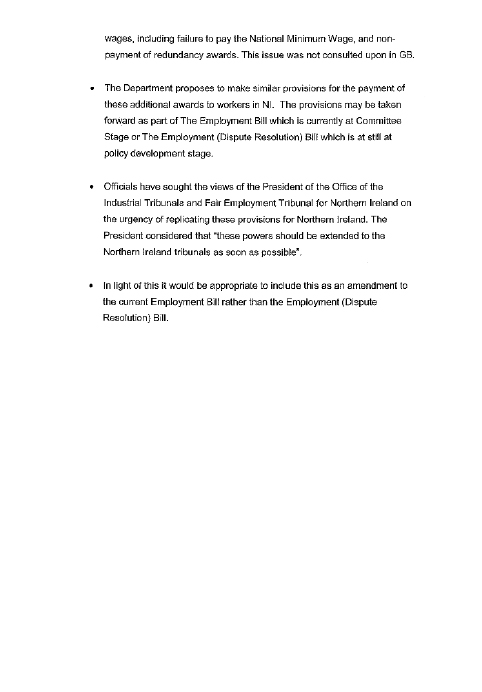
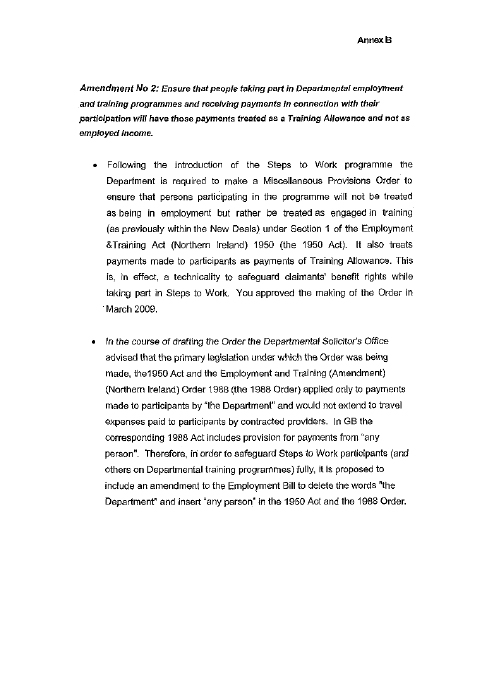
Correspondence from the Minister
on Amendments to the
Employment Bill – 21st August 2009
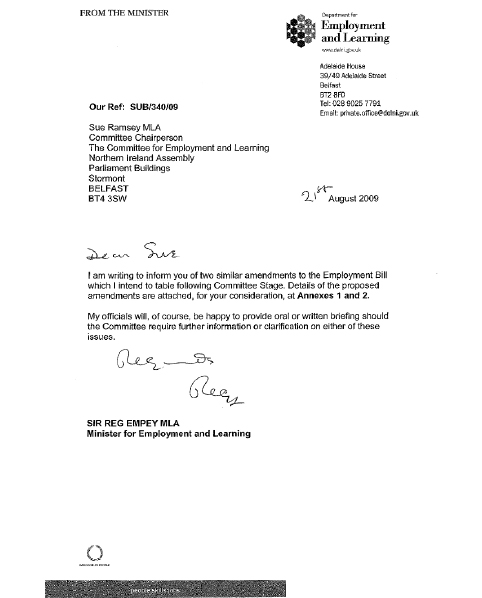
Annex 1
Amendment No 1: Changes to the process for consulting with organisations representative of employers and employees in relation to appointments to the Board of the Labour Relations Agency.
The Industrial Relations (NI) Order 1992 grants consultation rights to organisations representative of employers and employees as part of the process to appoint representative members to the Labour Relations Agency:
Industrial Relations (NI) Order 1992, Schedule 4, Part I, Para 2(b)
2. The Agency shall consist of the following persons appointed by the Head of the Department, namely—
(a) a chairman; and
(b) 9 other members of whom—
(i) 3 shall be appointed after consultation with such organisations or associations of organisations representative of employers as appear to the Head of the Department to be appropriate;
(ii) 3 shall be appointed after consultation with such organisations or associations of organisations representative of employees as appear to the Head of the Department to be appropriate; …
Under the Ministerial Code of Conduct, Ministers are bound to follow the seven principles of public life set out by the Committee on Standards in Public Life, one of which requires that, in making public appointments, choices should be made on merit. This is consistent with the Office of the Commissioner for Public Appointments’ (‘OCPA’) Code of Practice.
It is possible to interpret the current consultation rights regarding the LRA in a way which compromises the transparency of the appointments process and is incompatible with the Ministerial Code of Conduct. It is therefore proposed to amend the Industrial Relations (NI) Order 1992 to remove ambiguity.
In view of the need for the LRA Boards to ensure the effective reflection of the employee and employer perspective in their proceedings, it is appropriate that there is a role for trade unions and employer organisations to play in preparations for the appointments process and in encouraging representative members to put themselves forward for selection. To this end, it is desirable to amend the Order to clarify that employer and employee organisations will be consulted on recruitment arrangements and selection criteria related to the appointment of LRA members representative of employers/employees, but not consultation on the appointment of specific individuals whom it is the Minister’s duty to select for appointment.
This amendment ties in with legislative provisions already contained in the Employment Bill, which will make similar modifications to the consultation rights enjoyed by the LRA in relation to appointments to the Industrial Court and the post of Certification Officer.
In seeking such an amendment to the legislation, it is intended to recognise the balance between the role of employer and employee representative groups in informing the process of appointing LRA Board members, and the need to ensure that such appointments are transparent and on merit.
Annex 2
Amendment No 2: Changes to the process for consulting with organisations representative of employers and employees in relation to appointments to the Board of the Construction Industry Training Board.
This amendment is essentially identical to that described at Annex 1 above, however it relates to appointments to the Construction Industry Training Board (CITB) rather than the LRA.
In relation to the CITB, the legislation on consultation with employer and employee bodies is as follows:
Industrial Training (NI) Order 1984, Schedule 2, Para 2(2)
2.—(2) An industrial training board shall consist of the following members—
(a) a chairman, who shall be a person appearing to the Department to have industrial, commercial or educational experience;
(b) an equal number of persons who shall be appointed after consultation with such organisations as appear to the Department to be representative respectively of employers engaging in the industry and of employees in the industry;…
As above, it is desirable to amend this reference to clarify that employer and employee organisations will be consulted on recruitment arrangements and selection criteria related to the appointment of CITB members representative of employers/employees, but not on the appointment of specific individuals whom it is the Minister’s duty to select for appointment. This is designed to ensure that the legislation is consistent with the Ministerial Code of Conduct and the OCPA Code of Practice.
Amendments to the Employment Bill – Correspondence of 15th August 2009
Adelaide House
39-49 Adelaide Street
BELFAST
BT2 8FD
Committee Clerk
The Committee for Employment and Learning
Northern Ireland Assembly
Parliament Buildings
Stormont
BELFAST
BT4 3SW 15th September 2009
Amendments to the Employment Bill
In August this year the Minister notified the Committee Chairperson of several amendments to the Employment Bill that he intended to table at Consideration Stage.
I now understand that the Committee intends to examine the Bill on a clause by clause basis on 16 September 2009. To assist with this scrutiny I attach the draft amendments which we have just received from First Legislative Counsel (Annex A).
The Department welcomes the Committee’s interest in these matters and in particular any comments and views members may have. Should you require any further information please do not hesitate to contact me.
Yours sincerely
Departmental Assembly Liaison
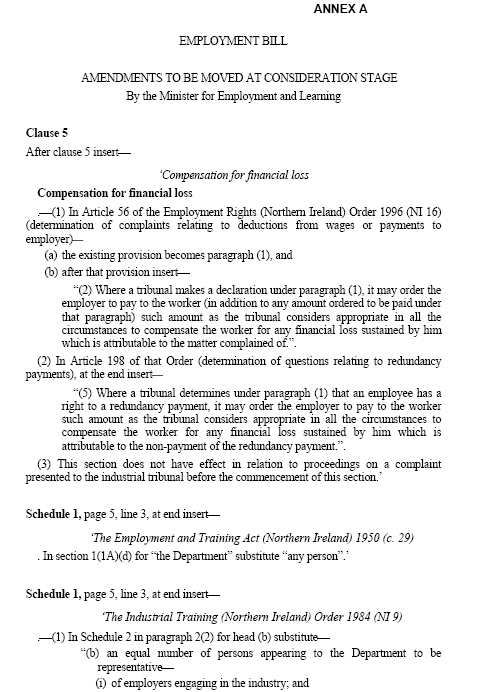
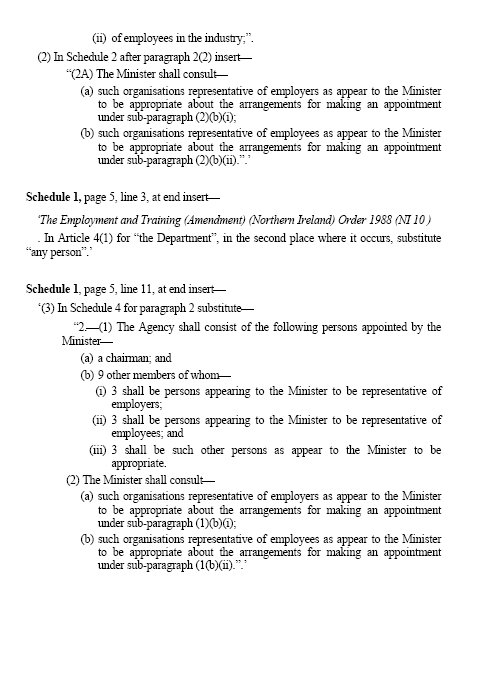
Correspondence on Amendments to the Employment Bill – 18th September 2009
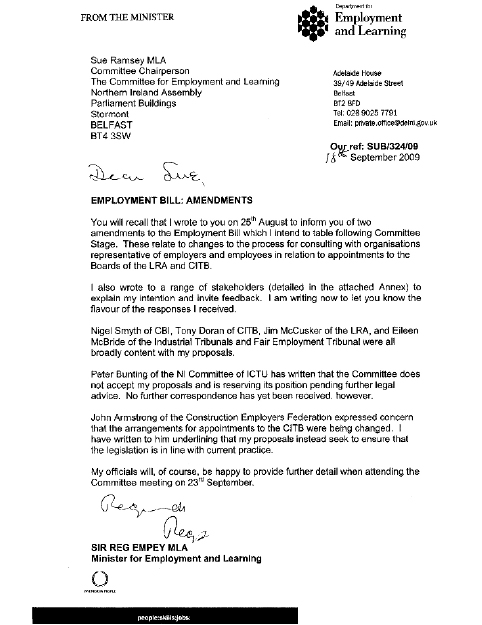
Annex: Feedback on the proposed amendments to consultation rights relating to appointments to the LRA and CITB was sought from the stakeholders below. Responses were received from those underlined:
- CBI (Nigel Smyth)
- Federation of Small Businesses (Wilfred Mitchell)
- Institute of Directors (Linda Brown)
- NI Committee of the Irish Congress of Trade Unions (Peter Bunting)
- Labour Relations Agency (Jim McCusker)
- Construction Industry Training Board (Tony Doran)
(on request from CITB, feedback was also sought from the Construction Employers Federation, the Federation of Master Builders, Scottish and NI Plumbing Employers Federation, Heating and Ventilating Association, and the National Federation of Roofing Contractors.)
- OITFET (Eileen McBride)
Correspondence from the Department following 23rd September Briefing to
the Committee – 29th September 2009

Adelaide House
39-49 Adelaide Street
BELFAST
BT2 8FD
Committee Clerk
The Committee for Employment and Learning
Northern Ireland Assembly
Parliament Buildings
Stormont
BELFAST
BT4 3SW 29 September 2009
As you will recall [officials] from the Department appeared before the Committee on 23 September to provide briefing on the clause-by-clause analysis of the Employment Bill.
Committee members raised issues in relation to:
- The Construction Industry Training Board; and
- Priority payments to employees in the event of the insolvency of their employer.
I am now forwarding advice on these matters and would be grateful if you could bring this letter to the attention of the Committee.
Construction Industry Training Board (CITB)
As outlined on 23 September, the Department proposes to move amendments to the Employment Bill to clarify the nature of consultation rights enjoyed by organisations representative of employers and employees in respect of appointments to the CITB and LRA Boards. Mrs McGill queried the appropriateness of this proposed change to CITB legislation in view of the recommendations of the review of the CITB.
The review of the CITB is a separate matter. Any legislative changes resulting from the review will take some time to prepare and effect, during which time the CITB will continue to have a Board. It is therefore appropriate that the consultation rights in respect of that Board are amended in line with those relating to the LRA to ensure that the OCPA principles of fairness and transparency are maintained, and for the sake of consistency. In any event, it is intended that the CITB Board will be retained following the implementation of the review recommendations, therefore there will still be a need to make Ministerial appointments.
Employees’ rights in the event that their employer is insolvent
Part XIV of The Employment Rights (NI) Order 1996 details the amount that employees are entitled to be paid from the National Insurance Fund on the insolvency of their employer. The main condition is that the employer is insolvent within the meaning of the Insolvency (NI) Order 1989 (“the 1989 Order"). Only employees of the insolvent employer are entitled to receive a payment. They do not need to have worked for their employer for a certain length of time and there are no age limits. Employees can claim a number of debts from the insolvent employer, including unpaid wages and salary (to a weekly limit of £350[1]) for up to eight weeks; commission; overtime; and holiday pay (subject to certain limits). A complete list of debts which can be claimed is included in the Department’s guidance, ER5 - Your rights if your employer is insolvent, available at www.delni.gov.uk/er
The employee or employer’s representative will send an application form to the Department for Employment and Learning which works out the amount due and sends it directly to the employee. If the employee is owed more than the Department is allowed to pay, the employer’s representative will consider the rest of the debt separately as part of insolvency proceedings. If the ex-employer has not paid certain contributions into the employee’s occupational pension scheme, the scheme administrator may apply to the Department for these contributions. Employees can complain to an Industrial Tribunal if the Department has refused a payment which the employee thinks should have been made, or if the employee has received less than they should have done.
The issue of defining preferential creditors is governed by the Insolvency (Northern Ireland) Order 1989, which is the responsibility of the Department of Enterprise, Trade and Investment’s Insolvency Service. However we understand that the remuneration of employees is treated as preferential under the 1989 Order.
If you require any further information please do not hesitate to contact me.
Yours sincerely
Departmental Assembly Liaison Officer
[1] Increasing to £380 from 1 October 2009
Correspondence with the Construction Employers Federation and the Northern Ireland Committee of the Irish Congress
of Trade Unions Regarding Amendments to the Employment Bill – 6th October 2009
Ms Sue Ramsey MLA, Chairperson,
Committee for Employment and Learning
Ciaran Fox
Construction Employers Federation
6th October 2009
Dear Ciaran,
Re: Amendments to the Employment Bill
As you are aware, the Employment Bill is currently at its Committee Stage in the Assembly. Members of the Employment and Learning Committee have already agreed the clauses and schedules of the Bill as drafted. The Committee has had some discussion about the proposed amendments to the Bill and has received a letter from the Minister in relation to these. The letter indicates that the Construction Employers Federation has expressed concern about the proposed changes regarding appointments made to the CITB. At its meeting on 30th September the Committee agreed that I should write to you to ascertain CEF’s concerns regarding the amendments. Members understand that the amendments have not yet been before the Executive and the Committee is currently reserving its judgement on them.
I would be grateful if you could respond at your earliest convenience outlining CEF’s concerns regarding the amendments.
Yours sincerely,

Sue Ramsey MLA
Chairperson
Ms Sue Ramsey MLA, Chairperson,
Committee for Employment and Learning
Peter Bunting
Northern Ireland Committee
Irish Congress of Trade Unions
6th October 2009
Dear Peter,
RE: Amendments to the Employment Bill
As you are aware, the Employment Bill is currently at its Committee Stage in the Assembly. Members of the Employment and Learning Committee have already agreed the clauses and schedules of the Bill as drafted. The Committee has had some discussion about the proposed amendments to the Bill and has received a letter from the Minister in relation to these. The letter indicates that the NI Committee of ICTU does not accept the proposals contained in the amendments and is seeking legal advice on the same. At its meeting on 30th September the Committee agreed that I should write to you to ascertain your Committee’s concerns regarding the amendments. Members understand that the amendments have not yet been before the Executive and the Committee is currently reserving its judgement on them.
I would be grateful if you could respond at your earliest convenience outlining NICICTU’s objections to the amendments.
I look forward to your reply.
Yours sincerely,

Sue Ramsey MLA
Chairperson
Ref t:/cef/citb/employmentlearningcomm
Sue Ramsay MLA
Chairperson
Committee for Employment and Learning
Room 283
Parliament Buildings
Stormont
Belfast
BT4 3XX
14 October 2009
Dear Sue
Thank you for your letter of 6 October 2009 regarding the Department for Employment and Learning’s proposed amendment to the Industrial Training (NI) Order 1984 and the Industrial Relations (NI) Order 1992 in relation to the nature of consultation rights afforded to employer and employee organisations.
You may be aware that the Construction Employers Federation is the only certified employer’s organisation for the construction contracting industry in Northern Ireland. It has some 1300 members the vast majority of which are small to medium in sized companies. Their combined output however equates to approximately 72% of the total for the construction contracting sector in Northern Ireland.
The CITB draws a levy from all construction companies that fall within its scope. It is therefore of vital importance that employers have a direct input into the work of and the composition of the Board of the CITB.
One of the clear reasons for the decline in support for the CITB over the last number of years has been the perceived erosion of employer input to the Board. For this reason, wee believe it would be entirely wrong to change the current process for making board appointments.
Interestingly, the recent Deloitte review of the CITB recommended greater alignment with Construction Skills in the rest of the UK. It is our clear understanding that the board of Construction Skills in GB is predominantly composed of employers nominated by appropriate employer’s organisations. The Departments proposal would therefore appear to be contrary to the recommendations of the Deloitte report.
I hope this is helpful.
Yours sincerely
John Armstrong
Managing Director
Response from NIC ICTU
16 October 2009
16th October 2009
It is the opinion of NIC-ICTU that the proposals of the Minister with regard to the appointment of representatives of employees to the CITB, The Industrial Tribunals and the LRA boards is a huge move away from what the current legislation states and indeed the spirit of such legislation. The current legislation provides for appointment to the LRA board as follows:
‘3 shall be appointed after consultation with such organisations or associations of organisations representative of employees ………..’
It is our fear that the proposed change will allow for others not representative of workers or indeed have no expertise in the relevant disciplines to apply for and be appointment to these boards with a resultant outcome of worker organisations losing confidence in these boards or indeed such boards developing and implementing policies which will have an adverse impact on the culture and ethos of the mission of such boards.
While we have some sympathy for the Minister’s reasoning i.e. ‘the committee on Standards in Public Life ‘ we have confidence that those in the past who have represented workers uphold such standards. In the past numbers of years we have had a situation were a self-employed barrister with no expertise in employment rights was appointed to the LRA board as a representative of employees, enough said.
Peter Bunting
Appendix 6
Additional Papers
Contents
1 Official Report of First Stage of Employment Bill – 22nd June 2009 88
2 Official Report of Second Stage of Employment Bill – 30th June 2009 89
3 Official Report of Extension of Committee Stage of Employment Bill – 5th October 2009 99
4 Public notice on Consultation Stage 100
5 An Amendment to The Conduct of Employment Agencies and ~
Employment Businesses Regulations (Northern Ireland) 2005 - a Public Consultation 2009 101
6 Consultation on Proposals to Amend Trade Union Law 153
7 Summary of responses to public consultations on policy proposals 195
Official Report of First Stage
of Employment Bill – 22nd June 2009
EXECUTIVE COMMITTEE BUSINESS
Employment Bill
First Stage
The Minister for Employment and Learning (Sir Reg Empey): I beg to introduce the Employment Bill [NIA 9/08], which is a Bill to make provision about the enforcement of legislation relating to employment agencies and the minimum wage; to make provision about the membership of, and representation before, the Industrial Court; and for connected purposes.
Bill passed First Stage and ordered to be printed.
Mr Speaker: The Bill will now be printed and put on the list of future business until a date for its Second Stage is determined.
OFFICIAL REPORT OF SECOND STAGE OF EMPLOYMENT BILL – 30TH JUNE 2009
EXECUTIVE COMMITTEE BUSINESS
Employment Bill
Second Stage
The Minister for Employment and Learning (Sir Reg Empey): I beg to move
That the Second Stage of the Employment Bill [NIA 9/08] be agreed.
The Employment Bill seeks to introduce new provisions on regulation of employment agencies and on the administration of, and legal representations before, the Industrial Court. The Bill contains measures to strengthen powers of investigation and prosecution of unscrupulous employment agencies; provide greater flexibility in making appointments to the Industrial Court; extend the right to legal representation to those appearing before the Industrial Court; and other minor and technical amendments.
My Department has had powers to enter and inspect Northern Ireland-based employment agencies since January 2006. Last year, 76 inspections were carried out with a view to enforcing employment agency regulations. The regulations set minimum standards for agencies with a view to protecting the work seekers and hirers that use them. Most agencies have been co-operative with the inspectors, and are happy to become compliant with the law. To date, my Department has not had to make any prosecutions.
However, as the Department’s enforcement role develops, it is anticipated that it will need to prosecute some seriously non-compliant agencies in the future. It is important that my Department has a wide range of powers that can be used to adequately deal with those agencies. I therefore propose to strengthen the Department’s powers of inspection and prosecution in a number of ways: first, by making offences under employment agency legislation triable at the magistrate’s courts, as at present, or the Crown Court, thereby allowing for unlimited fines. Currently, the maximum fine that can be imposed is £5,000. It is felt that that is not enough of a deterrent because rogue agencies are making much more than that.
Secondly, the Bill will compel agencies or third parties such as banks to produce financial information. That will include the power to take copies of, or remove, any documents that have been inspected, and the power to issue written notice to third parties to provide documentation relevant to an inspection. Finally, the Bill will allow the Department’s employment agency inspectors to exchange inspection information with Her Majesty’s Revenue and Customs (HMRC) national minimum wage compliance officers.
Those measures will not affect the vast majority of agencies that comply with the law, or those that are willing to quickly put right any inadvertent compliance issues. It is important, however, that the Department has powers to deal effectively with those agencies that routinely abuse vulnerable workers or break the law for financial gain. The proposals are therefore targeted only at agencies in serious breach of the law. In my view, the possibility of an unlimited fine is a powerful deterrent for those who would attempt to abuse vulnerable workers. Vulnerable workers will also benefit from the protections provided by increased powers to investigate an agency’s financial affairs, and from clarification of the law to allow the exchange of information gained during the inspections with HMRC national minimum wage compliance officers.
I turn to the provisions in relation to the Industrial Court. The court is a tribunal non-departmental public body with statutory powers. Its main jurisdictions are concerned with resolving disputes relating to statutory recognition, or derecognition, of trade unions for collective bargaining purposes, and employee information and consultation rights. My Department provides a secretariat function to the court, and is responsible for the appointment of court members.
The legislation relating to the appointment of members of the Industrial Court and their terms of appointment is too restrictive in its current form. I therefore propose to replace those provisions with broader regulation-making powers, which would enable those appointments to be made via subordinate legislation, as opposed to the current primary legislation. That approach will afford sufficient flexibility to facilitate possible future changes with respect to the appointment of members of the court and the provision of the court secretariat, and will also enable those changes to be made in a more efficient and timely manner.
Another provision of the Bill relates to the right to legal representation before the Industrial Court. The Industrial Relations (Northern Ireland) Order 1992 imposes a restriction on legal representation for parties who appear in certain proceedings before the court. That restriction applies to seven of the court’s eight jurisdictions. However, my Department received legal advice to the effect that failure to allow represent¬ation could lead to a challenge under article 6 of the European Convention on Human Rights, which establishes the right to a fair trial.
Consequently, I propose to amend the legislation to enable parties to engage legal representation if they choose to do so. That will apply to all but one jurisdiction of the court: the provision of voluntary arbitration in relation to industrial disputes. That reflects the view of the Industrial Court that the provision of voluntary arbitration on industrial disputes would, by its nature, not benefit from legal representation.
The Bill contains a range of measures that the Assembly will want to consider carefully. It will build on my Department’s work so far to provide an effective regulatory system for the private recruitment sector that will increase protections for vulnerable workers. Moreover, it will provide greater flexibility in the process of making appointments to the Industrial Court and allow for legal representation before the Industrial Court. I look forward to listening to Members’ comments during the debate, and I commend the Bill to the Assembly.
The Chairperson of the Committee for Employment and Learning (Ms S Ramsey): Go raibh maith agat, a LeasCheann Comhairle. I thank the Minister for his explanation of the Bill; he went into detail about the Bill and its clauses, and I do not propose to regurgitate everything that he said. However, I will provide a brief outline of the Committee’s deliberations and views thus far.
As Members are aware, the Bill’s First Stage was on Monday 22 June, and the Committee Stage will begin tomorrow. The Committee has already received briefings on the Bill as it progressed towards the Floor of the Assembly, and we will receive another briefing at tomorrow’s meeting, where we can ask officials further questions. Again, I thank the Minister for making officials available and for his co-operation with the Committee.
The Department for Employment and Learning is responsible for the regulation of the private recruitment sector. Part of that regulation involves the inspection of local employment agencies and businesses. The Department employs two inspectors whose role is to inspect the relevant businesses and investigate any complaints made against them. If a business does not comply with the law, the Department has the power to prosecute in a Magistrate’s Court or to apply to an industrial tribunal to prohibit an individual from operating or being concerned with the operation of an employment agency for a period of up to 10 years.
Clause 1 seeks to enhance the Department’s powers of investigation and prosecution of particular serious offences under employment agency law, and clause 2 seeks to provide the Department with powers to compel agencies, and third parties such as banks, to provide financial information that is useful to the investigation of an agency. That power should be used sparingly and appropriately, and only when authorised at a certain level in the Department.
Clause 5 provides for clarification of the law on information sharing and will allow Revenue and Customs’ national minimum wage compliance officers and the Department for Employment and Learning’s employment agency inspectors to legally share and exchange information that could, for example, allow an employment agency inspector to highlight employment businesses’ breaches of the National Minimum Wage Act 1998 to Revenue and Customs.
In its initial response to the Department on consideration of the Bill, the Committee indicated its support for its provisions. All Members are aware of abuses of the law by employment agencies; such abuses have been brought to everyone’s attention by constituents. The Committee is particularly supportive of efforts to ensure that businesses act in strict accordance with the law and good practice. As is often said in the Chamber, the most vulnerable people in society look to employment agencies for help, and those groups are often exploited. We need to stop that.
The Committee is aware of abuses of wages, leave, maternity and paternity regulations, among others, and is committed to working with those bodies and organisations that seek an end to those abuses. The Committee has signalled its desire to help those vulnerable groups, and that remains the aim of members.
That aim is especially relevant in the current recession, during which unemployment has risen sharply and many more people are looking for work. People are desperate for work, and that can often be exploited by employment agencies.
Clause 3 of the Bill deals with appointments to the Industrial Court. The process for those appointments, as laid out in primary legislation, is quite prescriptive, and even small changes require lengthy legislation. In addition, no power is included under present legislation to remove or suspend members of the court. The Committee sees that as a serious issue, and we have already indicated support to the Department for the Bill’s proposals in that area. The Committee highlighted to the Department the fact that members are receptive to the provisions that are contained in the Bill on the appointment process.
Clause 4 of the Bill makes provision for legal representation to be extended to all jurisdictions of the Industrial Court, except that which deals with the provision for voluntary arbitration in relation to industrial disputes. The Committee is aware of the legal advice that the Department received stating that a failure to allow legal representation might be a breach of the provision in the European Convention on Human Rights on the right to a fair trial.
The Committee is working closely with the Minister and the Department to look at workplace dispute resolution, and it is hoped that, along with the relevant stakeholders, we can make proposals to allow for greater resolution of disputes so that they can be resolved at the most local level before resorting to the formal process.
Clause 6 of the Bill refers to the necessary amendments and repeals of other existing legislation that are necessary for the provisions of the Bill to be enacted as outlined in clauses 1 to 5. The Committee will examine the schedules to the Bill and consider the amendments and repeals as part of the Committee Stage of the Bill.
Clauses 7 and 8 deal with commencement and the short title of the Bill. The Minister already spoke about those clauses.
The Committee notes the Department’s financial impact assessment, the human rights assessment and the equality impact assessment of the Bill. The Committee also notes the regulatory impact assessment, the Minister’s legislative competence to introduce the Bill for the Assembly’s approval, and the Secretary of State’s consent for the Bill to be considered by the Assembly.
The Committee is satisfied that the Minister and the Department undertook extensive and meaningful consultation, the results of which are reflected in the Bill. I commend the Minister for that. We are grateful to the Minister for the opportunity that he granted to the Committee to act as a super-consultee, of which members took advantage. I appreciate the fact that the Minister allowed us to do that. We were given access to a synopsis of the consultation, and that helped Committee members to get their heads around some of the Bill’s provisions. We were provided with comments before the provisions in the Bill were finalised, and we built a close working relationship with the Minister and the Department so that we can take some of the issues forward.
In December 2008, we wrote to the Department to say that members were content with the provisions of the Bill. The only issue that the Committee regarded as problematic was the proposal to amend legislation in relation to a trade union’s ability to expel its members for reasons relating to membership of a political party. The Committee believes that such a provision would have far-reaching and potentially dangerous implications, and we wish to record our support for the exclusion of that provision from the Bill.
As I said, the Committee Stage of the Bill begins tomorrow. The Committee has indicated its broad support for the Bill’s provisions. However, as is normal protocol, the Committee will seek views on the Bill through a public notice in the three main local daily newspapers. The Committee’s scrutiny stage of the Bill will be thorough and, as should be the case when any Minister awaits the outcome of a Committee Stage, the outcome should not be taken for granted.
It has been the Committee’s approach to work closely with the Minister and the Department, where possible, to ensure that the Committee’s views are heard and respected. Partnership, where appropriate, and constructive dialogue will continue to be the chief aims of the Committee in its relationship with the Minister and the Department.
The Deputy Chairperson of the Committee for Employment and Learning (Mr Newton): I thank the Minister for his account of this important Bill. The Minister and the Chairperson of the Committee have gone into the Bill in some detail, so I do not propose to go over everything that has been said.
The Chairperson has provided an outline of the Committee’s thoughts and views on the Bill and, indeed, its approach not only to the Bill’s development but to other aspects of its work. As has been said, it has taken a very constructive, partnership approach.
1.00 pm
The only issue that the Committee regarded as problematic was the proposal to amend legislation to enable trade unions to expel members for reasons that relate to political party membership. It is very much the Committee’s stance that such a provision would have far-reaching and potentially dangerous implications. The Committee would like to record its support for the exclusion of that provision from the Bill. Many Members on this side of the Chamber wish that people would not join other political parties. That is unrealistic; it is certainly unattainable.
The Chairperson reminded the House that the Bill’s First Stage was on Monday 22 June 2009. Its Committee Stage will begin on Wednesday 1 July. I regret very much that I will not be part of the team who will scrutinise the Bill. All Committee members appreciate that the Minister made his officials available and was extremely willing to do so. His co-operation throughout the process was essential.
During several debates in the House, Members expressed concern about the private recruitment sector and some of its practices. It should be clarified that that does not apply to all recruitment agencies. The Bill allows for the inspection of Northern Ireland’s employment agencies and businesses. The Department’s role under the Bill will be to inspect those organisations and to follow up any complaints that are made against them. The Bill will allow the Department to proceed against an organisation when a case is thought to be justified.
I want to mention only two clauses. Clause 1 will provide the Department with greater investigation and prosecution powers to deal with offences under employment agency law and will also allow cases to be prosecuted in the Crown Court. Clause 2 deals with granting the Department powers to compel third-party agencies, such as banks, to provide financial information about an employment agency for investigation purposes. Limits will be placed upon the circumstances in which that power can be exercised. Authorisation will be needed from a senior departmental officer, most likely, I anticipate, an officer at director level.
The Chairperson has already brought to the attention of the House other areas of the Bill that I wanted to mention. In conclusion, therefore, the Committee is satisfied that the Minister and his Department have undertaken meaningful consultation in the creation of the Bill, and that has resulted in a capable Bill for the future of employment. In December 2008, Committee members confirmed in writing that they were content with the Bill’s provisions.
Mr Attwood: I apologise that I will not be able to stay for the remainder of the debate. I join my Committee colleagues in welcoming the legislation’s proposals. In its own way, the Bill proves the value of devolution and Assembly debate. If I recall correctly, several months ago, an Assembly debate dealt with people’s difficult experiences of the conduct of employment agencies in various parts of the North.
As I said, the Bill also proves the value of devolution. The Assembly is able to fine-tune and extend legis¬lative provisions to protect people who are at risk and vulnerable.
I see the legislation in the context of a rights-based and recession-based response. Indeed, if one considers the recent situation, one can see that apprentices do not receive the minimum wage. The Assembly should attend to that matter in due course. If one considers the workers in Nortel or Visteon, one will see how, in a recession, their rights were, and continue to be, denied to them. Consequently, the proposals to protect the rights of workers during a recession seem to be well timed, and they will fulfil the purpose for which they are intended.
I wish to comment on three provisions in the Bill. First, I agree with the Minister that it is important to have unlimited fines for people who are caught under the Bill’s provisions. Yesterday, in New York, Madoff was given a maximum prison sentence, which sent out a strong message that people who abuse their responsibilities and exploit individuals who may have been vulnerable will see the maximum weight of the law imposed on them. Similarly, under our terms of reference in the North, there will be unlimited fines. That will send out a strong message to those who abuse vulnerable people that the courts will be able to impose unlimited penalties. If that is going to be a provision of the legislation, is the Minister satisfied that we will have the enforcement architecture in place so that, in the event of abuse and workers being exposed, the regulations will be fit for purpose, and the worst offenders may visit the worst penalty by way of unlimited fines?
Secondly, I agree with the Minister that the extension of legal representation in the Industrial Court to seven of the eight jurisdictions is appropriate. That is consistent with European provisions, and the exemption for voluntary arbitration makes good sense and is good practice. In that regard, is the Minister satisfied that the provisions to which the Chairperson and the Deputy Chairperson referred, wherein people could be excluded from a trade union based on their political membership, are on the right side of the Human Rights Act 1998 and European provisions? There may be political entitlements under the European Convention on Human Rights, within which the legislation may be sitting in some tension. The draft legislation will have been proofed for human rights issues, but I ask for reassurance that the issue of political party membership and expulsion from an organisation is compatible with human rights provisions.
Thirdly, I welcome the provisions to enable information to be extracted from employment agencies. If one considers other good practice in the North, one will see that the ability to compel disclosure is a mechanism that gets people who may not be the worst offenders to improve their conduct and gets the worst offenders to visit the worst penalties. I rely on what we see in respect of extracting information when it comes to criminal assets or employment patterns in various organisations and employer groups. Extracting information is one mechanism to ensure that people begin to behave themselves properly, and when they do not behave properly, the law takes its course.
Therefore, I join with my erstwhile colleagues on the Committee for Employment and Learning and welcome the legislation, and I trust that the provisions for trade union membership may yet be amended.
Mr Lunn: I am not a member of the Committee for Employment and Learning; I am standing in for Anna Lo, who cannot be here today. Anna has suffered some serious threats in the past couple of days, which I am sure all Members totally condemn. That is not new to politicians, but this case had a particularly ugly and disgusting aspect to it in a racist sense. I hope that the message from the House is that that is to be absolutely condemned.
Having admitted that I am not a Member of that Committee, I also must admit that I am not very familiar with this piece of legislation. However, we strongly welcome and support the Bill. It is noticeable that there is support for the Bill from across the Committee. I have not heard any dissent whatsoever. In fact, it makes me want to ask for a transfer from the Committee for Education to that Committee, because it would be a welcome change to see a bit of agreement.
We welcome the toughening of various aspects of employment law. We agree that there is a need to enhance the Department’s powers of investigation and prosecution, as we feel that that will help to provide more effective enforcement of the law and bring more employers into line before enforcement is even necessary. We also strongly agree that there is a need to enhance the Department’s sharing of information with Revenue and Customs commissioners in order to ensure minimum-wage compliance. That must be a growing issue in Northern Ireland, given the changing nature of our workforce. The whole idea of Departments exchanging information is not new. As you know, Mr Deputy Speaker, the Public Accounts Committee has strongly advocated that for some time.
As regards the issue of a maximum fine of £5,000, the fine must fit the crime, and we must acknowledge that in the modern world, a much bigger fine than that may be necessary. The Crown Court has been given the power to decide that.
I do not know what was going on in 1992, but there must have been a good reason for not allowing legal representation in the Industrial Court. I do not what the reason was; however, I am glad to hear that proper representation will now be allowed.
We strongly support the legislation. I really do not have much more to say about it than that. It will deliver greater protection for employees through improved deterrents and enforcement of the law. It will also bring us into line with European law, and that is always a good thing. Perhaps we had to be prompted by Europe in this case, but it is still a good result.
Mr Easton: I intend to keep my contribution short, as there seems be quite a bit of consensus. I generally welcome the Second Stage of the Employment Bill, which is a matter that, I am sure the Minister will agree, the Committee has considered diligently. Many complex matters were subjected to rigorous analysis, and I pay sincere tribute to the many people who responded to the consultation process. Their contribution has aided and challenged our thinking and, as such, has been very helpful to the Committee. In the course of those difficult considerations, the mind of the Committee has been directed towards addressing the balance of rights that so much of our thinking on human rights leads us to consider.
We looked at how to ensure that legal representation complies with the European Convention on Human Rights. Employment agencies play a valued role in economic life, making a necessary contribution to business affairs. Most are well run and compliant with their role and responsibilities and should be commended for being so. However, a minority are falling short of the mark. We need to be able to take requisite action; that is what society demands of us and that is what we are obliged to deliver.
I have not gone into detail on the matter, because time does not really afford me that possibility. However, in addressing the amendment of trade union law for employment agencies and businesses in order to change investigatory powers and the penalty regime, the Committee has correctly analysed all the responses favourably and, I think, has arrived at sound conclusions.
Although some feel that we should go further in certain areas and others have expressed criticisms, the conclusions that have been reached are balanced, proportionate and meet the identified needs. Therefore, I feel confident in recommending the Bill to the House.
Mr Butler: Go raibh maith agat, a LeasCheann Comhairle. Tá mé sásta labhairt ar an Bhille seo inniu.
I echo Trevor Lunn’s comments about the threats to Anna Lo. I am sure that Members are united in their condemnation of the threats to Anna Lo, who is a member of the Committee for Employment and Learning. Her election to the Chamber was a welcome step, because she broke traditional voting patterns and represented a section of the community that had previously not been represented. Therefore, we should all condemn those threats and support her.
I welcome the Minister to the Chamber. Members are broadly in agreement that the changes that he announced are welcome, particularly those that affect employment agencies. However, as the Deputy Chairperson said, not all employment agencies treat their workers badly; some provide an opportunity for people to gain employment. There have been concerns about agencies exploiting workers, particularly people who are coming to these islands for the first time. There are also issues about the application of the national minimum wage, and I am glad that the Department will have greater powers to investigate and prosecute those who breach the law.
I wish to ask the Minister about changes to article 38 of the Trade Union and Labour Relations Order 1995, which concerns membership of trade unions. The Department is looking at a number of options and has taken legal advice. I am concerned about whether those changes are compatible with the Fair Employment and Treatment Order 1998.
Legal representation before the Industrial Court is another welcome change, but I recognise that there were varying views on that measure: the Law Society said that the measure did not go far enough, and the trade unions felt that people did not need legal representation. What is the Minister’s view on that? Representatives of the Law Society gave a presentation to the Committee on that matter in which they outlined their concerns, so I welcome the changes.
The other major issue was the funding of political parties by trade unions. The legislation that deals with that here has been virtually unchanged since the 1920s. There is concern that people here are contributing to trade unions that are funding political parties that either do not organise here or whose political objectives do not relate to here. Although the Employment Bill does not address that issue, there is provision to do so in the future. What are the Minister’s views on that?
We are broadly supportive of the Bill. The Committee is still working on the matter of workplace dispute resolution, which will come before the Chamber in the future.
Mr McClarty: I welcome the opportunity to speak on a very important piece of legislation that represents a major step forward in protecting employees from misconduct on the part of employers. I commend the Minister, Sir Reg Empey, for his ongoing and sterling work in that field and congratulate him on this vital piece of legislation.
I welcome the improvement to the system of fines from a maximum of £5,000 to an unlimited sum. A fine of £5,000 is simply not an adequate deterrent to an unscrupulous employment agency, which will almost certainly make substantially more than that in a year from such exploitation. Giving the courts the power to hand down a fine that they deem fitting to the level of wrongdoing is an entirely proportionate and welcome provision.
We must recognise the role that the legislation will play in making Northern Ireland a more welcoming place for our minority communities. The shadow of racism, which has been all too apparent in recent days, has fallen over us, and it is important that we recognise how the Employment Bill will affect the rights of minorities who will more than likely be employed disproportionately by agencies. By protecting that vulnerable section of our community from the exploitation to which it is open, we go a long way to making Northern Ireland a fairer, more meritocratic, more economically active and better place. It is incumbent on this place to do all that it can to eradicate racism and exploitation on the grounds of race. The Bill takes us another step on that road, and the Minister is to be commended for bringing it before the House.
In discussing the matter, it would be highly remiss of me, representing the Ulster Unionist Party, not to mention the deplorable threats that have been meted out to the Member for South Belfast Ms Lo. We must all ensure that Ms Lo knows that we stand with her against such hatred.
I ask the Minister to give us an assurance that agencies that do not make material breaches of the law but that are perhaps making inadvertent technical breaches will not be punished heavily for small misdemeanours. I hope that he will assure the House that his Department will keep in mind the need to protect small businesses from legislation that is designed to crack down on major wrongdoing.
The second major provision of the Bill gives the Department for Employment and Learning, under a properly constituted investigation, the power to compel agencies and third parties to reveal financial details, including bank statements. However, in seeking to determine whether an agency is systematically and deliberately flouting the law, particularly in relation to the minimum wage, it is clear that that power may be used for other purposes. Although I welcome that provision, I ask the Minister to clarify what safeguards will be put in place to prevent the abuse of that power. I also ask him to outline how the House can be sure that we are not writing a blank cheque for state harassment. That is particularly relevant when one considers that that provision may break data protection rules. I ask the Minister to clarify that.
The Employment Bill provides additional powers to the authorities that will allow for greater information sharing between agencies without breaking the confidences that, rightly, apply in other areas. I ask the Minister to give guarantees about the safe sharing of information and to assure us that information will be shared responsibly.
I welcome the provision that allows the Department for Employment and Learning to make changes to the appointment and terms of the members of the Industrial Court by regulations, which are, of course, always subject to scrutiny by the Committee for Employment and Learning and the Assembly. The Bill also provides a mechanism for the Department to suspend or dismiss a member of the Industrial Court. Such a mechanism is clearly proportionate and necessary.
It is also good to know that the somewhat odd ban on legal representation during most proceedings of the Industrial Court is to be lifted. A person should be permitted legal representation during such action, and it is right that we are moving to a normalised position on that.
Mr P Ramsey: Like other Members, and on behalf of the SDLP, I condemn the threats that have been made against Anna Lo. I extend our support not just to Anna but to her family and colleagues, who are working in difficult times on the issue of racism.
As a freshman to the Committee for Employment and Learning, I will make some minor comments about the Employment Bill, which has come as a welcome relief to so many people. The Bill will be particularly welcomed by, and is important to, temporary workers, who are often non-nationals who work for companies that are not registered, regulated or even established.
Those companies may well be temporary in nature. Such workers will often be unfamiliar with Northern Ireland and its various support agencies, such as the Labour Relations Agency, Citizens Advice and local political party advice centres. They may have no knowledge of workers’ rights in this region or country, and will probably not be members of a trade union. In many cases, they may not have knowledge of the English language.
Will the Minister outline how such workers and agencies will be identified; how the agencies will be scrutinised; and how the workers will be communicated with and informed of their rights? Can they be assured that they can make a complaint without prejudice or repercussions from their employer? If so, how will they be assured that that is the case? Given that there is likely to be an increase in the number of cases now going to the Industrial Court, will the Minister outline what extra funding will be made available to that court?
On a separate but similar issue, my colleague Alex Attwood made reference to Visteon workers being denied their rights. Yesterday, a number of workers from Nortel visited the Stormont estate. They are in similar circumstances to the Visteon workers. Nortel is now in administration, and the workers find it outrageous that they have been denied their fundamental rights to redundancy payments and pensions, while, at the same time, the company has awarded huge bonuses to its directors. I realise that that issue is not specifically covered in the Bill that we are debating, but one would imagine that the Minister would have a role in making appropriate representations to the Minister for Work and Pensions in Westminster, Pat McFadden, who clearly has a role to ensure that those people, who have worked for a company for decades and invested their lives in that company, are assured of their employment rights and entitlements. Those people need to be given some level of comfort as they near the end of their working age. I understand that some of the workers could be down almost £30,000, and the taxpayers of Northern Ireland will have to make up the difference in that money. That is a separate issue, but it is an important one. The Committee for Employment and Learning will have a role in that, and the Minister should take a more proactive approach in giving some comfort to those workers.
Rev Dr Robert Coulter: I welcome the consideration of this important piece of legislation. The Ulster Unionist Party is in Government to deliver and to make Northern Ireland a better place for all its citizens. It is always a pleasure to be able to speak to a Bill that shows the Ulster Unionist Party at its best and doing what it does best — delivering. The Minister demonstrates what having the Ulster Unionists in Government really provides.
My friend the Member for East Londonderry Mr McClarty touched on the matter of racism. That matter cannot be overstressed in any way. The exploitation of migrant workers is a terrible scourge on Northern Ireland, which surely adds to the forces of racism in society. The national minimum wage provides protection for everyone, and that principle is vital. Migrant workers represent the most vulnerable component of our workforce. They may not be fully aware of their rights to the minimum wage, and they may require our help in achieving a fair deal.
The Bill provides the Department with the power to share information with other statutory agencies so that agencies and other employers who seek to exploit their staff can be brought to book. That, too, is a welcome achievement of the Bill.
I seek clarification from the Minister about whether the provision also represents a change to the rules that govern the agricultural minimum wage or the Gangmasters Licensing Authority?
The changes to the Industrial Court are also welcome as they provide the Department with a power, subject to scrutiny by the House, to alter the appointments process for members of the Court. That is a welcome loosening of the quite tight methods that are employed through the existing primary legislation.
I welcome the Bill, and commend it to the House. I look forward to its Committee Stage with interest, as that will provide the opportunity to look at the detail of the Bill to see what improvements can be made.
I look forward to the Minister’s response to the debate and hope that the Bill can be put on the statute book in a consensual manner.
1.30 pm
The Minister for Employment and Learning: Before I respond, I ask the Member on the Alliance Party Benches, Mr McCarthy, to pass on to Mr Lunn, who is not in the House at the moment, my personal condemnation of what happened to Anna Lo overnight and before. I am sure that all Members, including members of the Committee for Employment and Learning, on which she sits, will join in condemning what has happened.
Sadly, a number of Members has suffered attacks in recent weeks, including on their homes. Mr Ramsey, who is joining the Committee, needs no introduction to that subject, having been subjected to attacks over the years. Although Members deserve public criticism as politicians, the risks that many Members inadvertently run are sometimes forgotten. Perhaps those sentiments could be passed on to Ms Lo in her absence.
I thank the Committee members and other Members who spoke in support of the legislation. As one who was involved in the architecture of the Committees, I believe that Committees provide an opportunity, particularly if given the chance, to influence significantly the legislation that flows through this place. Along with other party leaders, I believe that Committees could play further roles with legislation. My colleague Danny Kennedy, a Member for Newry and Armagh, has put on paper some thoughts on that matter, because the Committees’ legislative functions could be even greater. However, that will be a discussion for another day.
I return to issues that Members raised. Not all of them are in the House, so I will deal with what was said issue by issue. Mr Ramsey asked how workers will be made aware of the changes. The changes will appear on the Department’s website in various languages. Guidance will be issued to organisations such as Citizens Advice, and the Labour Relations Agency will be fully informed. Furthermore, material will be available in a number of languages. I hope that that will assist people in understanding the position.
Mr Coulter spoke of the Gangmasters Licensing Authority. The Gangmasters Licensing Authority is a national issue and not a devolved matter. Although co-operation takes place between agencies here and the Gangmasters Licensing Authority, the Department of Agriculture and Rural Development is the part of government that most interfaces with the Gangmasters Licensing Authority. We will continue to work closely with the authority, even though gangmasters legislation is not a devolved matter.
Mr Attwood and others raised the matter about trade union law on political party membership. The decision referred to current or future membership of a political party. Seeking to incorporate that into Northern Ireland law would appear to be incompatible with the Fair Employment and Treatment (Northern Ireland) Order 1998, which prohibits discrimination on the basis of political opinion.
The Department took legal advice on the matter. Under section 60 of the Northern Ireland Act 1998, any provision of an Act is outside the Assembly’s legislative competence if it discriminates against any person or class of person on the grounds of religious belief or political opinion. That is why the provisions on amending trade union law, which were consulted on, are not included in the draft Employment Bill. Indeed, Committee members made that point repeatedly during the consultation period. There are clearly major issues and, having taken advice, those provisions have been dropped from the legislation.
We were also asked whether the Department is satisfied that sufficient architecture exists to enforce the Bill. We are confident that that is in place. A second inspector has been appointed, and with the new power, we believe that that person will be well capable of exercising the necessary duties. As I previously pointed out in answer to a Member’s question, there have been 76 inspections to date. However, those inspections will be made much more effective by several provisions of the Bill, including the removal of a limit on the size of fines, to which Mr Attwood referred.
Moving to Crown Court judgements does not necessarily mean that more people will be prosecuted or convicted. However, it means that an employment agency will know that it will face unlimited fines if it acts outside proper practice; the difference is that fines will be unlimited. A court will be able to determine a fine according to the size of the organisation concerned. A fine of £5,000 may be comparatively minor for some organisations but, with no limits, effective fines can be imposed on both large and small organisations.
I join Mr Newton and other Members in saying that, by and large, the sector is populated by highly reputable companies that serve a major function by meeting the demands of the labour market. The Bill is not intended to be a witch-hunt, but issues have been raised by Members in more than one debate over the past 18 months. Members repeatedly expressed concerns to me, which they repeated at Committee meetings, that vulnerable people could be exploited. The provisions that relate to the disclosure of information will permit the Department to establish whether people are breaching the law by, without permission, deducting money from wages for housing, for example. Members may recall a number of debates in which it was pointed out that people were being tied to housing at exploitative rates of rent.
Neither I nor the House intend the provisions of the Bill to be abused in any way. A senior departmental official will have to authorise the removal of any material, so that will not be done routinely or for frivolous purposes. That provision is designed to enable us to get the disclosure of information. It is ridiculous that HM Revenue and Customs, the Department and others cannot communicate the relevant information to one another. That is not acceptable in this day and age, and the consequence is that exploitation can go unpunished.
The Bill is not intended to be a snooper’s charter or to be used in a heavy-handed fashion. It is intended to be used to get to the truth in cases where we believe that prosecution is justified, and to provide the Department with a reasonable prospect of successfully prosecuting people for exploitation. The existence of a provision for access to information ought to be a deterrent. That is the purpose of the legislation, and that provision will be enabled if the legislation is passed.
I am, therefore, satisfied that no exploitation of any company is intended. The intention of the Bill is that, if there is reason to believe that serious misdemeanours are occurring, the Department can access material, such as financial information, that is critical to tracking people down in this day and age.
Mr Attwood mentioned the Madoff case, and, although that is in a different league, he made a valid point: had the relevant powers been exercised in that case, perhaps fewer people would be in such an unfortunate position today.
I am confident that it is common sense to have the additional power and the ability to communicate with HM Revenue and Customs. The legislation is not intended to breach anyone’s rights. Tomorrow, when the Committee begins its detailed scrutiny of the Bill, it will, as is its wont, consult and seek comments from third parties. Anyone who feels threatened by the provisions will, no doubt, have the opportunity to draw that to the Committee’s attention. If necessary, any provision can be reconsidered at a later stage.
The Bill is a proportionate, balanced response to dealing with the risk. On at least two occasions, the House made clear its view that it wanted to ensure that all the loopholes were closed and that people would not be exploited. The Bill does that by updating the provisions to match the current circumstances. It achieves the objectives that Members outlined on several occasions in debate.
The abilities to inspect and to obtain and share financial information cover the bases in solving the existing underlying problem and preventing its recurrence. I fear that, now that jobs are scarce and people are in difficulty, the opportunity for exploitation may rise. The Bill is, therefore, a timely piece of legislation that will move to close the existing gaps.
The Bill demonstrates that, through devolution, the Assembly is able to introduce measures that it considers appropriate for the particular circumstances of the labour market. I repeat that I do not want any employment agency to feel that it is under any cloud or threat; that is not the case. Employment agencies are in an excellent sector and do a good job. However, as in all walks of life, some people will always take advantage and will be willing to exploit, and the Bill is aimed at that tiny minority.
The Bill is also intended to raise and maintain high standards. Mr McClarty asked whether companies that legitimately go about their business would face any difficulty should they commit minor misdemeanours. My Department and agency inspectors are conscious that most employment agencies treat their workers fairly. Experience shows us that the majority of them are willing to work with us to ensure that practices are within the law. The Department’s approach has always been to aim to help agencies to comply with the regulations. We are interested in using the powers only when an agency is exploiting its workers and is seriously non-compliant. The powers, therefore, will be used only as a last resort. There is no intention of going on a witch-hunt; that is not the objective of the legislation.
Rogue agencies that take advantage of vulnerable workers for profit must be dealt with effectively. The Bill adds to the suite of measures to address that problem. It is also essential for the private recruitment sector in Northern Ireland that my Department is able to investigate and punish rogue agencies effectively. By breaking the law, such agencies can put themselves at a competitive advantage over compliant agencies. That is not a new phenomenon and exists in different walks of life.
People play by the rules, but others sometimes cut corners to seek a competitive advantage, particularly in the current labour market conditions. It is in the interests of maintaining standards and of the vast majority of law-abiding agencies that those measures exist to bear down on people who seek to exploit their position.
1.45 pm
The Industrial Court is an important body in the field of employment relations, so it is sensible and forward-thinking to ensure that any future change in relation to the processes for appointments to the court can be made within a less restrictive framework. That is a measure to give us a bit more flexibility because we currently rely on primary legislation. If we need to change anything, the current position would require a completely new Act. This measure will prevent us from having to go down that road.
The other major point to which a number of Members referred is the right to legal representation. Considering European law, it is perfectly clear that that right has to be provided, with the exception of the circumstances for voluntary arbitration. In all of those areas, we have covered most of the points that Members made.
I ask for the support of the House to agree the Second Stage of this Bill and send it to the Committee for Employment and Learning for more detailed scrutiny.
Question put and agreed to.
Resolved:
That the Second Stage of the Employment Bill [NIA 9/08] be agreed.
OFFICIAL REPORT OF EXTENSION OF COMMITTEE STAGE OF EMPLOYMENT BILL – 5TH OCTOBER 2009
COMMITTEE BUSINESS
Employment Bill
Extension of Committee Stage
The Chairperson of the Committee for Employment and Learning (Ms S Ramsey): I beg to move
That, in accordance with Standing Order 33(4), the period referred to in Standing Order 33(2) be extended to 9 November 2009, in relation to the Committee Stage of the Employment Bill [NIA Bill 9/08].
Go raibh maith agat, a LeasCheann Comhairle. The motion is self-explanatory. The Employment Bill had its Second Stage on 30 June 2009 and was referred to the Committee on 1 July. The Bill has eight clauses and two schedules, which Members discussed at Second Stage. Some of the Bill’s provisions will amend the Employment (Miscellaneous Provisions) Order 1981, which enhances the Department’s powers to investigate and prosecute serious offences by unscrupulous employment agencies. It also provides for amendments to the National Minimum Wage Act 1998 and the Industrial Relations Order 1992.
At its meeting on 16 September, the Committee agreed to ask for an extension to Committee Stage purely because the Assembly and society are looking at the possibility of a swine flu pandemic, and Committee members are concerned that we will not be able to reach a quorum. We know that the Bill is important. The Committee has been working closely with the Department on the Bill, and we want to ensure that an extension of Committee Stage is available if needed. We are determined that the extension will be used only if other issues emerge that are beyond our control. I ask the Assembly to support the Committee’s request for an extension of Committee Stage, which we will use wisely.
Question put and agreed to.
Resolved:
That, in accordance with Standing Order 33(4), the period referred to in Standing Order 33(2) be extended to 9 November 2009, in relation to the Committee Stage of the Employment Bill [NIA Bill 9/08].
PUBLIC NOTICE OF COMMITTEE STAGE OF THE EMPLOYMENT BILL – PUBLISHED 2ND JULY 2009
COMMITTEE FOR
EMPLOYMENT AND LEARNING
Employment Bill
Public Consultation
The Northern Ireland Assembly Committee for Employment and Learning is commencing the Committee Stage of the Employment Bill.
Information regarding the Bill can be obtained from the Assembly website:
http://archive.niassembly.gov.uk/legislation/primary/2008/nia9_08.htm
Any organisation or individual with an interest is invited to submit written evidence to the Committee by e-mail (in the format MS Word). Written submissions should be structured to address specific clauses of the Bill.
E-mail address: cel@niassembly.gov.uk
If you do not have access to the internet or e-mail facilities or you have any other enquiries, please contact the Committee Clerk on 028 9052 0379.
The closing date for submissions is Thursday 13th August 2009.
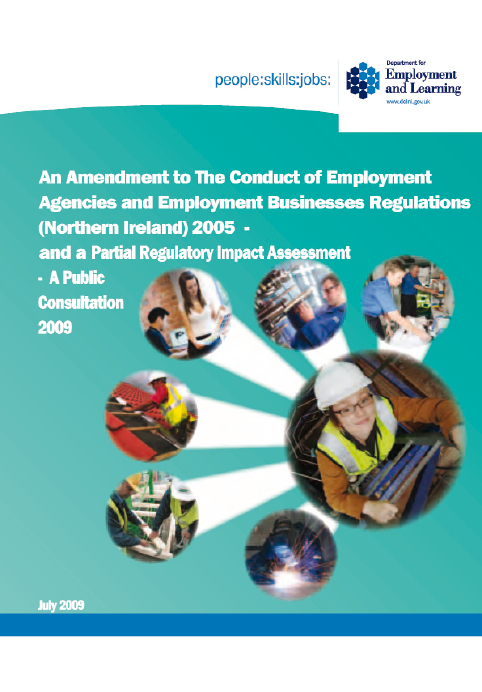
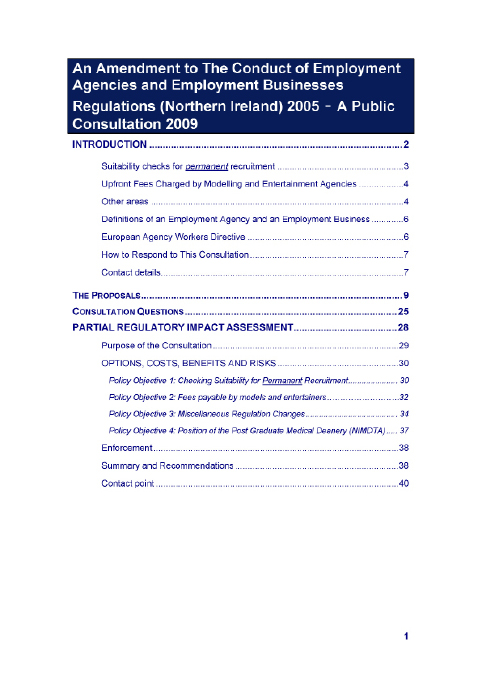
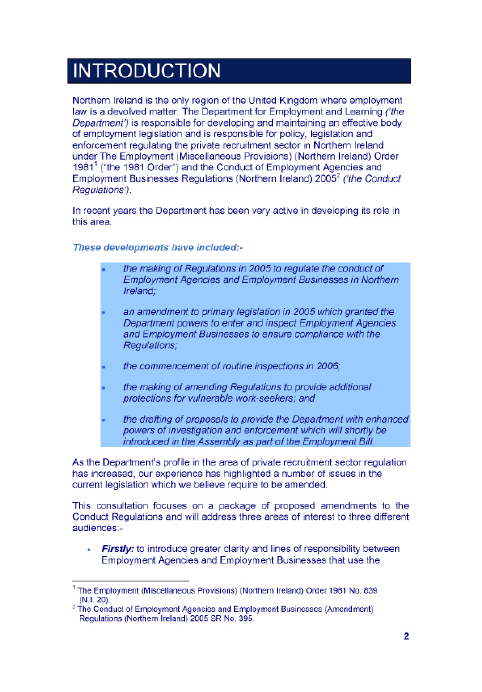
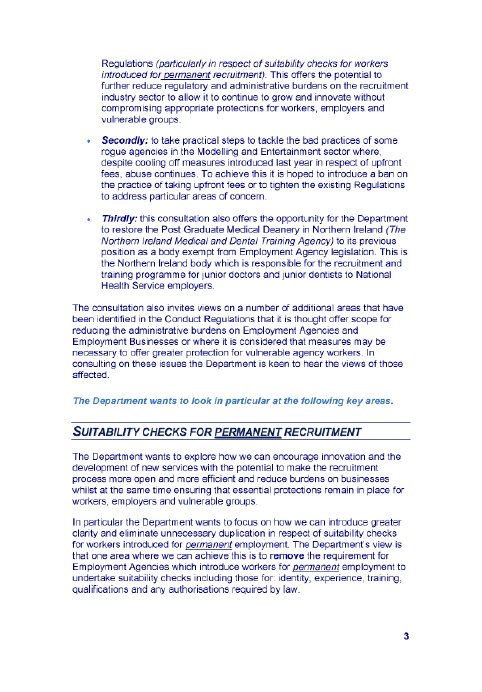
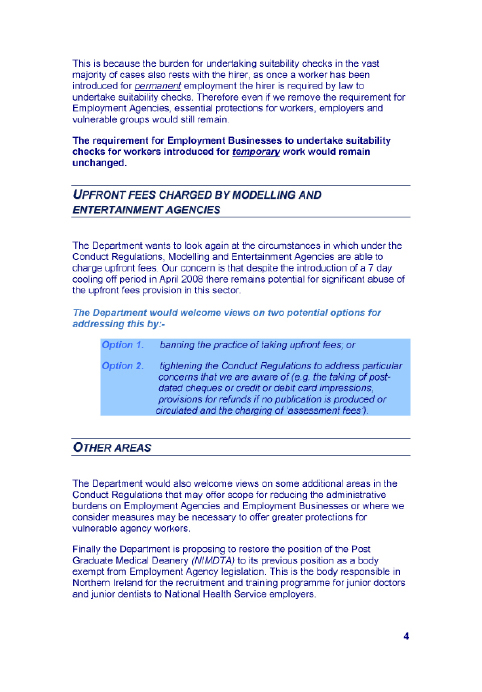
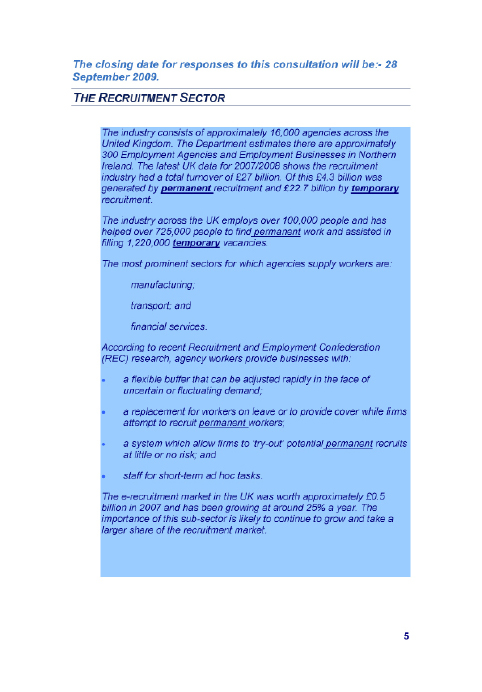
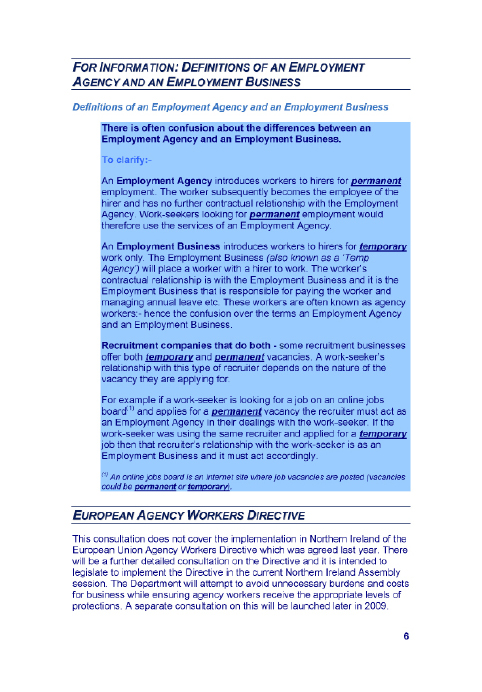
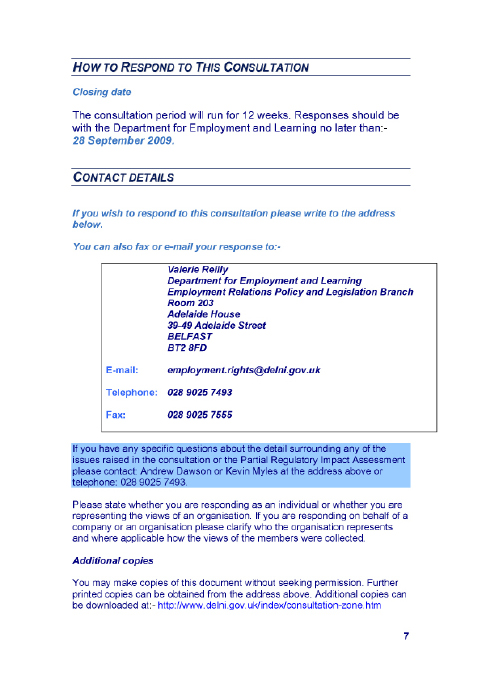

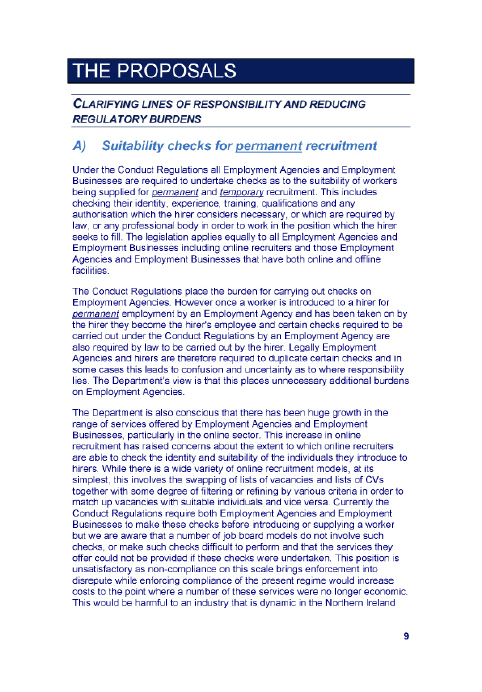
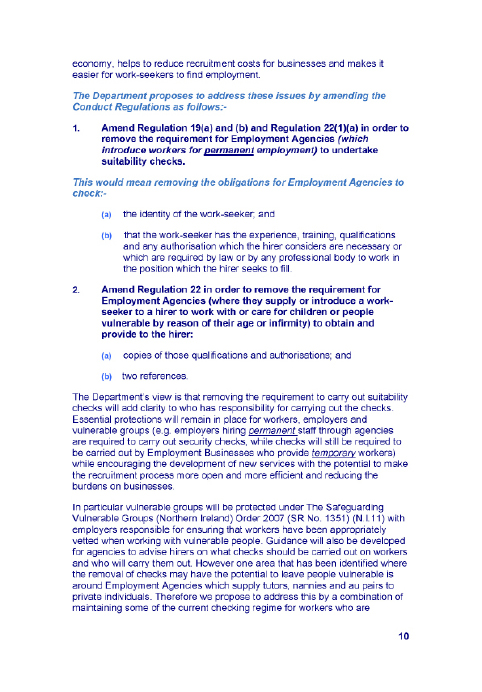
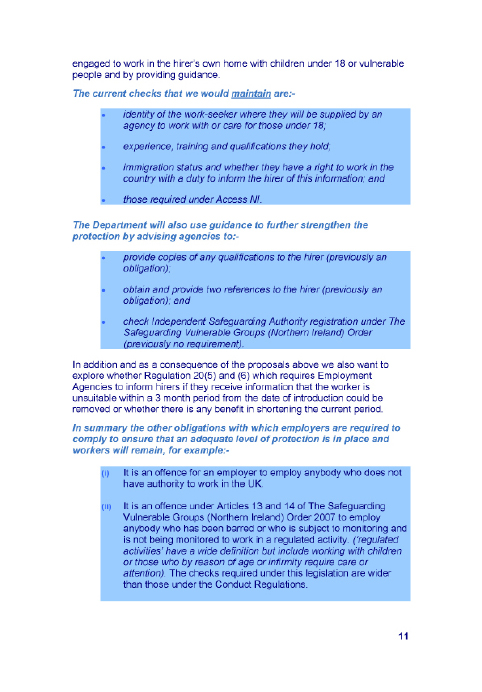
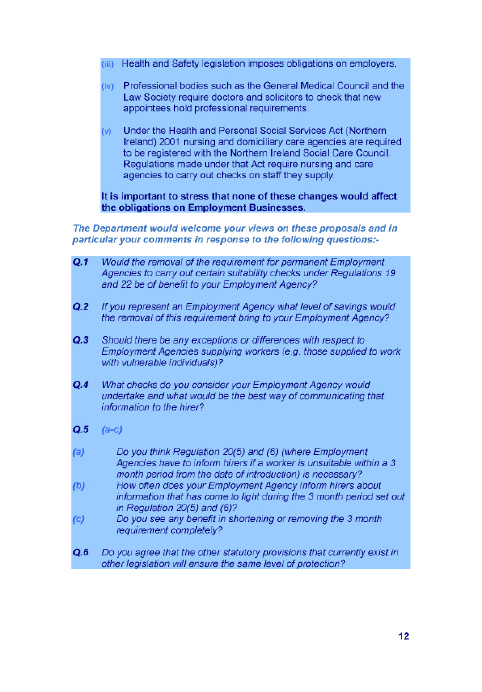
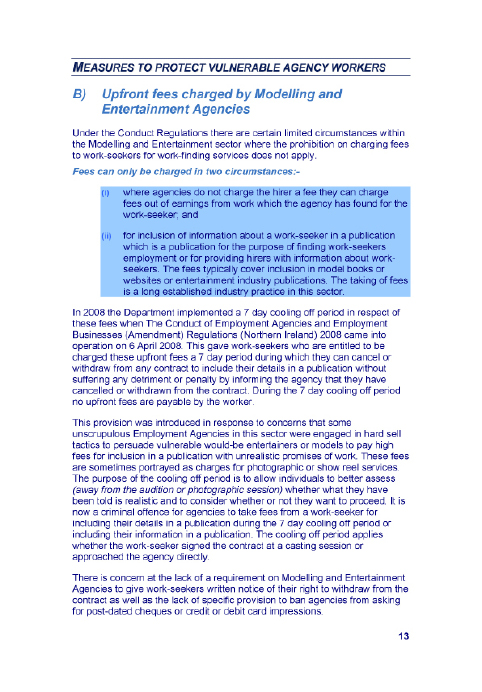
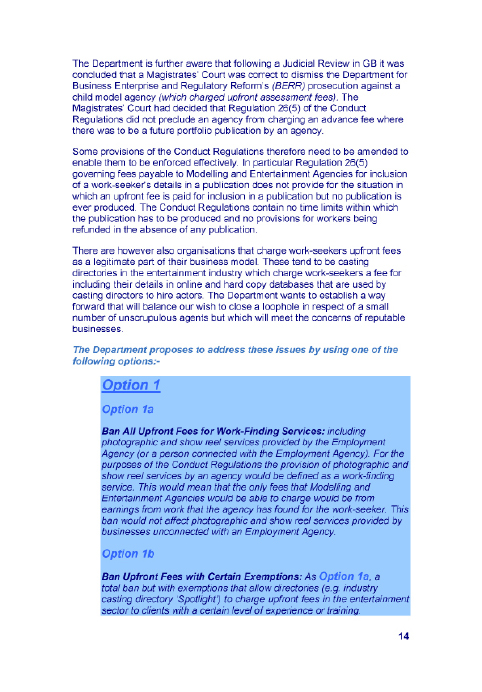

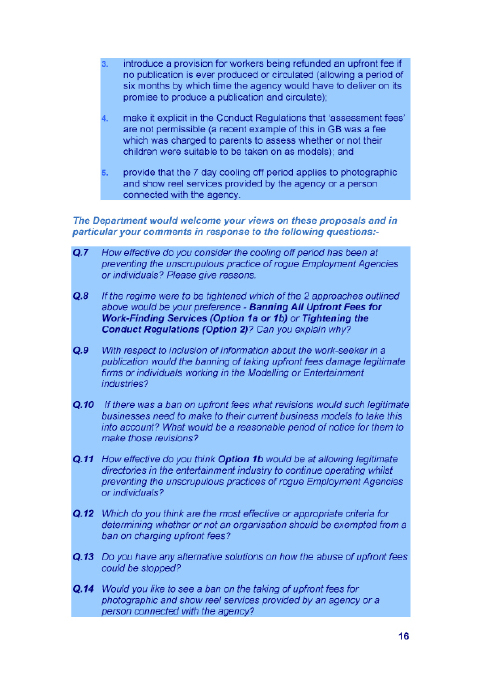
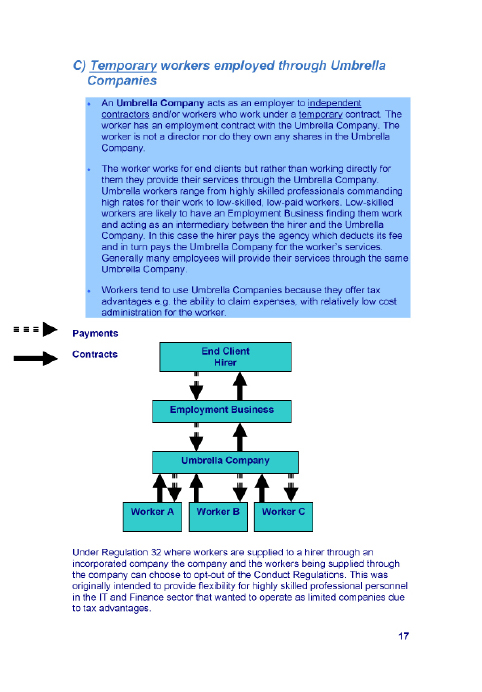
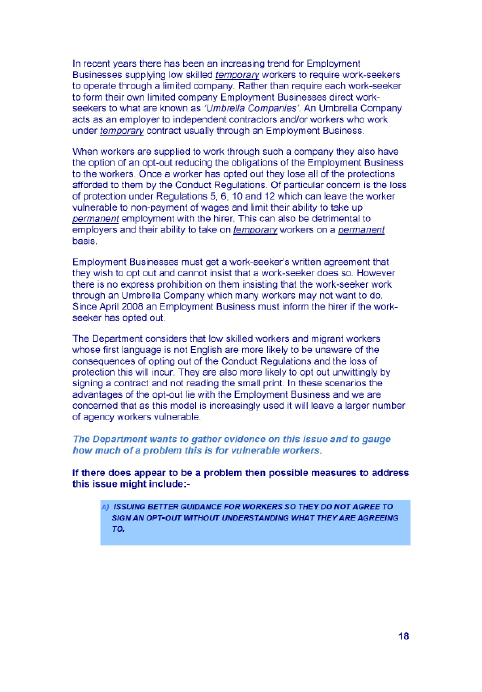
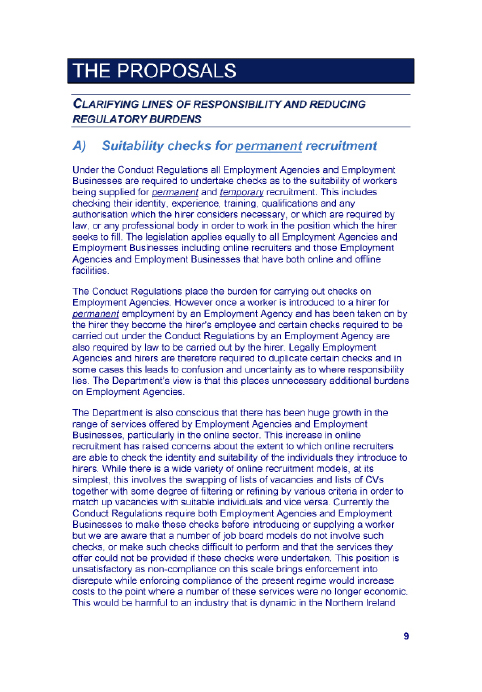
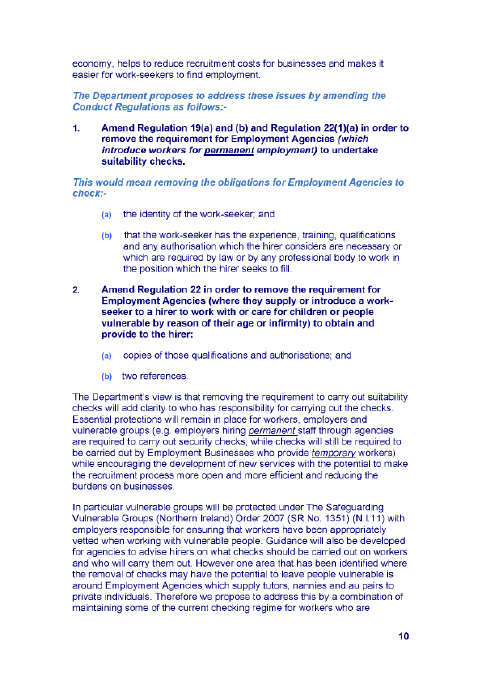
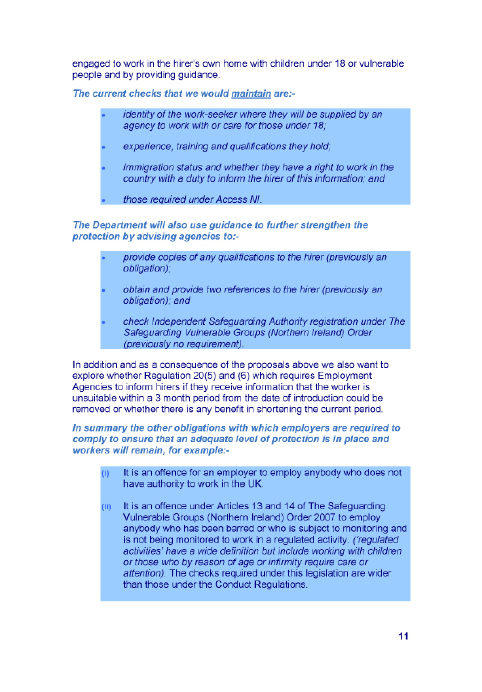
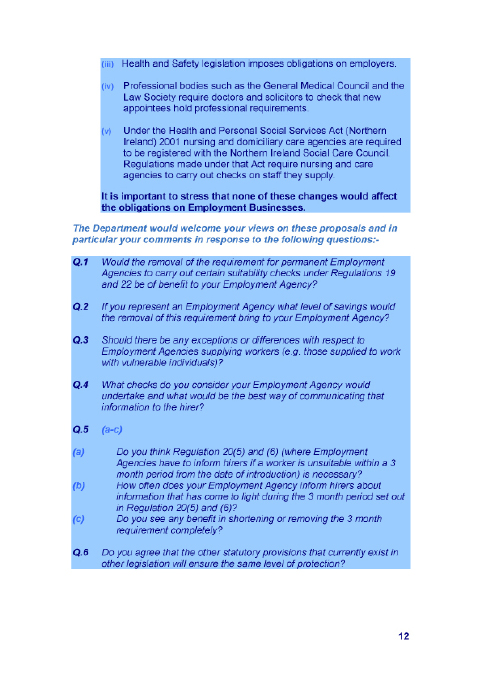
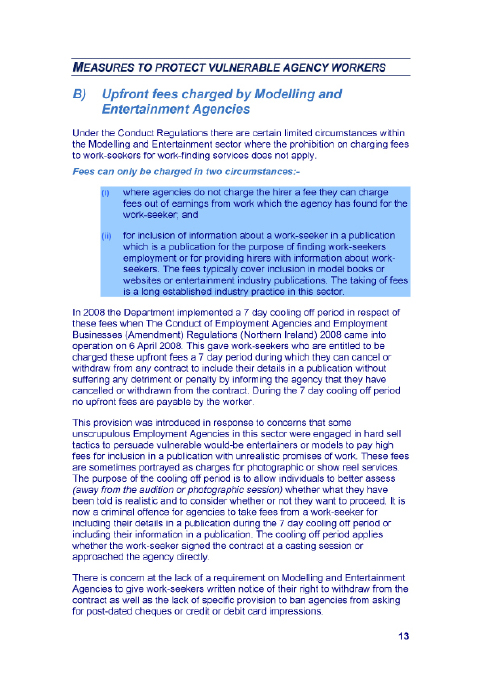
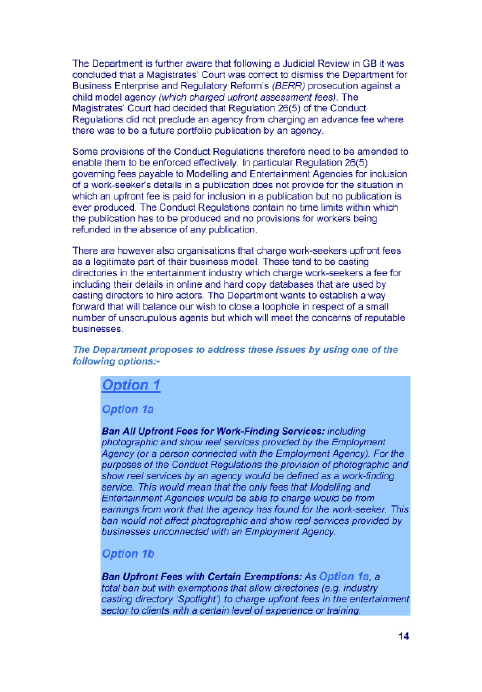

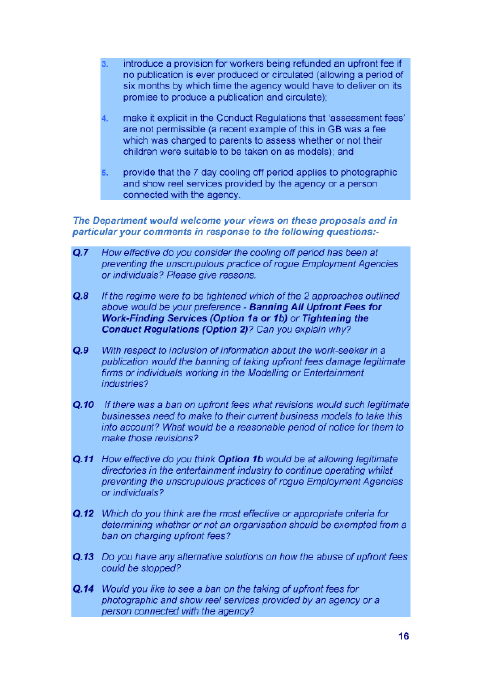
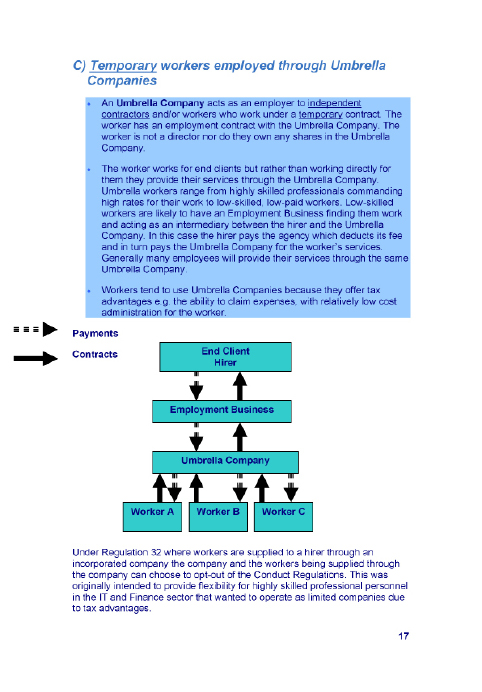
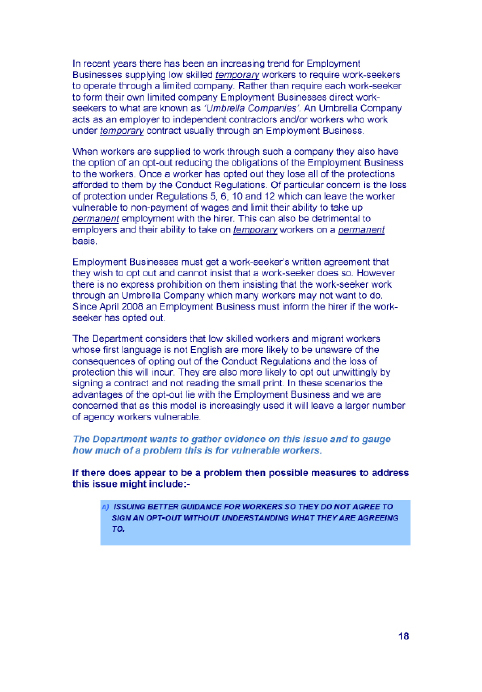
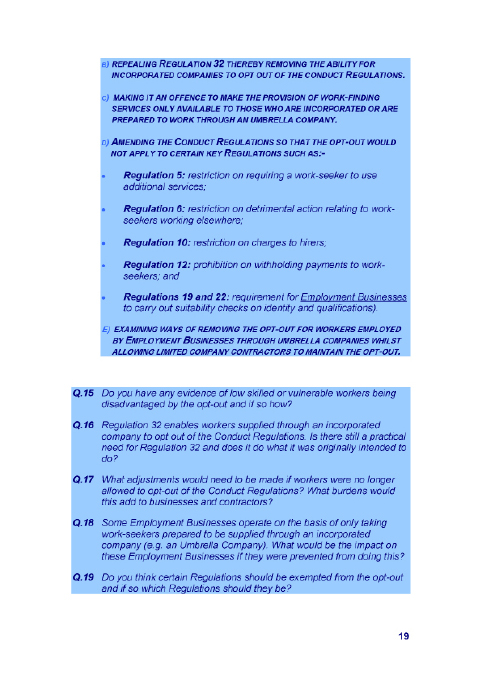
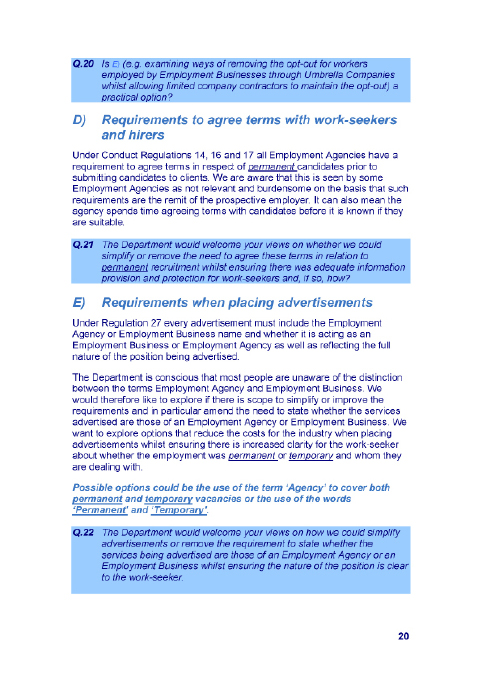
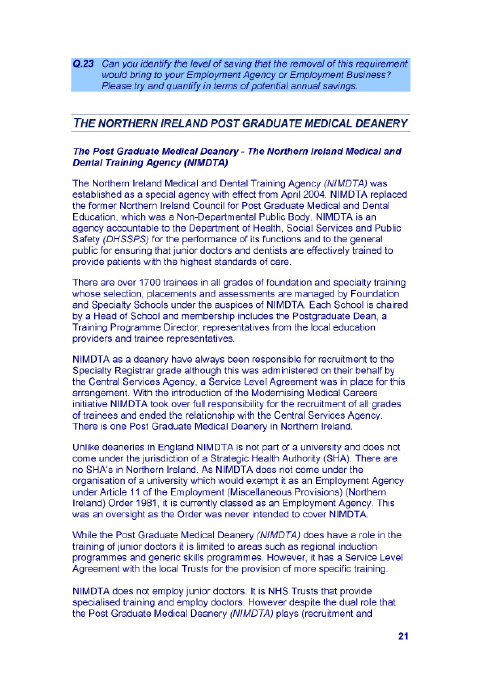
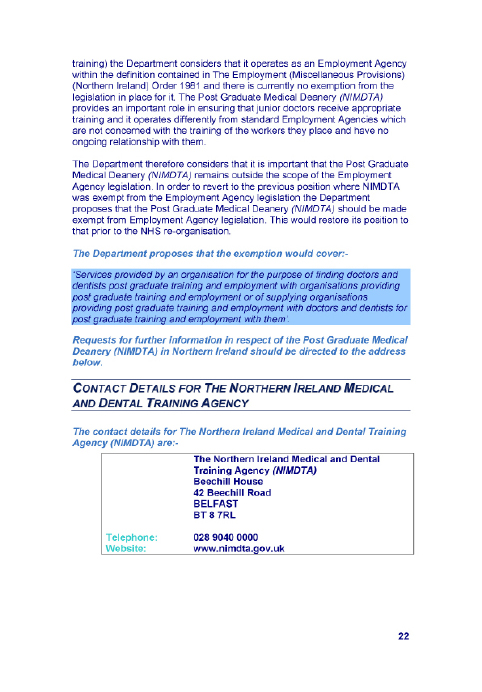


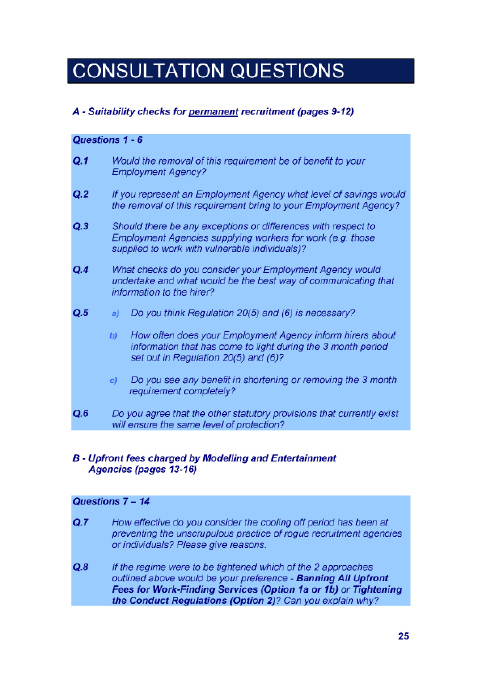
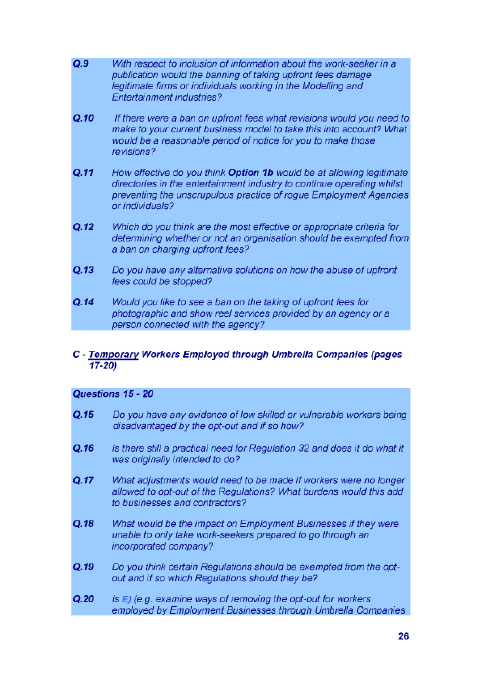
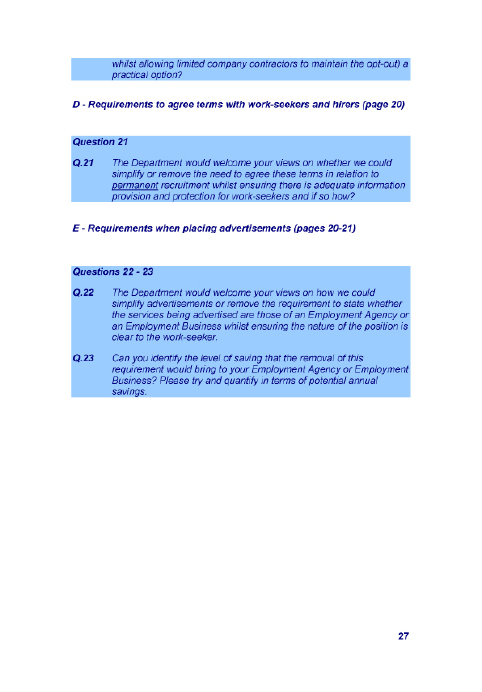
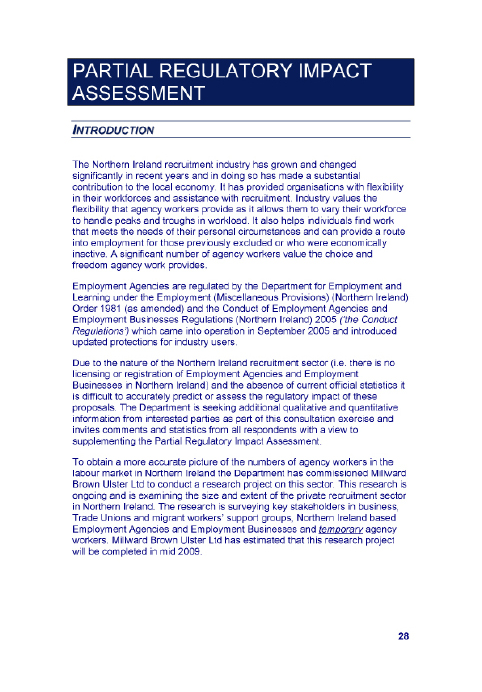
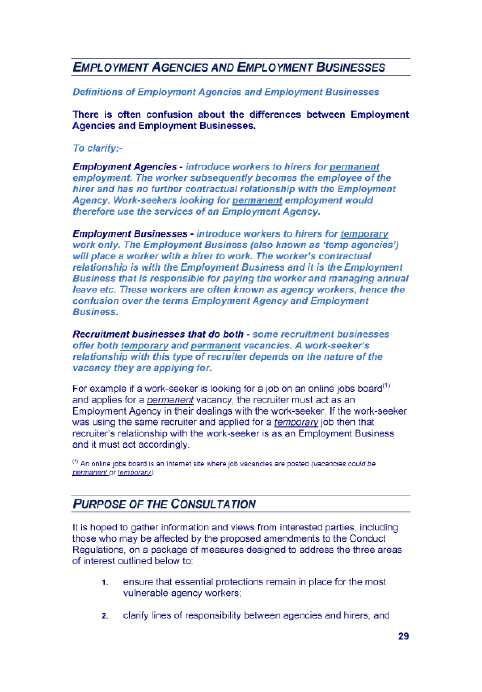
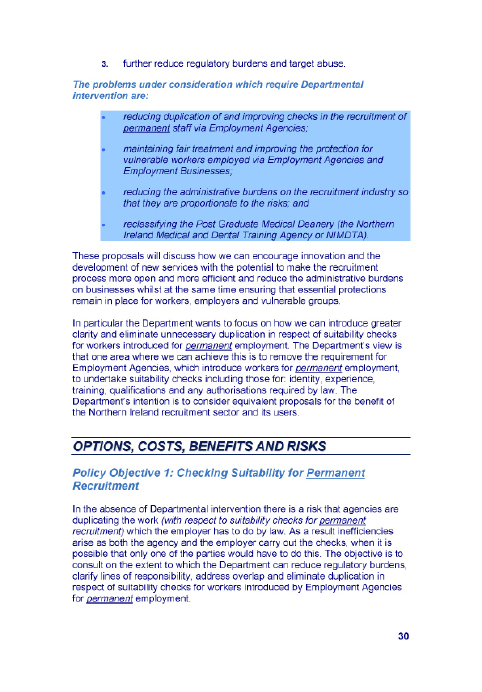
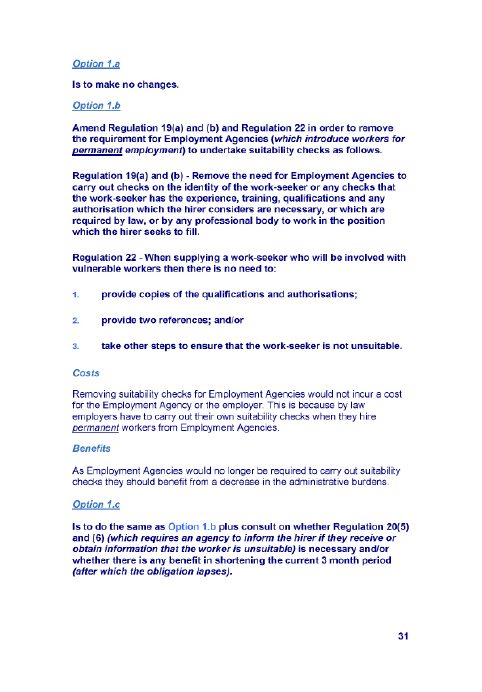
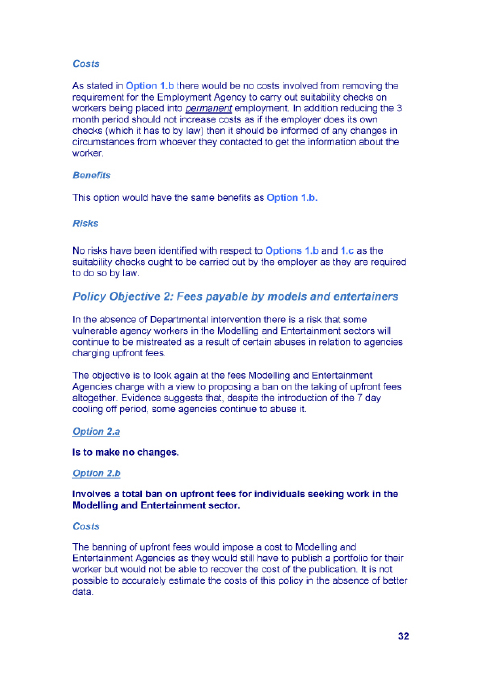
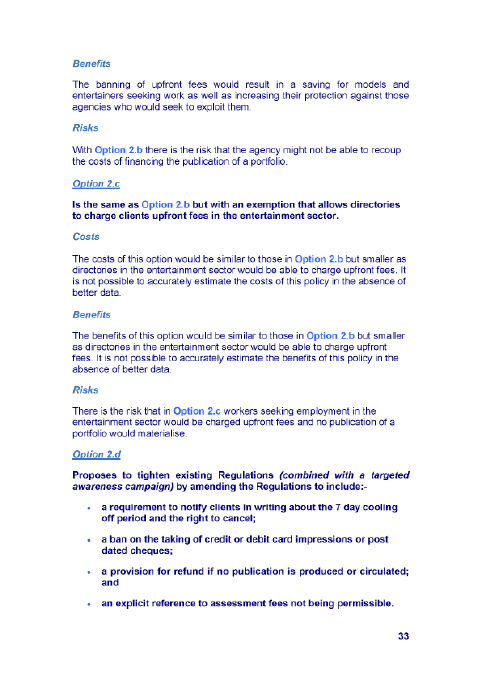
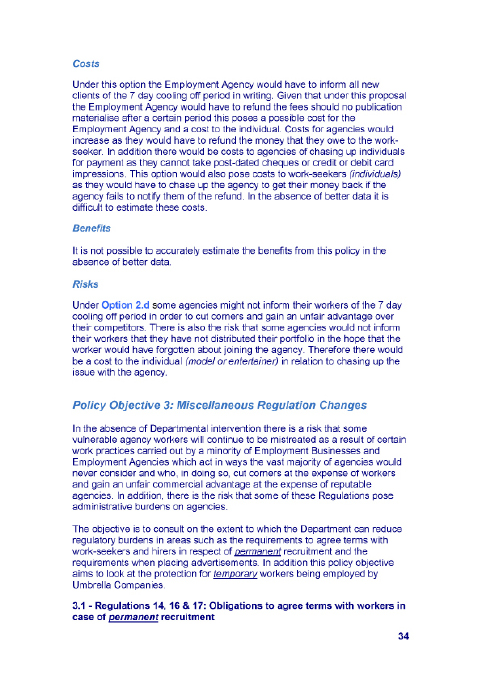
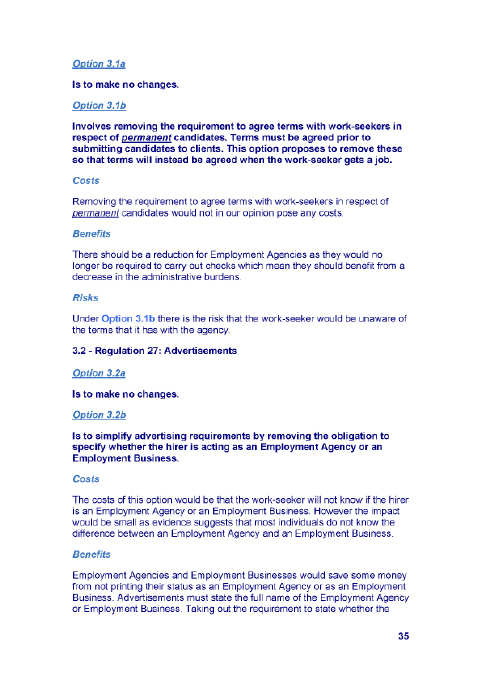
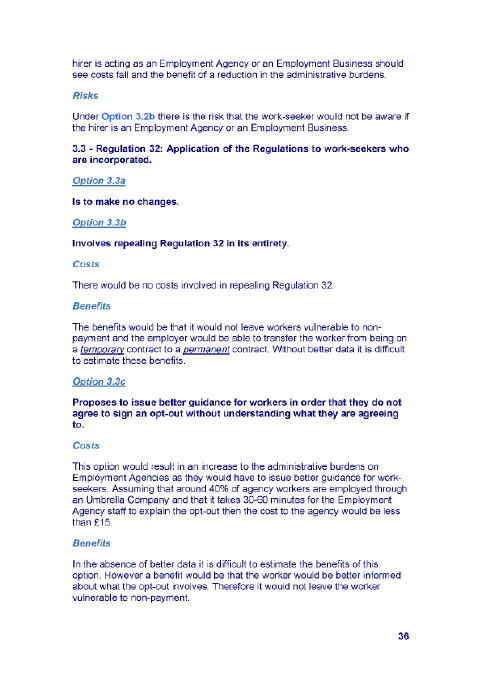
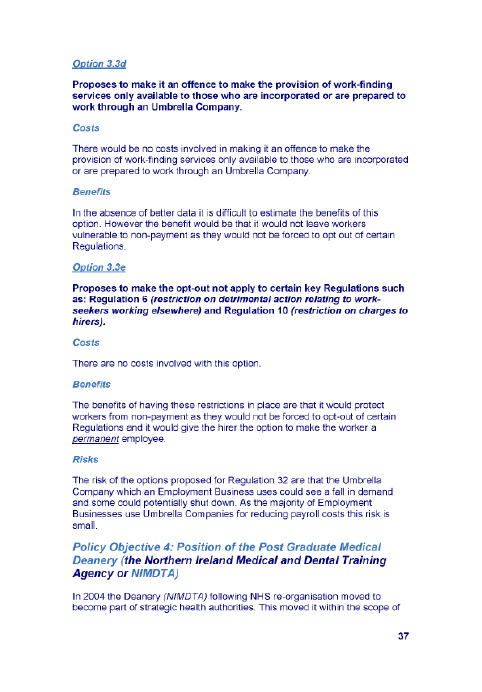
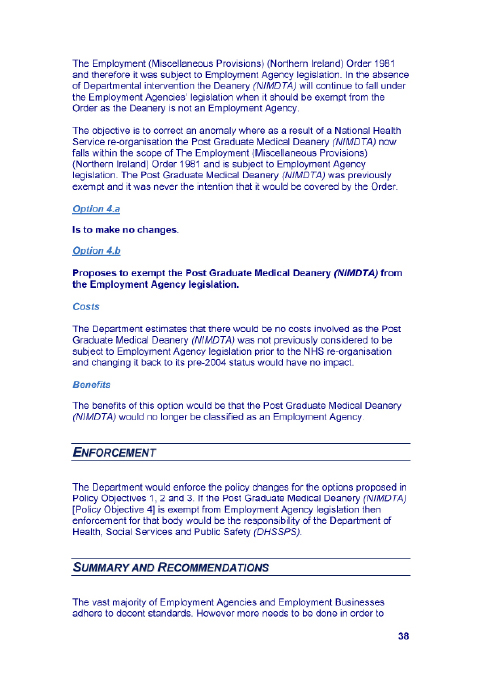
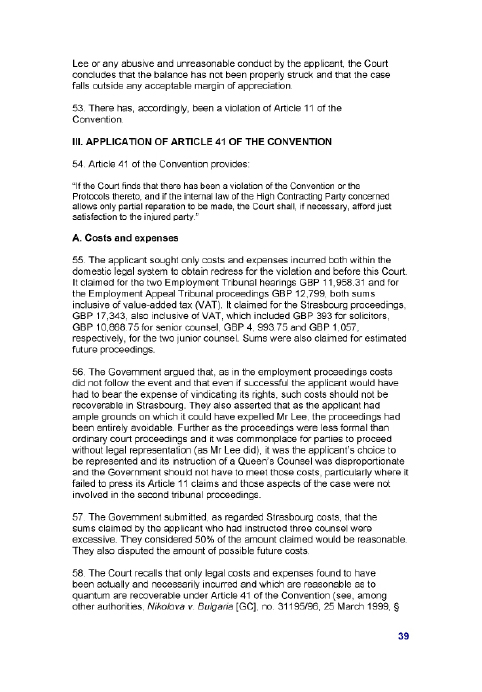
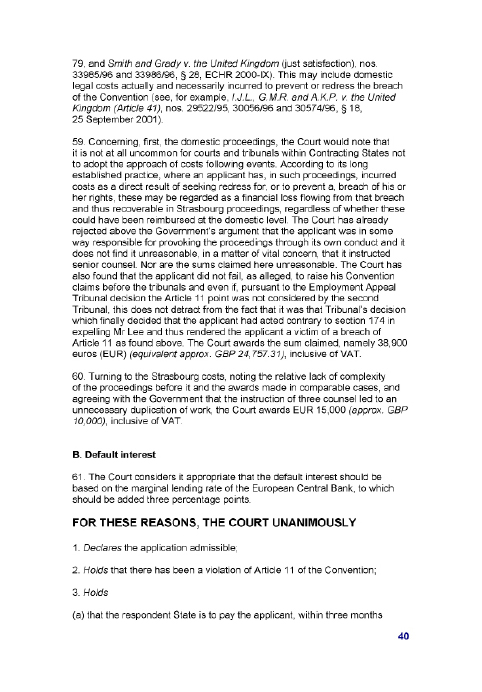

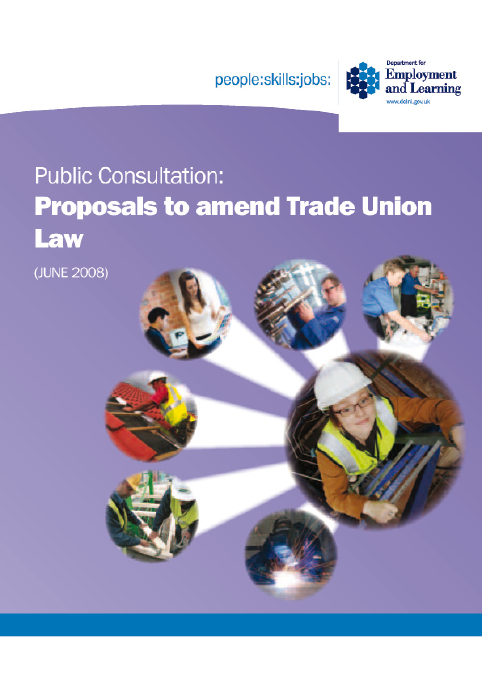
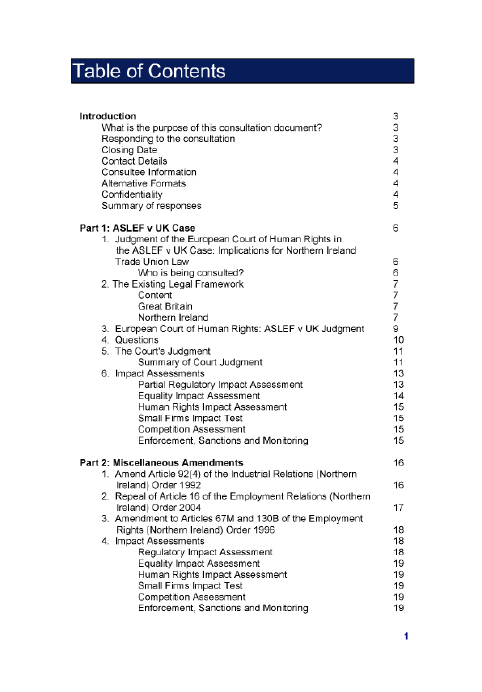

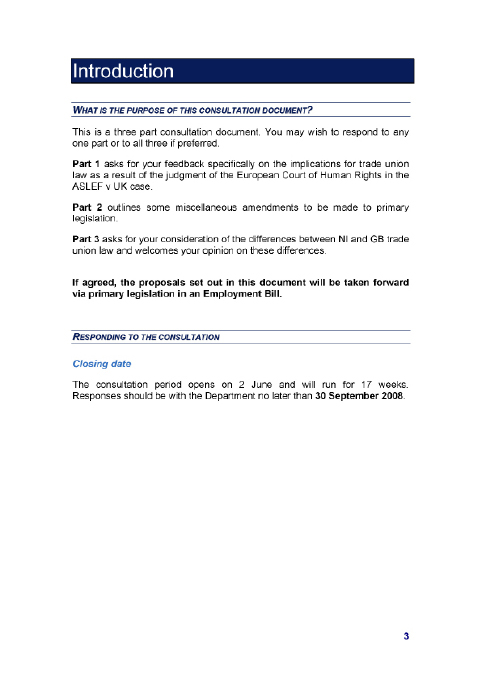
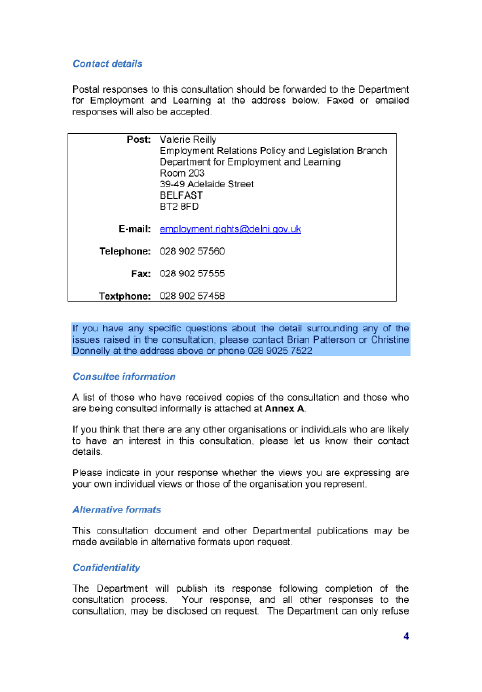
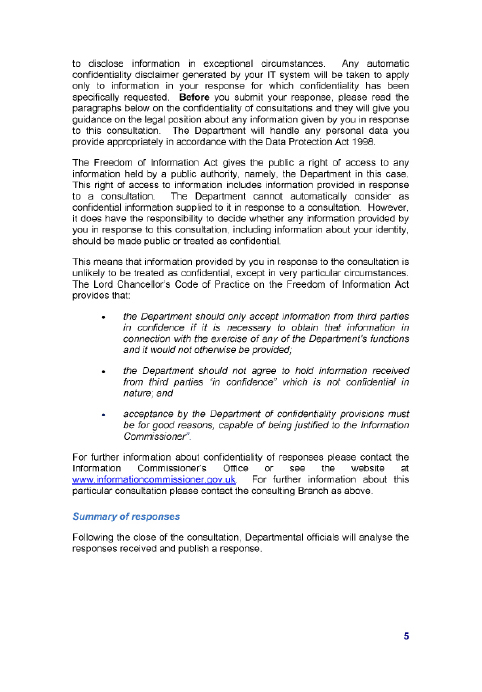
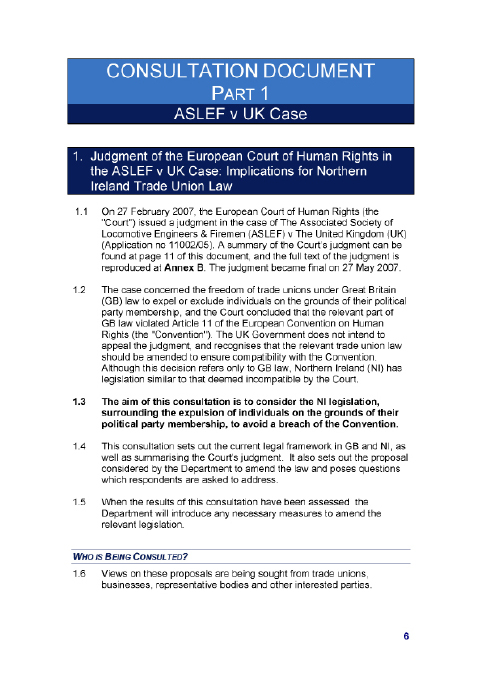
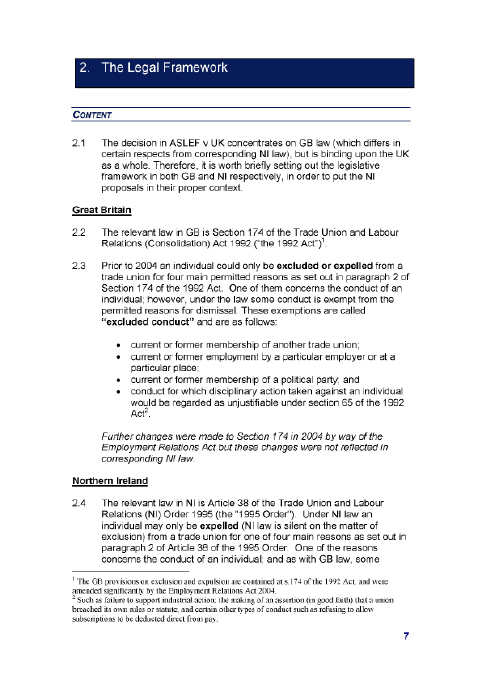

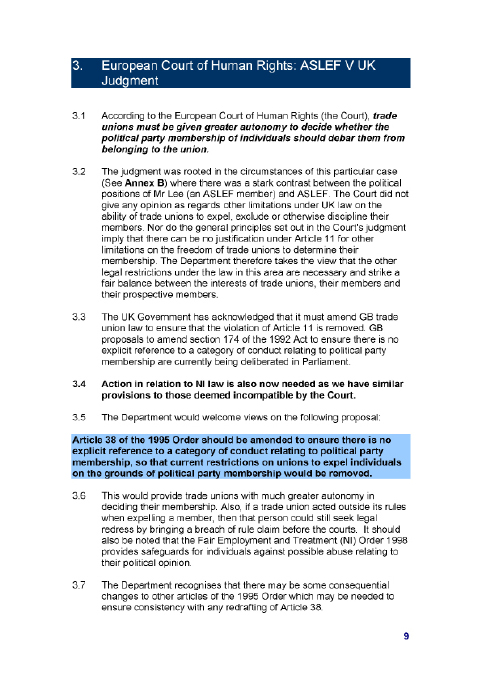
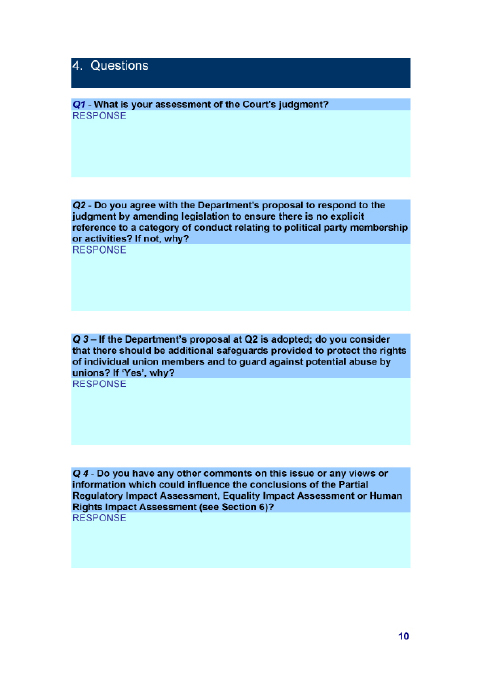
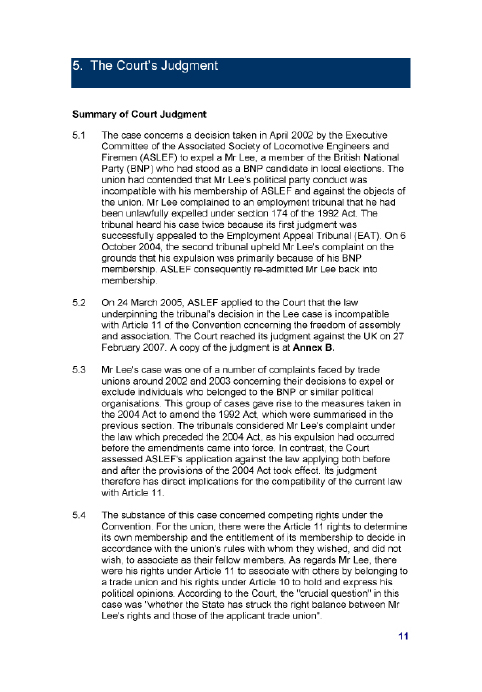
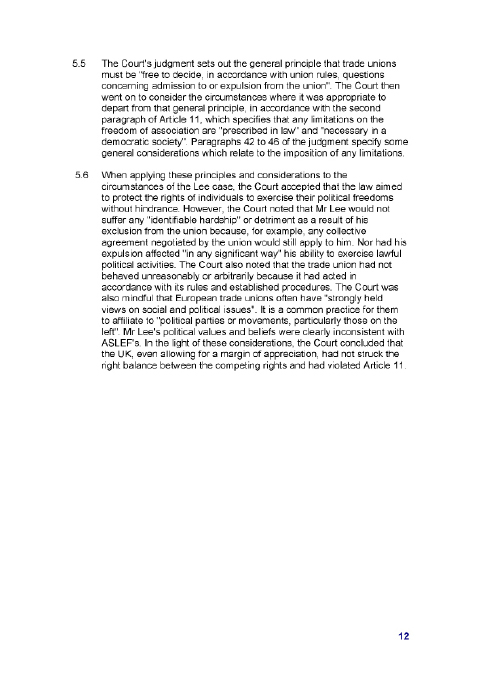
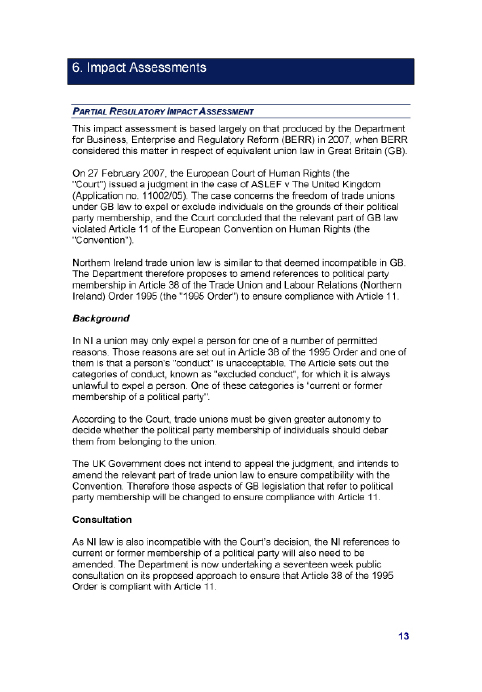
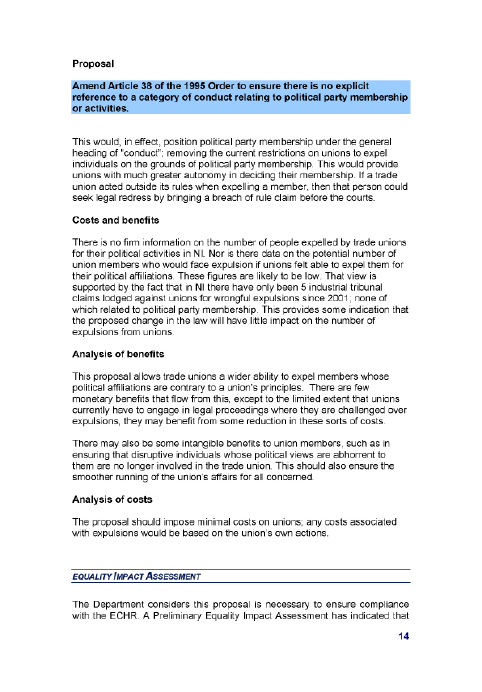
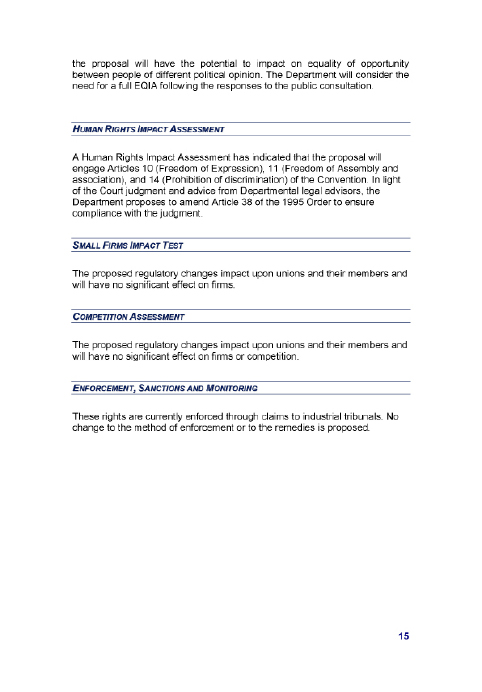
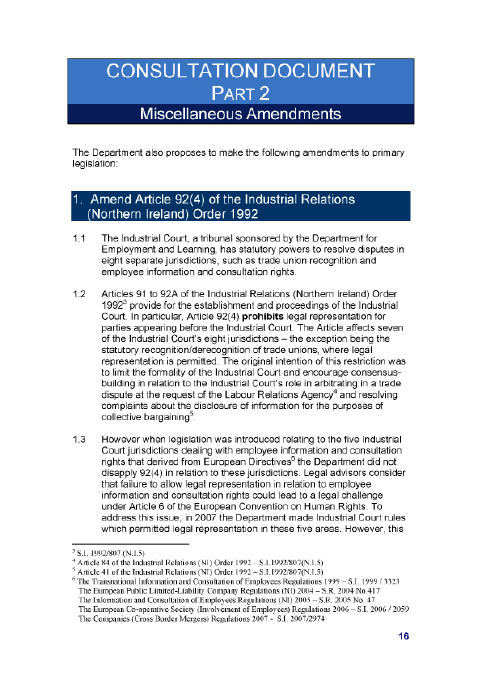
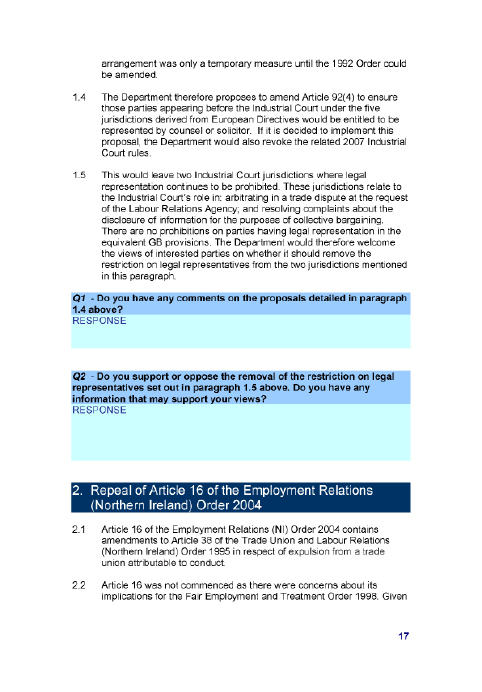
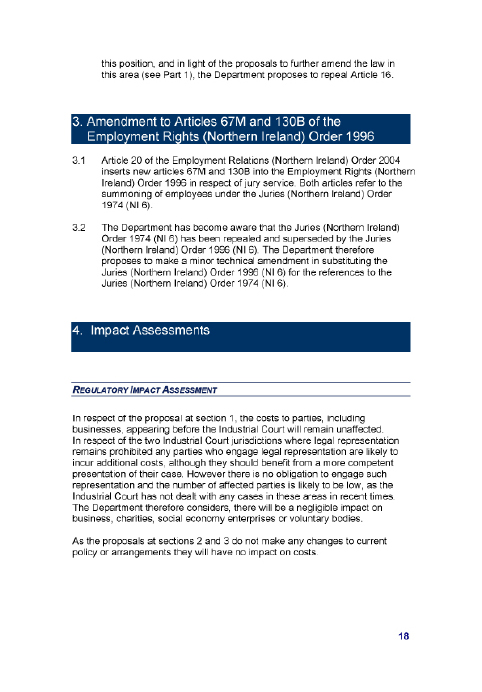
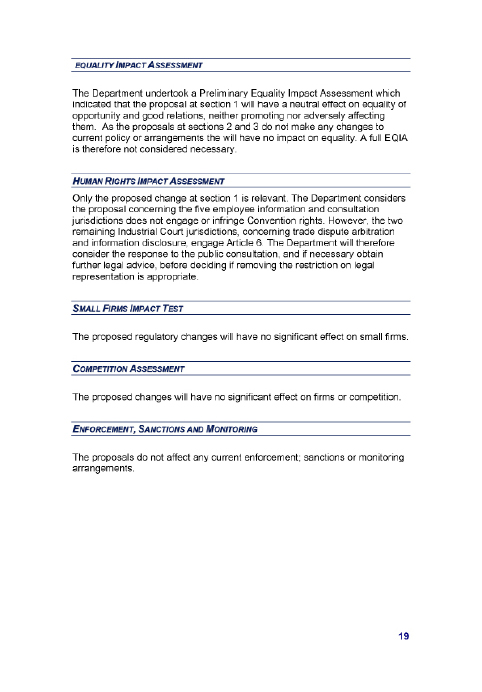
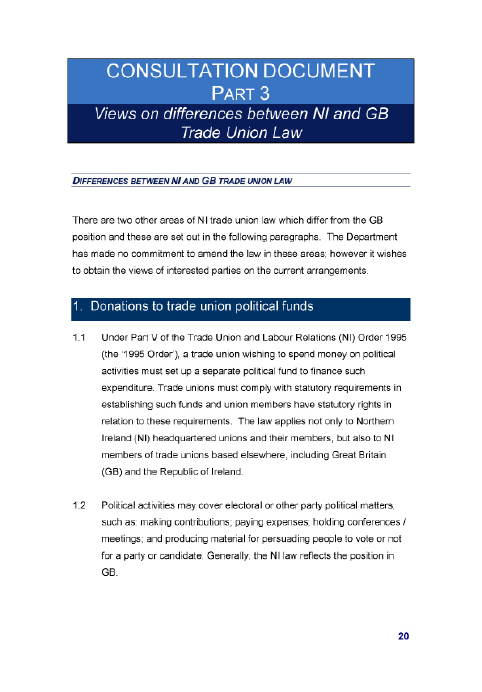
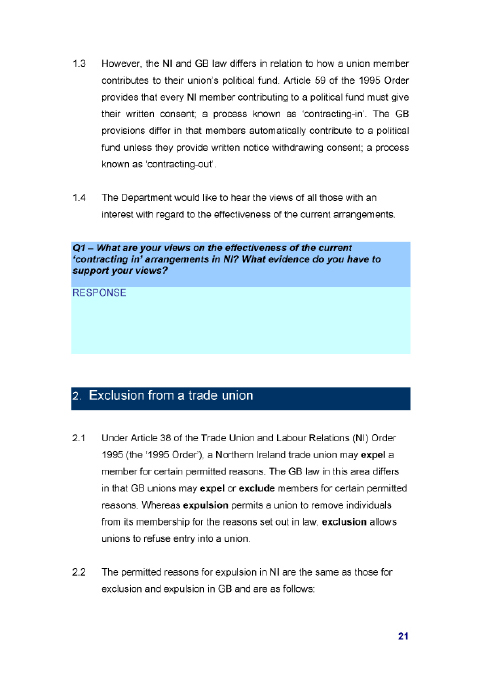
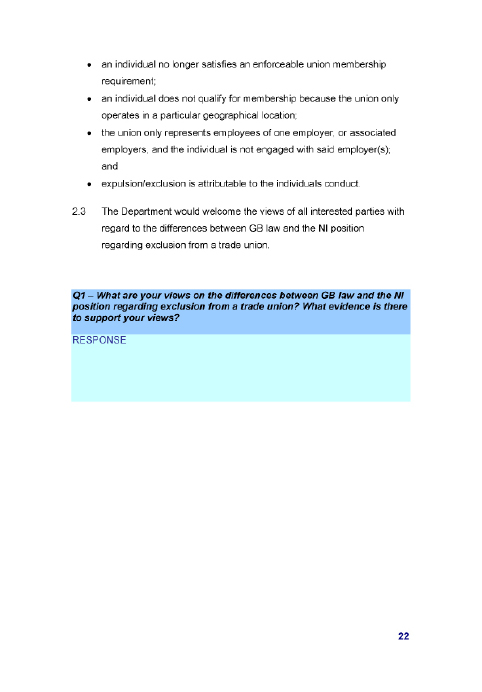
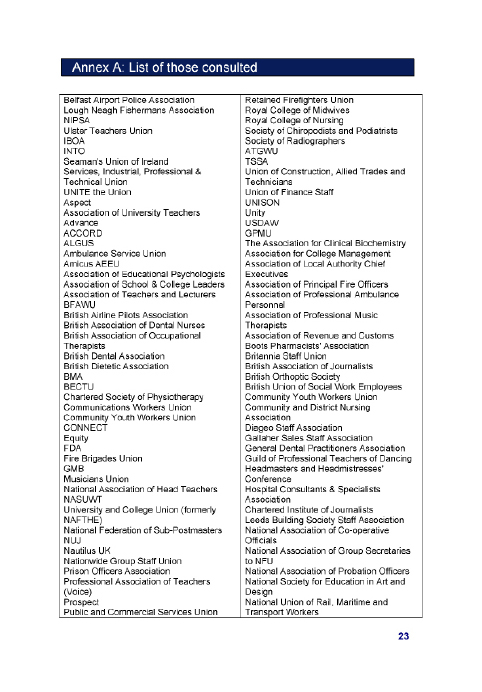
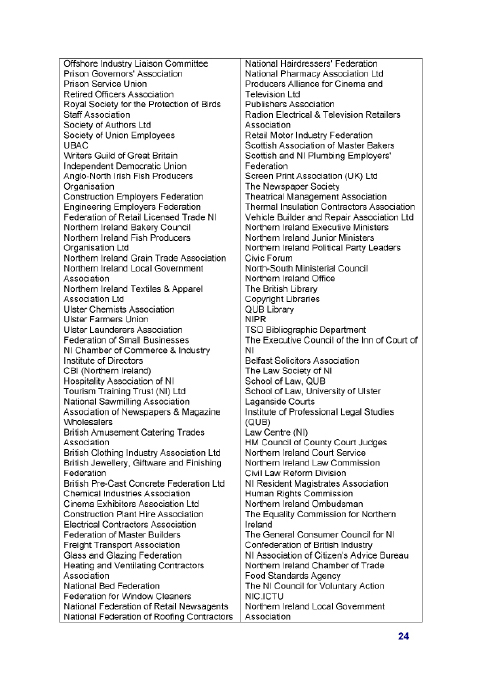
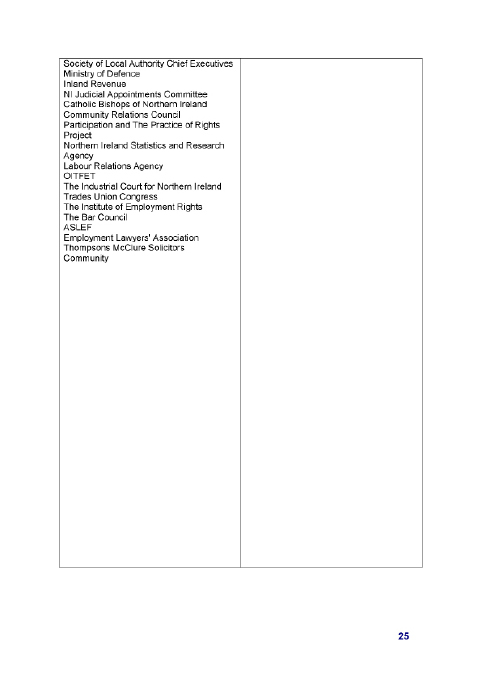
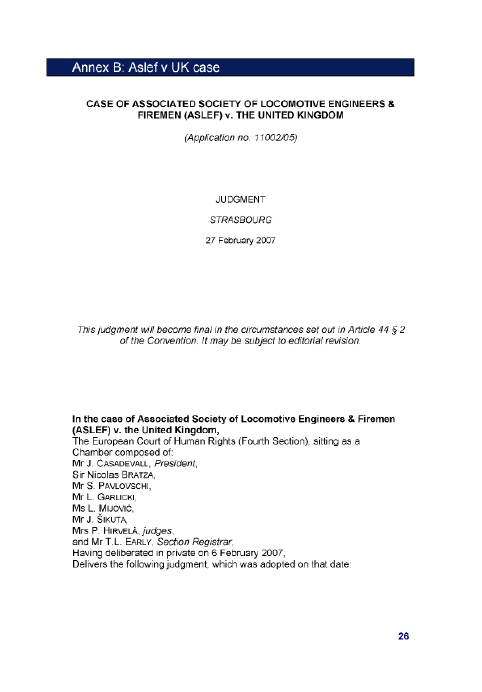
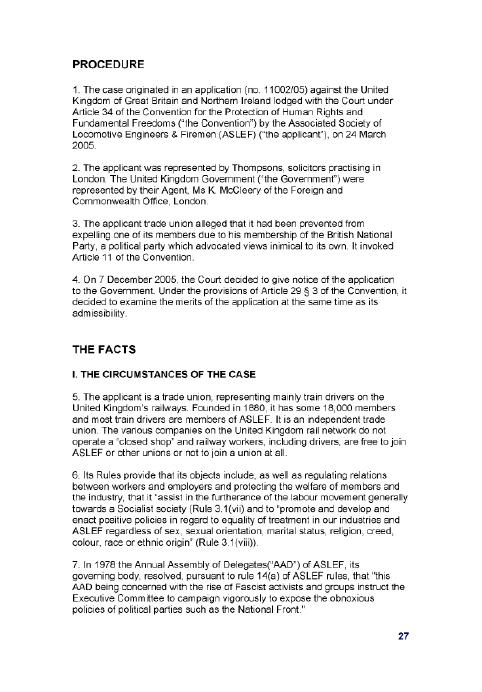
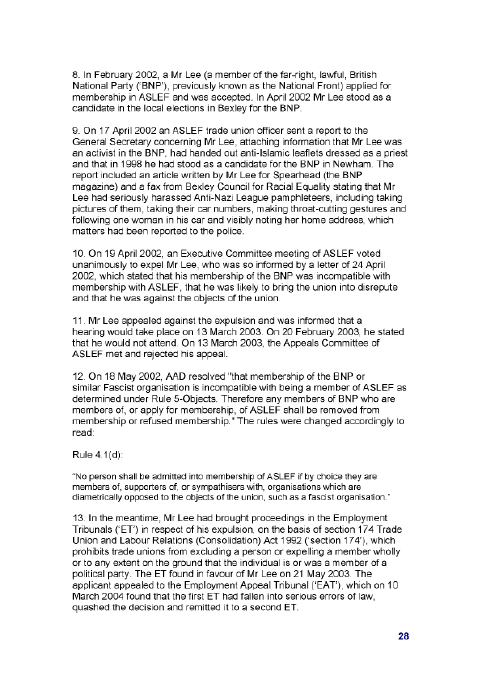
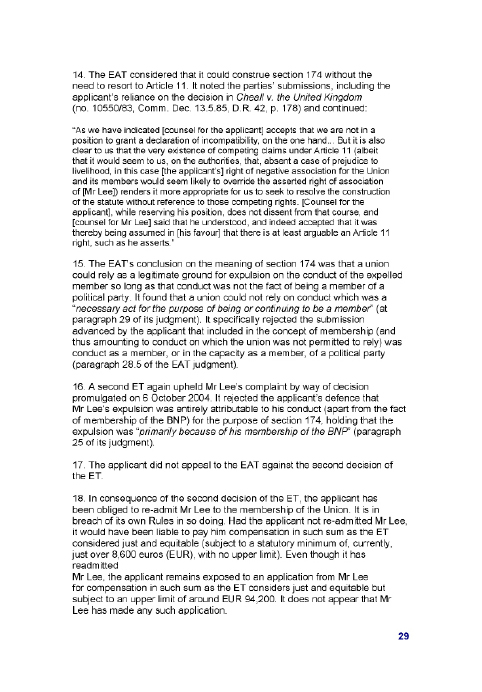
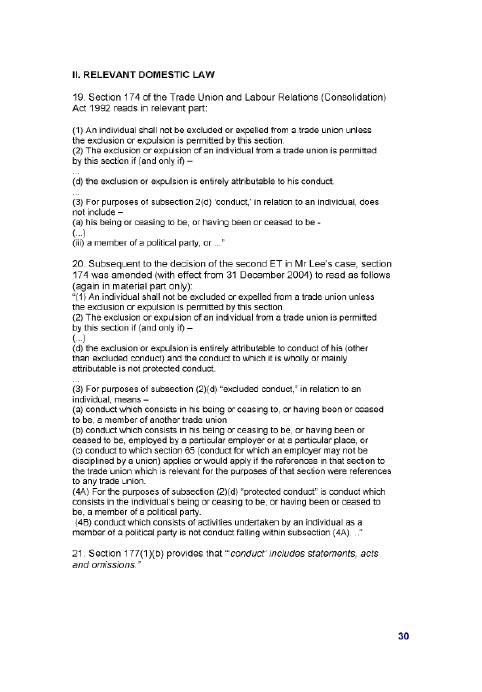
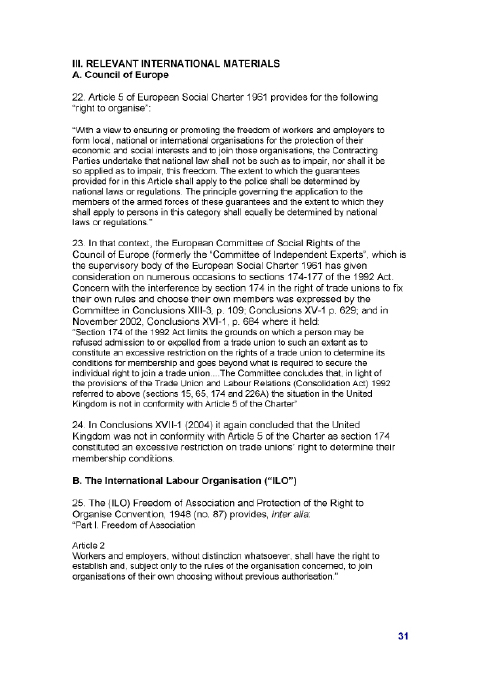
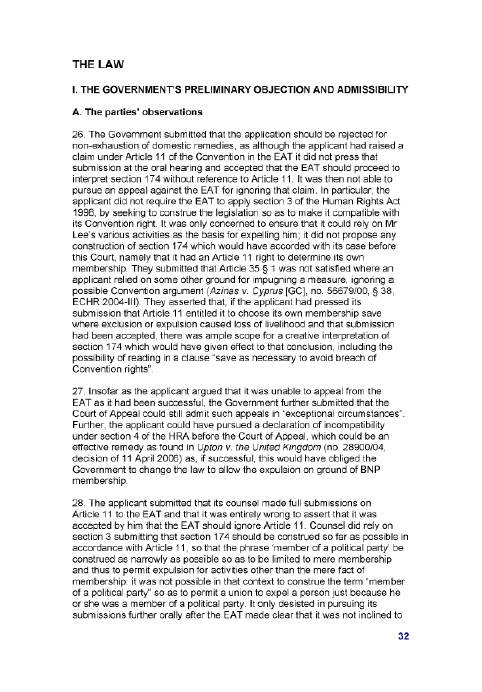
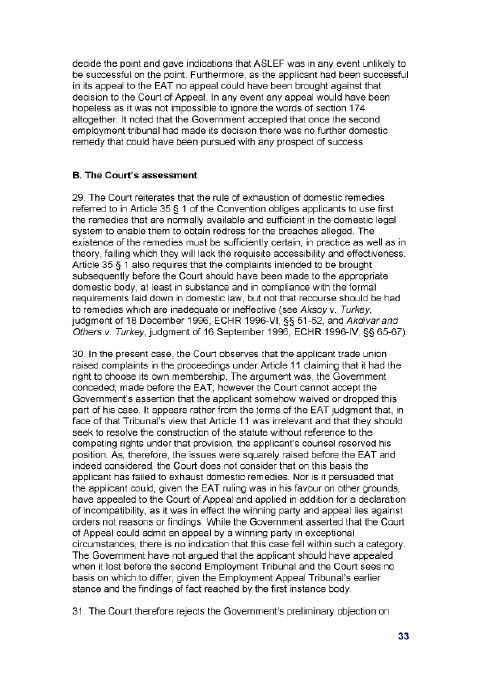
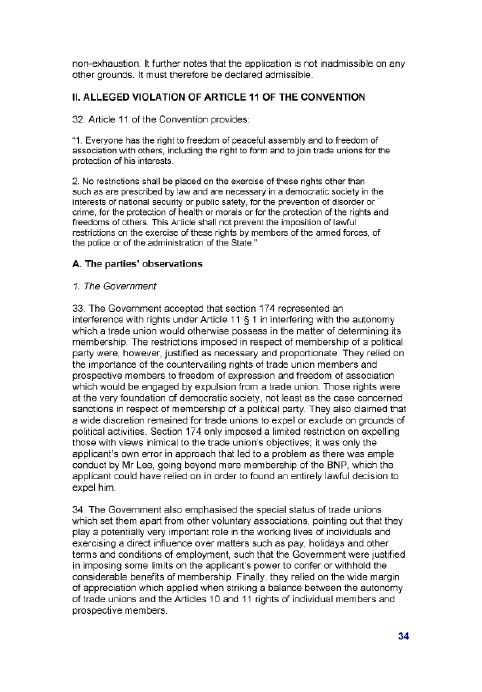
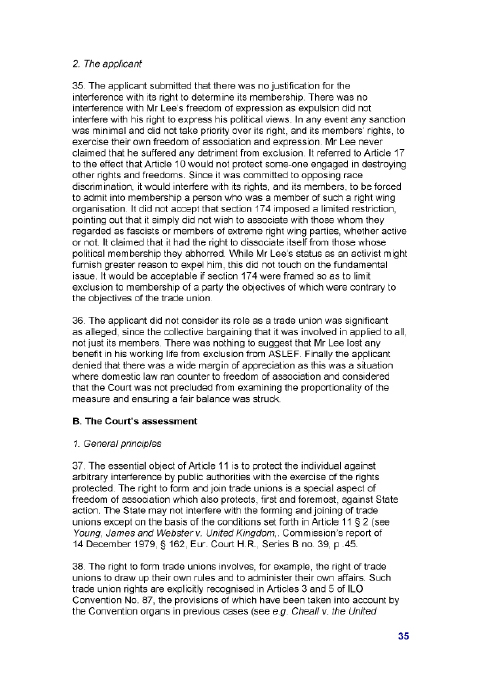
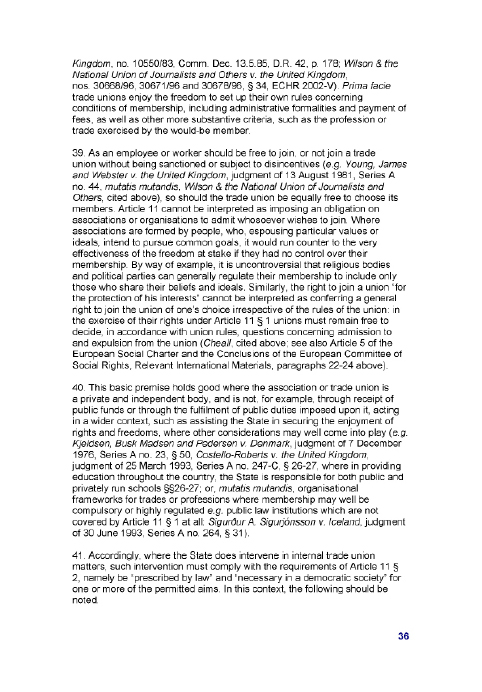
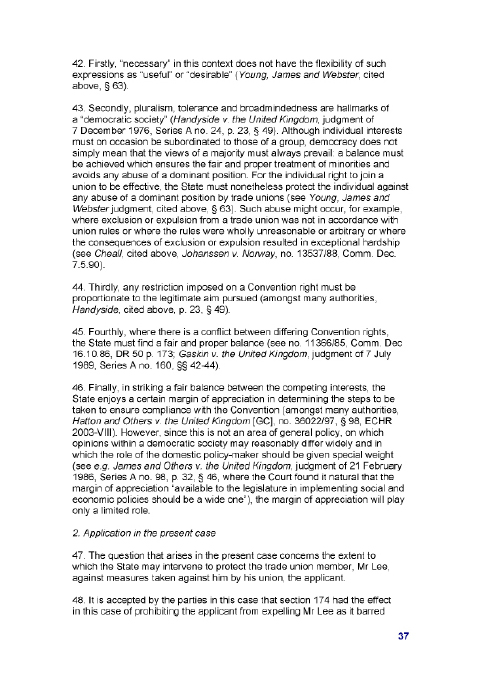
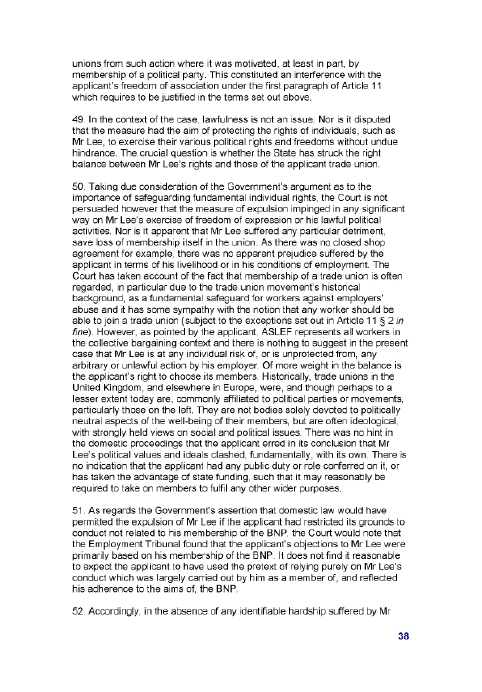
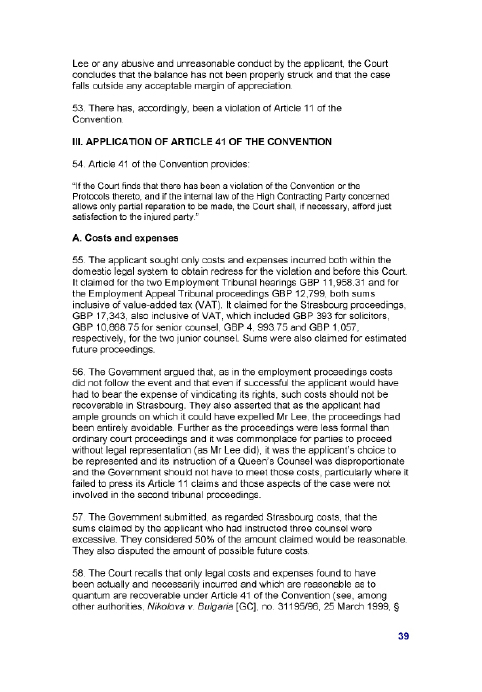
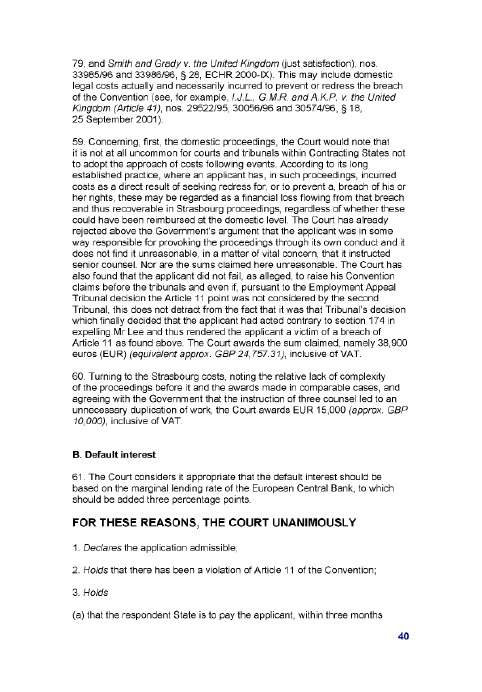

Summary of Responses to
Consultation Documents

Adelaide House
39-49 Adelaide Street
BELFAST
BT2 8FD
Committee Clerk
The Committee for Employment and Learning
Northern Ireland Assembly
Parliament Buildings
Stormont
BELFAST
BT4 3SW 20 November 2008
Dear Peter
Employment Bill: Summary of Responses to Public Consultations on Policy Proposals
Please find attached the Department’s summary of responses to the following two consultations:
- Proposals to amend Trade Union Law (Annex A); and
- Employment Agencies and Businesses: Proposed changes to investigation powers and penalty regime (Annex B).
Both consultation periods ended on 30 September 2008. In line with legislative guidance, copies of these documents were forwarded to the Committee in June, prior to the commencement of the consultation.
The Department would welcome the Committee’s views before the Department publishes its full response documents.
Yours sincerely
Departmental Assembly Liaison Officer
Annex A
Summary of Responses
Amendments to Trade Union Law
1. At the closing date of consultation the Department had received 13 responses; 9 of which were substantive. These were from: the Alliance Party; The Association of School and College Leaders (ASCL); Irish National Teachers Organisation (INTO); Labour Relations Agency (LRA); Law Reform Committee; Law Society of NI ; Northern Ireland Committee – Irish Congress of Trade Unions; Thompson McClure Solicitors and an anonymous individual.
Amendment to the Trade Union and Labour Relations (NI) Order 1995 to address the ASLEF decision
2. Currently an individual may not be expelled from a trade union other than for certain permitted reasons one of which is conduct. However conduct does not include membership of a political party and therefore an individual may not be expelled for membership of a political party. This was at the heart of the European Court of Human Rights decision in the ASLEF v UK case; following the expulsion of a union member who was a member of the British National Party. An earlier tribunal case had found in favour of the union member in that his expulsion was because of his BNP membership and therefore unlawful. However the European Court of Human Rights supported the union, ASLEF, and ruled that UK law breaches Article11 of the European Convention on Human Rights -the right of freedom of Assembly and Association. The Court also commented ‘’for the individual right to join a trade union to be effective, the state must nonetheless protect the individual against any abuse of a dominant position by trade unions. Such abuse might occur, for example, where exclusion or expulsion from a trade union was not in accordance with union rules or where the rules were wholly unreasonable or arbitrary or where the consequences of exclusion or expulsion resulted in exceptional hardship". The UK government acknowledged that it must amend GB trade union law to ensure that the violation of Article 11 was removed. NI has corresponding legislation contained within Article 38 of the Trade Union and Labour Relations (NI) Order 1995.
3. The consultation document contained a proposal to amend Article 38 by removing the reference to ‘current or former membership of a political party’ from the list of excluded conduct. This approach was intended to give trade unions greater autonomy in deciding their membership and was in line with BERR’s proposals.
4. Of the eight responses to this proposal:
- the Alliance Party and ASCL agreed with the Department’s proposal;
- The Law Reform Committee commented that the proposal was ‘sound’ but added that that further safeguards were required; and The Law Society requested that the proposals be reviewed to include safeguards to prevent abuse;
- Both Thompson McClure Solicitors and NIC-ICTU opposed the Department’s proposal, reiterating their view that Article 38 is convoluted and confusing, and should be repealed. Both respondents believe there is sufficient means for an aggrieved (trade union) member to seek legal redress for an expulsion by bringing a breach of rule claim before the courts or complaining to the Certification Office;
- The INTO return showed a misunderstanding of the proposal stating that the removal of the reference to ‘current or former membership of a political party’ from the legislation would lead to a situation where an individual could no longer be expelled as a result of their current or former membership of a political party- in fact the opposite applies;
- An anonymous respondent disagreed with the Department’s proposal on the grounds that, as a result, Trade Unions will be allowed to pick and choose their membership based on political party membership.
5. BERR had originally planned to make similar amendments as outlined in paragraph 3; however during the passage of the Bill, particularly through the House of Lords, substantial amendments were made. In effect BERR reverted from favoured Option A to Option B as detailed in their consultation document (see Annex C). BERR has now retained the reference to ‘current or former membership of a political party’ and has further amended the GB Bill to include additional safeguards to protect the rights of individual union members and to guard against potential abuse by unions.
6. Our consultation also asked for views on additional safeguards. Of the seven respondents who commented on this question:
- INTO, Law Society of NI, Law Reform Committee and an anonymous individual believed that there should be additional safeguards provided to protect the rights of individual union members;
- The ASCL argued that additional safeguards were not necessary as existing legislation is adequate. Similarly both NIC-ICTU and Thompson McClure Solicitors see no need for further legislation, stating that the Certification Officer’s jurisdiction for complaints of breaches of unions’ disciplinary rules works well and is explicitly designed to guard against abuse by unions.
7. The following options are now being considered:
(a) Do nothing: this approach does not address the Court’s judgment and would therefore leave the Department open to criticism from the Council of Europe’s Committee of Ministers. It also conflicts with legal advice from the Departmental Solicitor’s Office, which stated: “As a result of the ASLEF judgement trade unions are permitted, in principle, to expel individuals on the grounds of their membership of a political party - it follows Article 38 of the TULR Order should no longer provide a prohibition to the effect that membership be treated as ‘excluded conduct’. In so far as Northern Ireland law provides that expulsion on the basis of political party membership is unlawful it is in breach of Article 11 of the ECHR".
(b) Amend Article 38 by removing the reference to ‘current or former membership of a political party’ from the list of excluded conduct: this approach addresses the Court judgment in the ASLEF v UK case by providing trade unions with greater autonomy in deciding their membership. However it should be noted that this option, which was in line with the original BERR proposal, has since been amended in GB following debates during the progress of the GB Bill through Parliament. (See option (c) below).
(c) Replicate the current GB provisions by retaining the reference to ‘current or former membership of a political party’, and providing an exception where that membership is contrary to a rule or objective of the union, with additional safeguards: this approach also addresses the Court judgment in the ASLEF v UK case by providing trade unions with greater autonomy in deciding their membership. Following lengthy debate, particularly in the House of Lords, during the progress of the GB Bill through Parliament, BERR has adopted this approach and provided additional safeguards for union members. (Legal advice taken in 2004 indicated that replicating current GB provisions in their entirety may be incompatible with The Fair Employment and Treatment (Northern Ireland) Order 1998, which prohibits discrimination on the basis of political opinion. Further legal advice is currently being sought to clarify this situation)
(d) Repeal Article 38 in its entirety: this approach would provide trade unions with complete autonomy in deciding their membership. However, BERR is of the view that it is wrong to assert from the Court’s judgment that the corresponding Section 174 in its entirety is incompatible with the European Convention on Human Rights. BERR considers it more prudent to interpret the Court’s judgment as requiring changes only to those provisions within Section 174 which directly relate to political party membership and activities.
Amendment to Article 92(4) of the Industrial Relations (NI) Order 1992 concerning legal representation before the Industrial Court
8. Article 92(4) of the Industrial Relations (NI) Order 1992 states that, “except as provided for by rules, no person shall be entitled to appear in any proceedings before the (Industrial) Court by counsel or solicitor". This restriction affects seven of the Court’s eight jurisdictions. The original intention of the restriction was to limit the formality of the Court and encourage consensus-building in relation to the Courts role in arbitrating in a trade dispute and resolving complaints about the disclosure of information for the purposes of collective bargaining.
9. The Department proposed to amend Article 92(4) to ensure parties appearing before the Industrial Court under the five jurisdictions derived from European directives would be entitled to be represented by counsel. The consultation asked for comments. This reflects the position in GB where the Industrial Court’s equivalent, the Central Arbitration Committee, has no restriction on legal representation. There were 5 detailed responses from Law Society of NI, Law Reform Committee, INTO, NIC-ICTU and the LRA.
10. The Law Society of NI welcomed the proposed amendment to Article 92(4) of the Industrial Relations (NI) Order to extend an individual’s rights to legal representation before the Industrial Court. They and the Law Reform Committee argued however that the proposal did not go far enough, stating their support for the complete removal of the restriction on legal representation.
11. NIC-ICTU, INTO and the Labour Relations Agency (LRA) opposed the removal of the restriction on legal representatives in the Industrial Court. The LRA argued that from their experience legal representation in employment relations matters is normally best kept to a minimum to encourage parties to resolve their differences in a timely and effective manner. The INTO drew on their experience in dealing with the Fair Employment Tribunal quoting the increased cost of legal representation and NIC-ICTU felt that because there are no prohibitions to parties providing legal representation at the CAC in GB it does not mean they are right and we are wrong.
12. In 2007 the Department, as a temporary measure, made Industrial Court Rules via subordinate legislation to permit legal representation in these five areas. The intent of the Bill is to enshrine this into statute law. Legal advice considers the failure to allow legal representation in relation to employee information and consultation rights could lead to a legal challenge under Article 6 of the European Convention on Human Rights.
13. In view of the legal advice received the Department proposes to proceed with provisions to ensure parties appearing before the Industrial Court under the five jurisdictions derived from European directives would be entitled to be represented by counsel.
14. The consultation document highlighted two areas of NI trade union law which differ from the GB position. They concern the right not to be excluded from a trade union and the procedure for making donations to trade union political funds. The Department made no commitment to amend the law in this area, but wanted to obtain the views of interested parties on the current arrangements
15. Trade union political funds: Throughout the UK, trade unions must comply with statutory requirements to establish such funds and union members have rights in relation to making contributions. Notably, GB union members automatically contribute to a political fund unless they provide written notice withdrawing their consent – a process known as ‘contracting-out’. In NI, the law requires union members to give their written consent to making a contribution to the fund, a process known as ‘contracting-in’.
16. The consultation sought views on the differences between GB and NI provision. There were 5 responses to this question, of whom 2 (INTO and an anonymous Individual) were content with the present arrangements in Northern Ireland. Thompson McClure and NIC-ICTU advocated a change to contracting out whilst ASCL made a very general statement that trade union law should be the same as that in England.
17. The main thrust of NI law in this area has been relatively unchanged since the 1920s. The Department has made no commitment to amend the law. Any change in this area will require further public consultation on the detail of any proposed changes. One potential negative impact of any change in the status quo is that GB and RoI headquartered unions could have NI employees automatically contracting to fund a political party that does not organise in NI or whose political objects may not directly relate to NI.
18. Exclusion from a trade union: In GB individuals have the right not to be barred from joining a trade union of their choice (exclusion ) or thrown out of a trade union (expulsion). Trade unions may exclude or expel individuals from membership only for certain permitted reasons. In NI, unions may only expel members for permitted reasons, but the law is silent on the issue of exclusion. The difference between GB and NI law in this area relates back to 1994 when NIC-ICTU argued that giving the individual the right to join a union of their choice would negate their (NIC-ICTU’s) disputes procedures and could lead to the growth of sectarian unions in certain areas.
19. The consultation sought views on the differences between the GB and NI positions. The INTO and ASCL were the only respondents to give their views on this question:
- The INTO recognised that there are differences in trade union law between Northern Ireland and GB and that in some circumstances these differences have occurred because of the nature of industrial relations in Northern Ireland and/or the political context that has existed in Northern Ireland.
- The ASCL stated that it was their belief that Trade Union law in Northern Ireland should be the same as that in England.
As seen from the consultation responses, there is no demand for any change to the status quo.
20. The consultation provided no comment on the proposals to:-
- Amend Articles 67M and 103B of the Employment Rights (NI) Order 1996 to correct references to jury service legislation; and
- Repeal Article 16 of the Employment Relations (NI) Order 2004.
ANNEX B
Summary of Responses
Employment Agencies and Employment Businesses: Proposed changes to investigation powers and penalty regime
1. The Department received a total of 13 responses, 8 of which provided substantive comment. These came from the National Union of Students – Union of Students in Ireland; Larne Borough Council; Ballymena Borough Council; NIC-ICTU; NIACRO; Law Centre; Alliance Party; and Altmore IT Recruitment. Of these, the National Union of Students – Union of Students in Ireland; Ballymena Borough Council; NIC-ICTU; NIACRO; Law Centre; and Altmore IT Recruitment provided responses to the specific questions raised by the Department in the consultation document.
Amendment to the Employment (Miscellaneous Provisions) (NI) Order 1981 to make offences “triable either way"
2. The Department currently has the power to prosecute non-compliant employment agencies in the Magistrates’ Court. The maximum fine is level 5 on the standard scale, currently £5,000, which is not considered to be an effective deterrent to unscrupulous agencies which can make multiples of this amount from using illegal practices. The Department proposed allowing prosecutions under the 1981 Order to be triable either in the Magistrates’ Court, or the Crown Court, thereby allowing for unlimited fines in the most serious cases.
3. Six substantive responses specifically commented on the “triable either way" proposal, and all were in favour of the Department’s approach. With regard to the unlimited fines, all six respondents were in favour. NIACRO stated that it is “important that strict guidelines are established and implemented to ensure that any fines given are applied fairly, consistently and represent the seriousness of the offence". The Department proposes to proceed to make offences triable either in the Magistrates’ Court or the Crown Court.
Amendment to the Employment (Miscellaneous Provisions) (NI) Order 1981 to strengthen the Department’s powers of investigation
4. The Department currently has powers to enter any relevant agency premises, to inspect relevant records and remove and copy those records, although unscrupulous agencies can still obstruct inspectors in terms of providing information for investigation purposes. In an investigation where it is crucial for the Department to discover what payments have been made to an agency in order to identify abuses of the law, the Department considers that the law with regard to the production of financial information should be clarified.
5. The Department proposed that it should have a statutory power to demand and secure copies of financial information from an agency or individual directly, or, where the agency does not cooperate, from third parties such as banks or financial institutions. This power would only be used where the Department suspected a serious offence had been committed and only after authorisation from a senior official of the Department (at least Director level).
6. Six substantive responses specifically commented on this proposal and all were in favour. NIACRO did state that there should be a “clear definition of what is to be considered a serious offence", and that such information “should not be collected at will and should only be used in the most serious cases". Altmore IT agreed that the level of authorising officer was appropriate but that if granting lower level officers authorisation ensured more efficient enforcement, “this would be preferable".
7. The Department proposes to proceed to seek powers to compel agencies or third parties to provide financial information for investigation purposes. It is considered that this power would only be used in the most serious cases, although this will be considered on a case-by-case basis and will not be defined in law. The Department carefully considered the level of authorising officer and is content that this should be at Senior Civil Service level (at least Grade 5/Director).
New proposal which was not included in the consultation
8. The Law Centre stated that while “enforcement remains divided between three distinct agencies [DEL, the Gangmasters Licensing Authority and HM Revenue and Customs] the most serious offenders will evade full penalty. This risk is heightened because of the restrictions on information sharing between enforcement agencies". The Law Centre proposed that one agency should have oversight of all three areas.
9. NIC-ICTU argued that there is a “need for a properly funded mechanism to allow vulnerable unorganised agency workers who are experiencing exploitation and mistreatment to have their complaints dealt with speedily and without exposing them to victimisation".
10. As the legislation covering GLA and HMRC is reserved to Westminster, a single enforcement body in NI which would also include the Department’s employment agency inspectors is not possible. The Department is able to exchange information discovered in the course of inspections with the GLA and does so regularly. The Department is, however, prohibited under the 1981 Order from sharing information discovered in the course of inspections with other enforcement bodies.
11. The Department is now proposing to create an information sharing gateway with HMRC national minimum wage compliance officers to allow its inspectors to exchange information with HMRC. This would require amendments to the 1981 Order and the National Minimum Wage Act 1998. An amendment to the 1998 Act would require the consent of the Secretary of State for Northern Ireland. A similar provision was included as a Government amendment in the GB Employment Bill after a recommendation from the Department for Business, Enterprise and Regulatory Reform Vulnerable Workers Forum.
Industrial Court: Legislative Amendments.
12. The Department would welcome the Committee’s views on the inclusion of proposals into the draft Bill to make Industrial Court appointments by subordinate legislation and on a related matter concerning the provision of the Court’s Secretariat function.
Background
13. Industrial Court (‘Court’) appointments are currently made under primary legislation, specifically Article 91A of the Industrial Relations Order 1992 (‘’1992 Order’’). The Court, re-constituted in 2001, is a tribunal non-Departmental public body with statutory powers. The Court has a total of eight jurisdictions, details of which are contained in Annex D. Its main jurisdictions are concerned with resolving disputes relating to statutory recognition/de-recognition of trade unions for collective bargaining purposes and employee information and consultation rights. The Court normally comprises a Chairperson, deputy Chairperson and 12 members drawn from both sides of industry (6 employee and 6 employer representatives), and panels hearing disputes are made up of three members - a Chair, one employee and one employer representative.
Industrial Court Appointments
14. Articles 91 to 92A of the 1992 Order provide for the Court’s establishment, membership and proceedings. Article 91A makes provision for the appointment of members, their terms of appointment, and the payment of remuneration, travelling and other allowances by the Department. The Department considers Article 91A to be restrictive in its current form. In September 2006 proposals were put forward to replace these provisions with broader regulation-making powers which would enable appointments to be made via subordinate legislation.
15. This approach has the advantage of affording greater flexibility to facilitate any necessary changes with respect to appointments. Essentially, it would negate the need to deliver any future changes through the more time consuming primary legislation route, whilst ensuring any changes continued to be subject to Assembly scrutiny, including the Department’s Assembly Committee. .
Industrial Court Secretariat
16. Since its reconstitution in 2001, the Department has provided staff to fulfil the Secretariat functions of the Court. The Trade Union and Labour Relations (NI) Order 1995 provides the Court with its main jurisdiction, concerning trade union recognition. It also specifically provides that the role of a Court case manager, an official who supports certain Court activities, should be restricted to being a person provided by the Department, in essence a crown servant. You may wish to note there is no such restriction in equivalent GB legislation, where the Court’s corresponding body the Central Arbitration Committee, is supported by non crown servants (i.e. staff of the Advisory, Conciliation and Arbitration Service).
17. It should be stressed that the Department has no plans to amend current arrangements for the provision of the Secretariat, this restriction is simply considered unnecessary and its removal would allow for current arrangements to continue and also provide flexibility to meet future needs.
Public Authorities Reform Order
18. The two proposals above were part of a package of measures aimed at removing statutory nomination/representation and consultation rights in relating to appointments for a range of public bodies. They were contained in OFMDFM’s public consultation on the Public Authorities Reform Order/Bill (PAR Bill); which ran from January to April 2007. OFMDFM subsequently omitted all appointment related provisions from the PAR Bill. I attach for the Committee’s information, at Annex E, relevant extracts from the 2007 consultation and details of the responses to same.
19. The proposed changes, if agreed, will require primary legislation to enact. As the Employment Bill would provide an appropriate vehicle to deliver the changes to Court provisions outlined in this correspondence, the Department would welcome the Committee’s views on this.
Annex C
Berr Options
Option (A) – Section 174 should be amended to ensure there is no explicit reference to a special category of conduct relating to political party membership or activities. This change would in effect position political party membership and activities under the general heading of “conduct" (which was the situation before the Trade Union Reform and Employment Rights Act 1993 was implemented). Where such political party membership or activities were “unacceptable" to the trade union, it would therefore be lawful for the union to expel or exclude on those grounds.
Option (B) – The special category of conduct relating to political party membership and activities should be retained but the rights not to be excluded or expelled for such conduct should be significantly amended. The amendment would refer to the limited conditions under which it would remain unlawful for the trade union to exclude or expel an individual on the grounds of their political party membership or activities. Those conditions would specify that the union’s decision would be unlawful unless the political party membership or activity concerned was incompatible with a rule or objective of the union, and the decision to exclude or expel was taken in accordance with union rules or established procedures.
ANNEX D
Industrial Court Jurisdictions
- Statutory Recognition and Derecognition of Trade Unions: Statutory Recognition – if an employer does not voluntarily recognise it, a Trade Union may apply to the Industrial Court for the legal right to be recognised by an employer for collective bargaining over pay, hours and holidays, in respect of a group of workers in a particular “bargaining unit".
- Information and Consultation of Employees: The Information and Consultation of Employees Regulations (Northern Ireland) 2005 gives employees in larger undertakings rights to be informed and consulted on a regular basis about issues in the business which they work for.
- Disclosure of Information for Collective Bargaining: The statutory provisions found in the Industrial Relations (Northern Ireland) Order 1992 which relate to a trade union’s right to certain information in order to undertake collective bargaining discussions.
- Provision of Voluntary Arbitration: Article 84 of the Industrial Relations (Northern Ireland) Order 1992 provides that where a trade dispute exists, the parties to that dispute may request the Labour Relations Agency (LRA) to refer all or any of the matters in dispute to the Industrial Court for settlement by way of arbitration.
- European Works Councils: The Transnational Information and Consultation of Employees Regulations 1999 were commenced on 15 January 2000 to give effect in the UK to the European Union (EU) Directive requiring certain EU-wide undertakings to establish EWC’s for the purposes of informing and consulting employees.
- European Company Statute: The European Public Limited-Liability Company Regulations (Northern Ireland) 2004 came into operation on 8 October 2004. The European Directive 2001/86/EC implemented by these regulations creates a new form of company, available to commercial bodies with operations in more than one Member State. The corporate form that will emerge by voluntary registration is the European public limited company (the Societas Europaea, known as SE).
- European Cooperatives: The European Cooperative Society (Involvement of Employees) Regulations 2006 implement Council Directive 2003/72/EC and guarantee clearly specified levels of participation and involvement for employees in a new form of cooperative, known as the European Cooperative Society (the “SCE"). SCEs can operate across the European Economic Area on the basis of registration in one Member State, thereby potentially broadening access to European markets for cooperatives which adopt this new form.
- Cross-border Mergers: The Companies (Cross-border Mergers) Regulations 2007 implement European Directive 2005/56/EC and establish a legal framework to enable cross border mergers between companies with share capital from member states in the European Economic Area. The Regulations also establish the process to be completed where employee participation arrangements exist in one or more companies wishing to merge.
Annex E
Summary of Consultation Responses on Industrial Court Provisions and DEL Response
Issue:
i) Regulation making powers for Department for Employment and Learning to address the future appointment needs of the Court.
ii) Removal of the restriction that requires the Department for Employment and Learning to provide the Court case manager.
| Respondent | Comments | Departmental Response |
|---|---|---|
| Industrial Court for NI | The Court welcomes the provision of regulation making powers for the appointment and functioning of the Court provided there is no delay between the conclusion of the current arrangements and the commencement of the new arrangements. The Court looks forward to further consultation on the draft regulations. It would be helpful if the legislation included regulation making powers for the provision of the Secretariat. | The modifications to Article 91A of the Industrial Relations (N.I.) Order 1992 via the proposed Public Authorities Reform (PAR) Bill will come into effect, on a date prescribed by the Department, subsequent to the making of the PAR Bill via a commencement Order. The associated Regulations made under the revised Article 91A will be consulted upon and made by the Department prior to the revisions to Article 91A being given effect. It is the Department’s intention that these Regulations will be brought into effect simultaneously with the modifications to Article 91A thus ensuring continuity in relation to the statutory provisions relating to the membership of the Court. The Department considers separate regulation-making powers are unnecessary as the proposed amendment to the Trade Union and Labour Relations (NI) Order 1995 provides sufficient flexibility to address the ongoing provision of a Court Secretariat. |
|
Irish Congress of Trade Unions |
ICTU oppose the removal of the restriction that requires the Department for Employment and Learning to provide the Court case manager. ICTU believes that the Chairperson and Deputy Chairperson should remain non-judicial appointments. | To accommodate any future change in responsibility for appointments to the Industrial Court and provision of the Court case manager, the Department has proposed amendments to the current legislation to ensure it allows suitable flexibilities to provide for these changes if required. For the present the Department will continue to provide secretariat support to the Court |
| Northern Ireland Public Service Alliance | NIPSA is concerned about the proposal to remove the requirement for an independent president and its replacement with a Chairman without any condition or stipulation of independence. | This is not provided for by the draft legislation. NIPSA may be referring to pre 2001 when the President of the Office of the Industrial Tribunal and Fair Employment Tribunal was also responsible for the Court. Since the reconstitution of the Industrial Court in 2001 a Chairman appointed by the Department has had responsibility for discharging the functions of the Court in accordance with Article 91A of the Industrial Relations (Northern Ireland) Order 1992. |
Summary of Responses
Consultation document analysis table Amendments to Trade Union Law
| A | B | C | D | E | F | G | H | Questions | ||
|---|---|---|---|---|---|---|---|---|---|---|
| ANI Judicial Appointments Commission (NIJAC) | 1 | 1 | 1 | 1 | 1 | 1 | 1 | 1 | A | What is your assessment of the Court’s judgement? |
| Anonymous | 4 | 4 | 5 | 1 | 1 | 1 | 2 | 1 | B | Do you agree with the Department’s proposal to respond to the judgement by amending legislation to ensure there is no explicit reference to a category of conduct relating to political party membership of activities? If not, why? |
| Ombudsman for Northern Ireland | 1 | 1 | 1 | 1 | 1 | 1 | 1 | 1 | C | If the Department’s proposal at Q2 is adopted; do you consider that there should be additional safeguards provided to protect the rights of individual union members and to guard against potential abuse by unions? If ‘Yes’, WHY? |
| Association of School & College Leaders | 3 | 3 | 2 | 1 | 4 | 4 | 5 | 5 | D | Do you have any other comments on this issue or any views or information which could influence the conclusions of the Partial Regulatory Impact Assessment, Equality Impact Assessment or Human Rights Impact Assessment (see section 6)? |
| Labour Relation Agency | 1 | 1 | 1 | 1 | 1 | 4 | 1 | 1 | E | Do you have any comments on the proposals detailed in paragraph 1.4 above? |
| I.N.T.O | 2 | 4? | 5 | 6 | 4? | 4 | 2 | 2 | F | Do you support or oppose the removal of the restriction on legal representatives set out in paragraph 1.5 above. Do you have any information that may support your views? |
| Alliance Party | 2 | 2 | 1 | 1 | 2 | 2 | 1 | 1 | G | What are your views on the effectiveness of the current ‘contracting in’ arrangements in NI? What evidence do you have to support your views? |
| Thompson’s McClure Solicitors | 2 | 4 | 2 | 6 | 1 | 1 | 5 | 1 | H | What are your views on the differences between GB law and the NI position regarding exclusion from a trade union? What evidence is there to support your views? |
| NI Certification Office | 1 | 1 | 1 | 1 | 1 | 1 | 1 | 1 | ||
| NI Court Service | 1 | 1 | 1 | 1 | 1 | 1 | 1 | 1 | ||
| Law Society of NI | 2 | 4 | 5 | 1 | 5 | 5 | 1 | 1 | ||
| Law Reform Committee | 2 | 3 | 5 | 1 | 5 | 5 | 1 | 1 | ||
| NIC-ICTU | 2 | 4 | 4 | 6 | 4 | 4 | 5 | 1 | ||
| No Comment | 1 | |||||||||
| Content | 2 | |||||||||
| Support | 3 | |||||||||
| Oppose | 4 | |||||||||
| Amend | 5 | |||||||||
| Note FETO | 6 | |||||||||
Summary of Responses
Consultation document analysis table Employment Agency Enforcement
| 1 | 2 | 3 | 4 | 5 | 6 | 7 | 8 | 9 | Question | ||
|---|---|---|---|---|---|---|---|---|---|---|---|
| NUS-USI | 2 | 2 | 2 | 3 | 4 | 5 | 2 | 2 | 2 | 1 | Do you consider that prosecutions under employment agency legislation should be capable of being tried in the Crown Court in serious cases? |
| Ombudsman for Northern Ireland | 1 | 1 | 1 | 1 | 1 | 1 | 1 | 1 | 1 | 2 | Do you agree that the maximum penalty for such serious offences should be an unlimited fine? |
| Strabane District Council | 1 | 1 | 1 | 1 | 1 | 1 | 1 | 1 | 1 | 3 | Do you consider that enabling such prosecutions to be tried in the Crown Court would have any implications for reputable agencies and if so what do you consider these implications would be? |
| Lord Chief Justice’s Office | 1 | 1 | 1 | 1 | 1 | 1 | 1 | 1 | 1 | 4 | Do you agree the Department should have powers to seek financial information from third parties such as banks and/or financial authorities where an agency or individual is suspected of a serious offence under the 1981 Order? |
| Ballymena Borough Council | 2 | 2 | 3 | 4 | 4 | 3 | 2 | 2 | 2 | 5 | Do you consider that the level of authorising officer (Director) for the use of this power is appropriate? |
| Alliance Party | 2 | 2 | 2 | 2 | 2 | 2 | 2 | 2 | 2 | 6 | What if any implications do you consider the proposals would have for reputable agencies? |
| Labour Relations Agency | 1 | 1 | 1 | 1 | 1 | 1 | 1 | 1 | 1 | 7 | Do you agree with the assessment of costs and benefits made in the Partial Regulatory Impact Assessment? If not please specify your reasons and provide additional information to assist the assessment. |
| Northern Ireland Court Service | 1 | 1 | 1 | 1 | 1 | 1 | 1 | 1 | 1 | 8 | Do you agree with the outcome of the Department’s Preliminary Impact Assessment? If not please specify your reasons and provide additional information to assist the assessment. |
| Altmore IT Recruitment | 3 | 3 | 2 | 2 | 2 | 2 | 6 | 2 | 2 | 9 | Do you agree with the outcome of the Department’s Human Rights Impact Assessment? If not please specify your reasons and provide additional information to assist the assessment. |
| Larne Borough Council | 3 | 3 | 3 | 3 | 3 | 3 | 3 | 3 | 3 | ||
| NIACRO | 2 | 2 | 2 | 2 | 2 | 2 | 2 | 2 | 2 | ||
| NICICTU | 2 | 2 | 2 | 2 | 2 | 2 | 2 | 2 | 2 | ||
| Law Centre | 2 | 2 | 2 | 2 | 2 | 2 | 2 | 2 | 2 | ||
| No Comment | 1 | ||||||||||
| Agree | 2 | ||||||||||
| Fully Support | 3 | ||||||||||
| Appropriate | 4 | ||||||||||
| Reputable Agencies could be affected | 5 | ||||||||||
| Disagree | 6 | ||||||||||
| Oppose | 7 | ||||||||||
